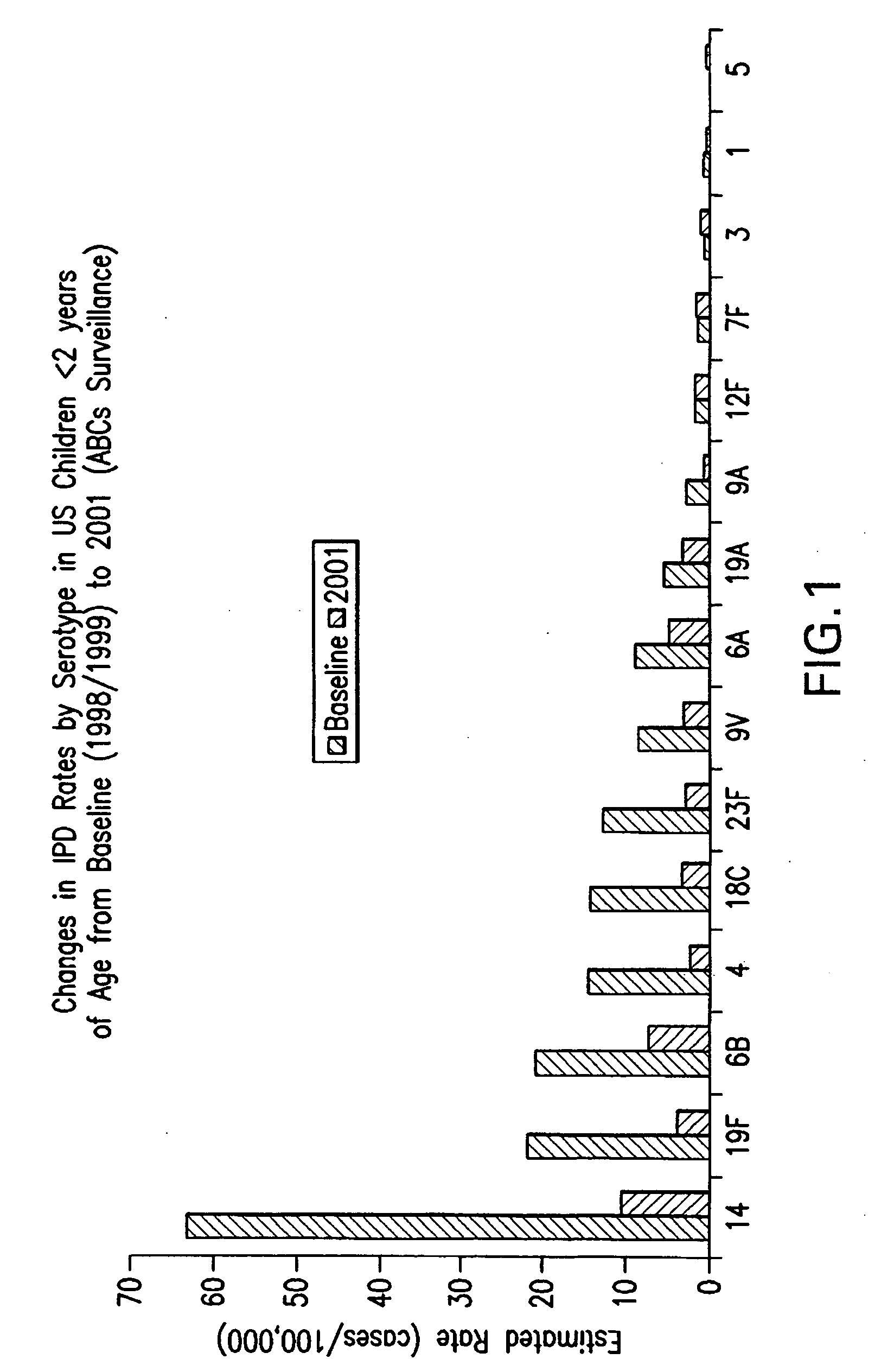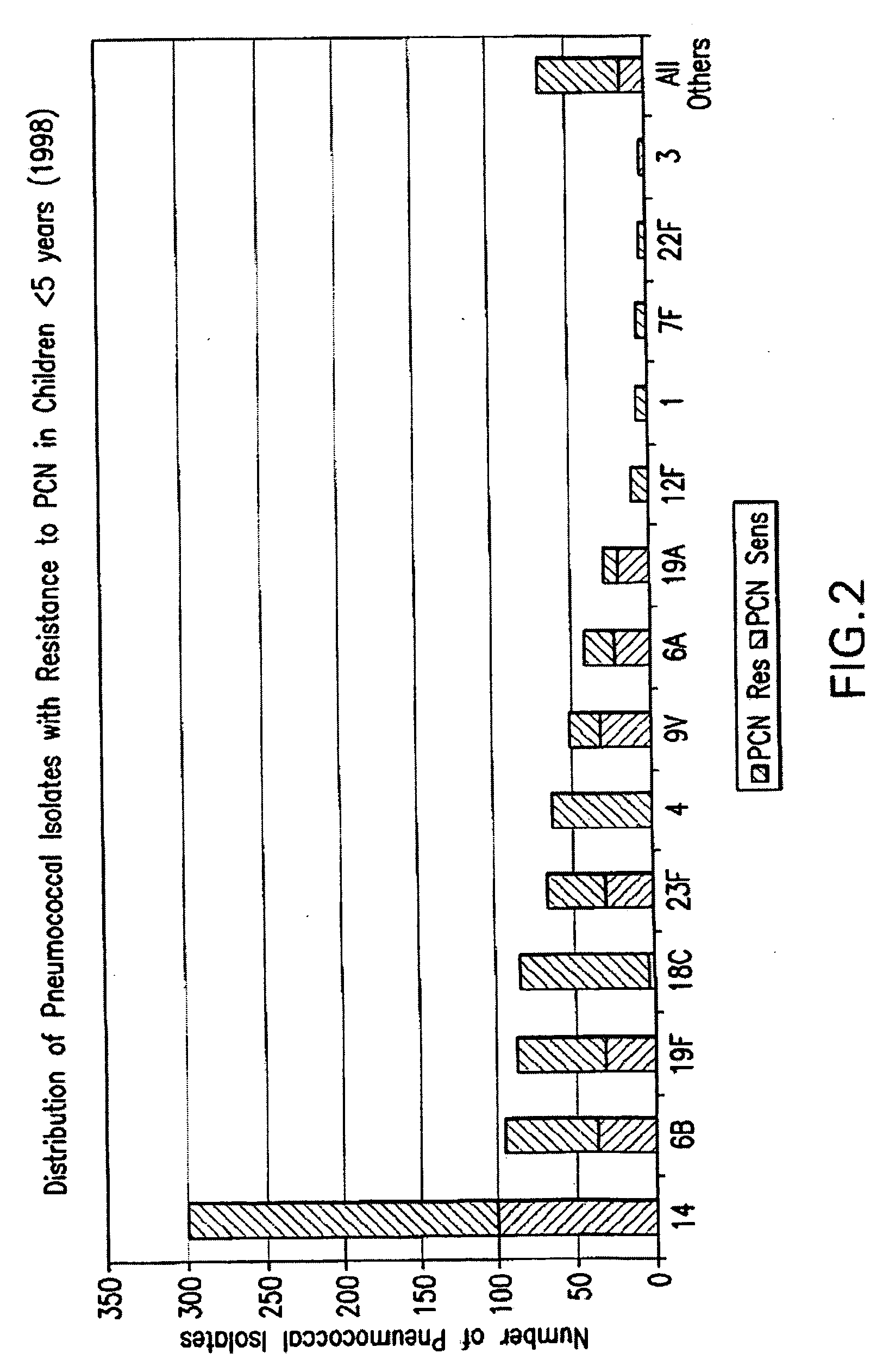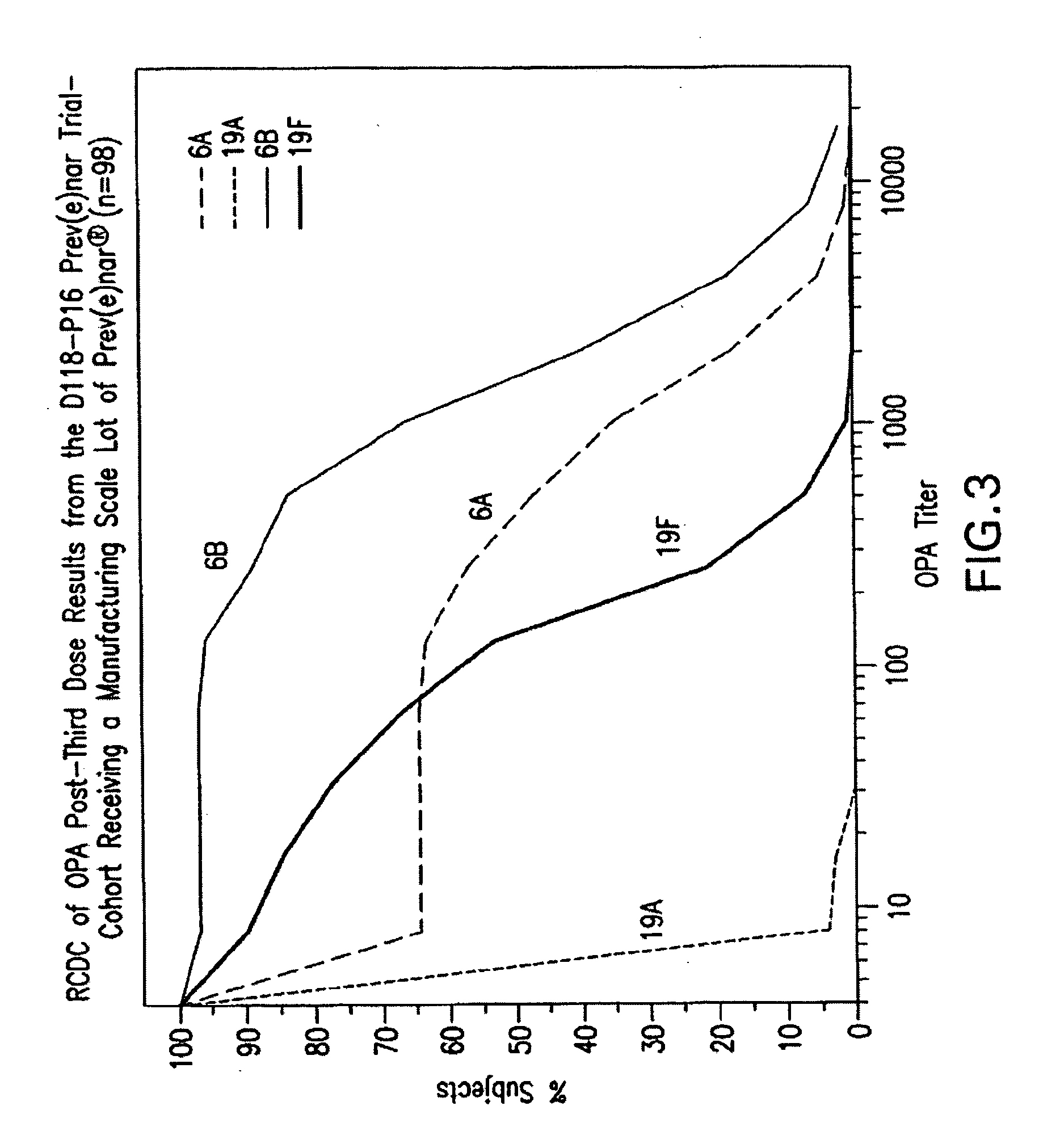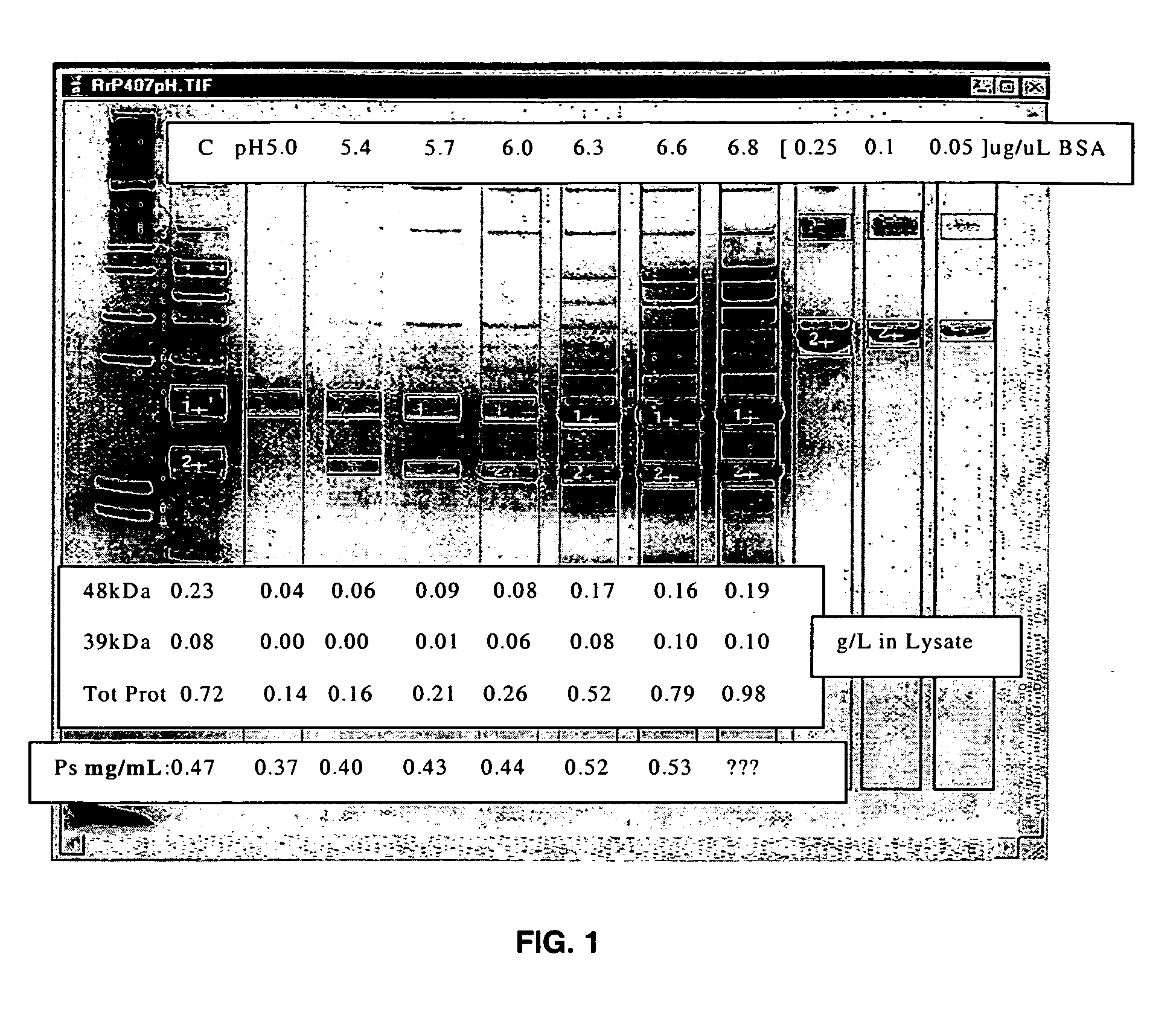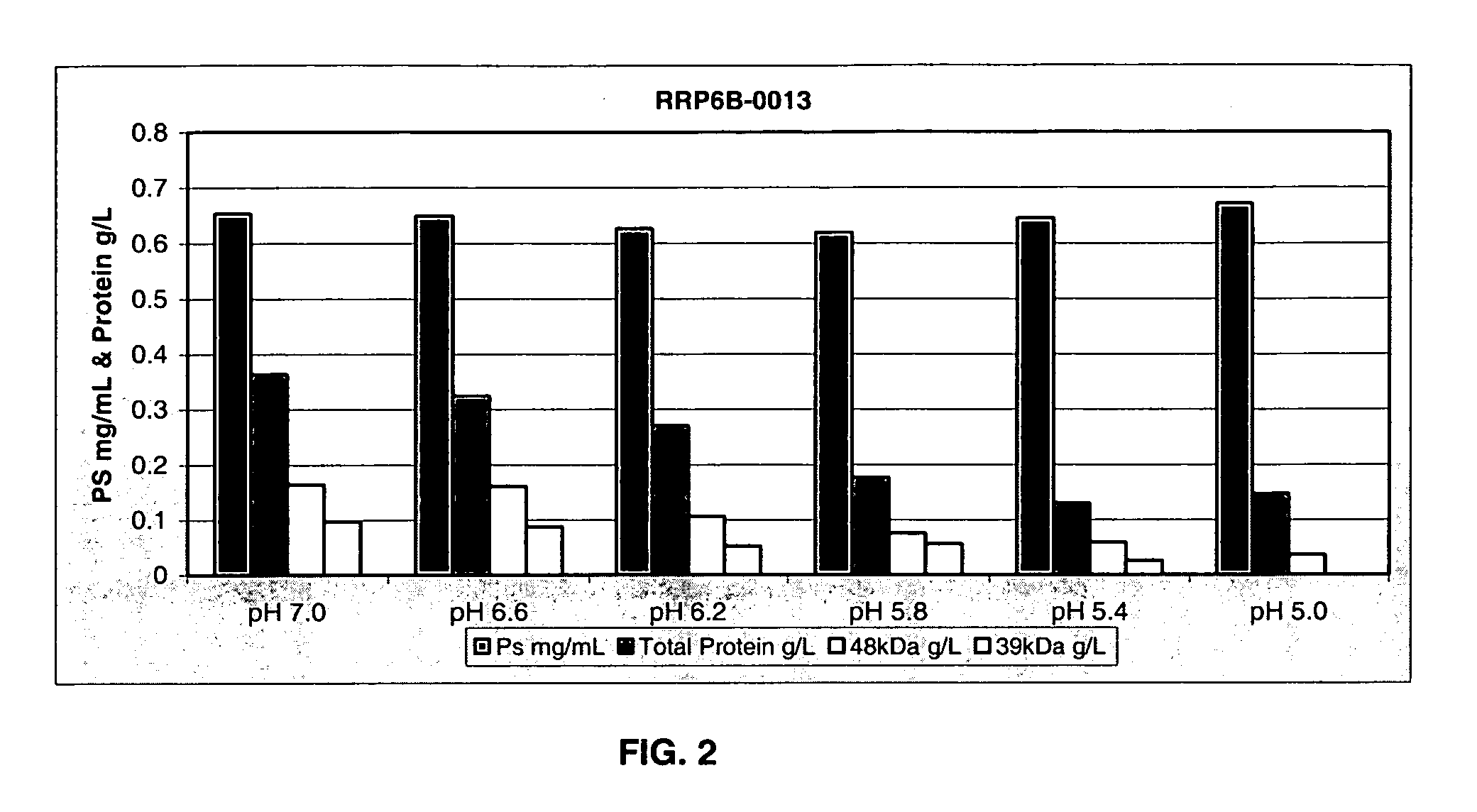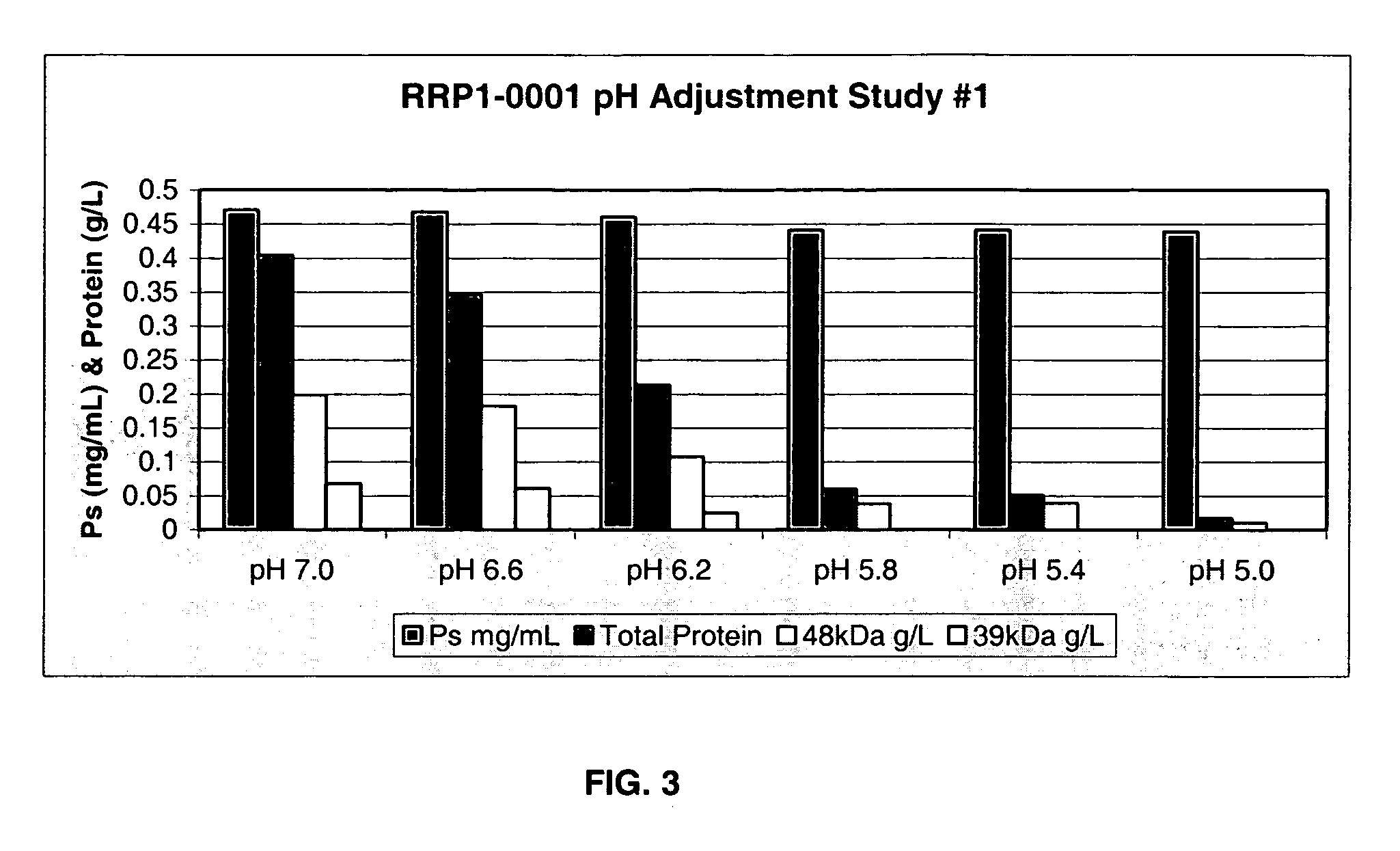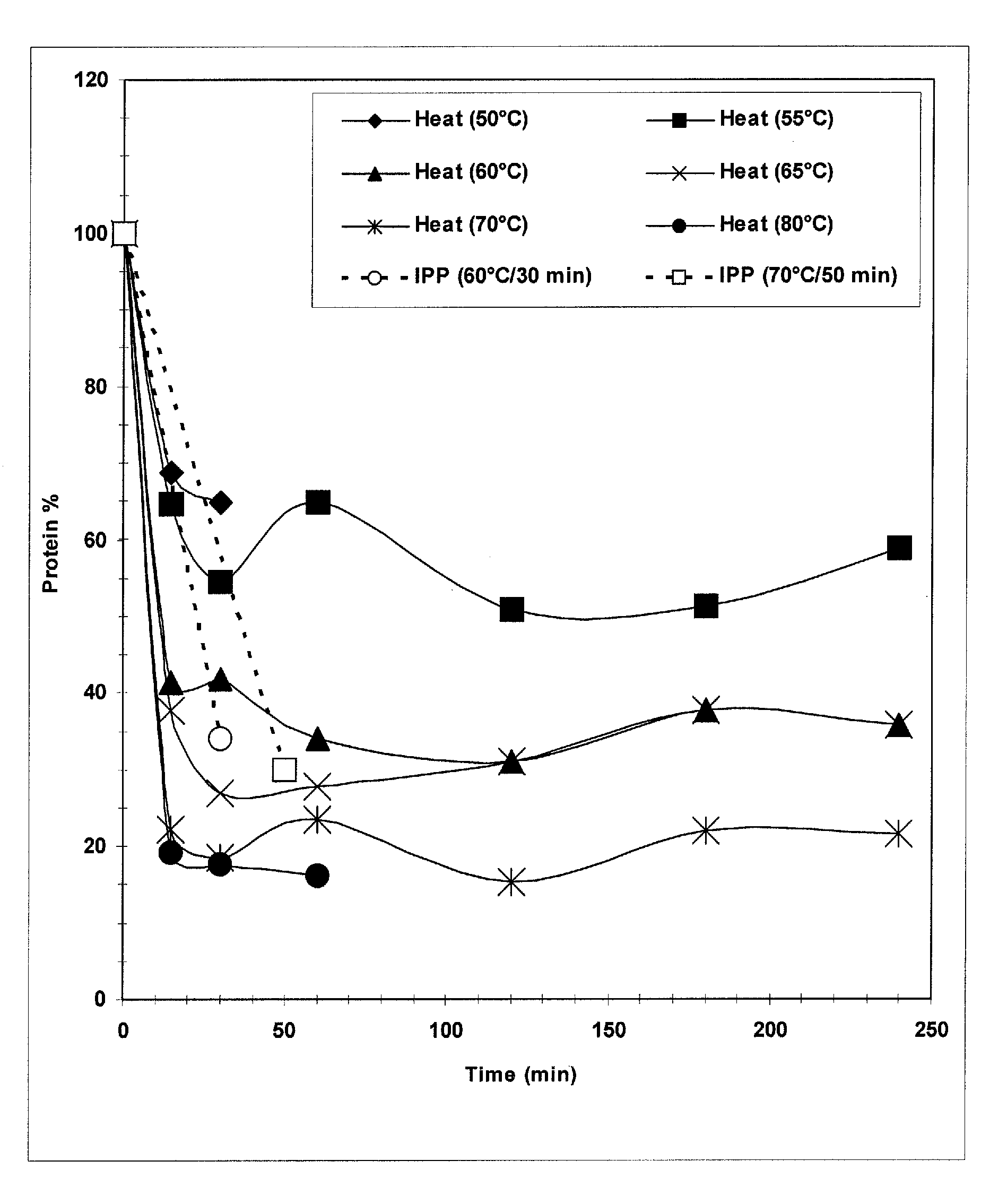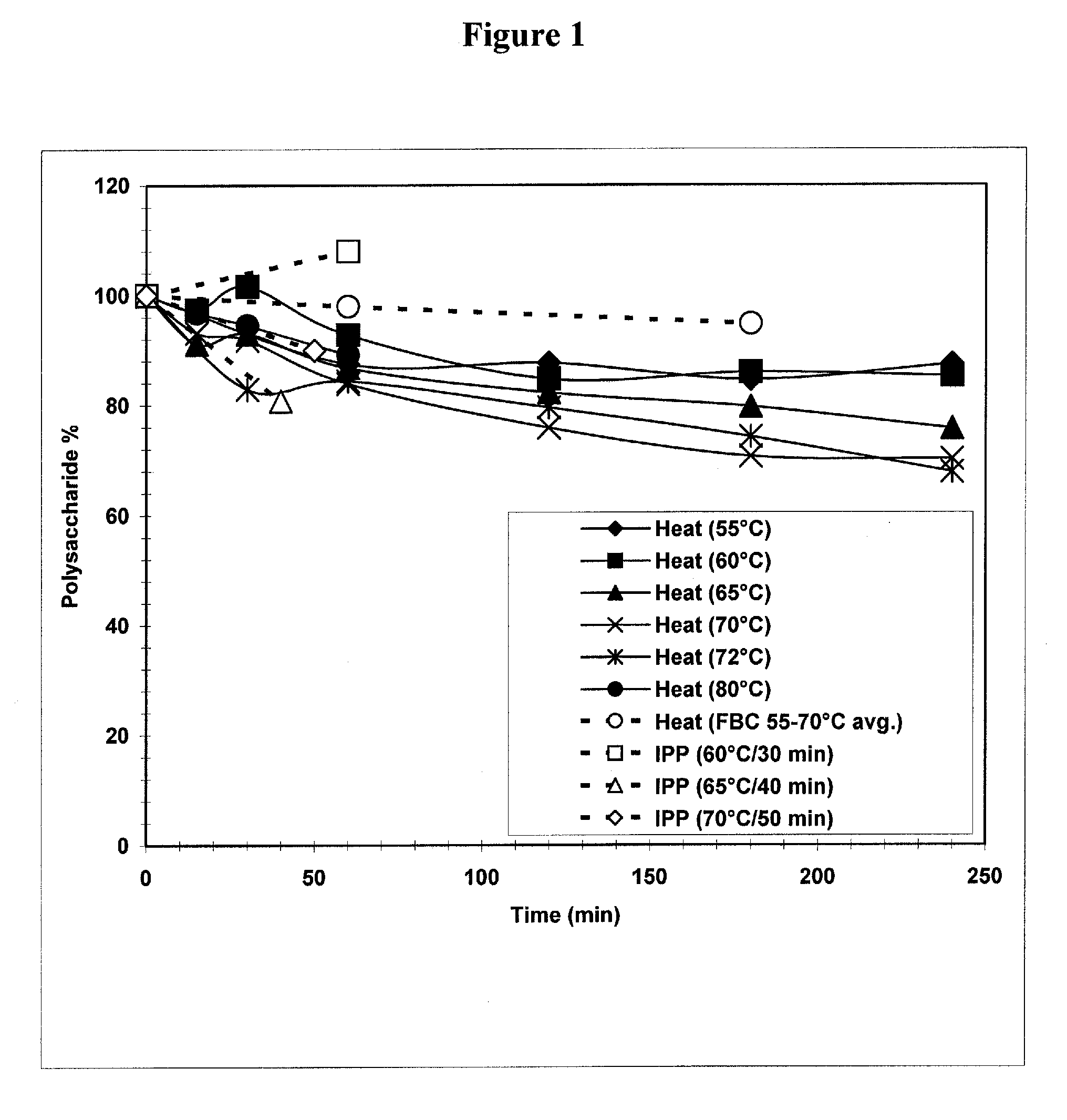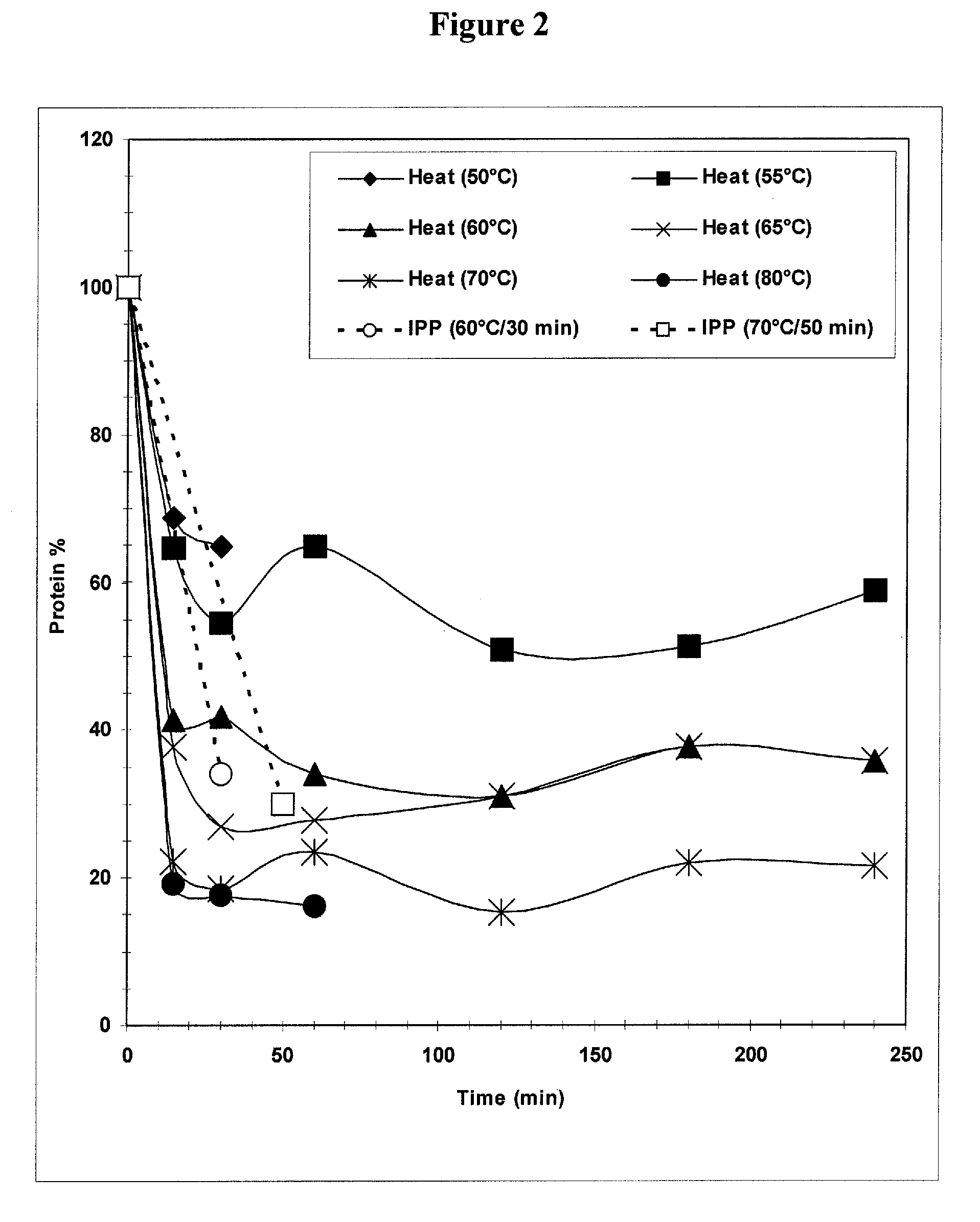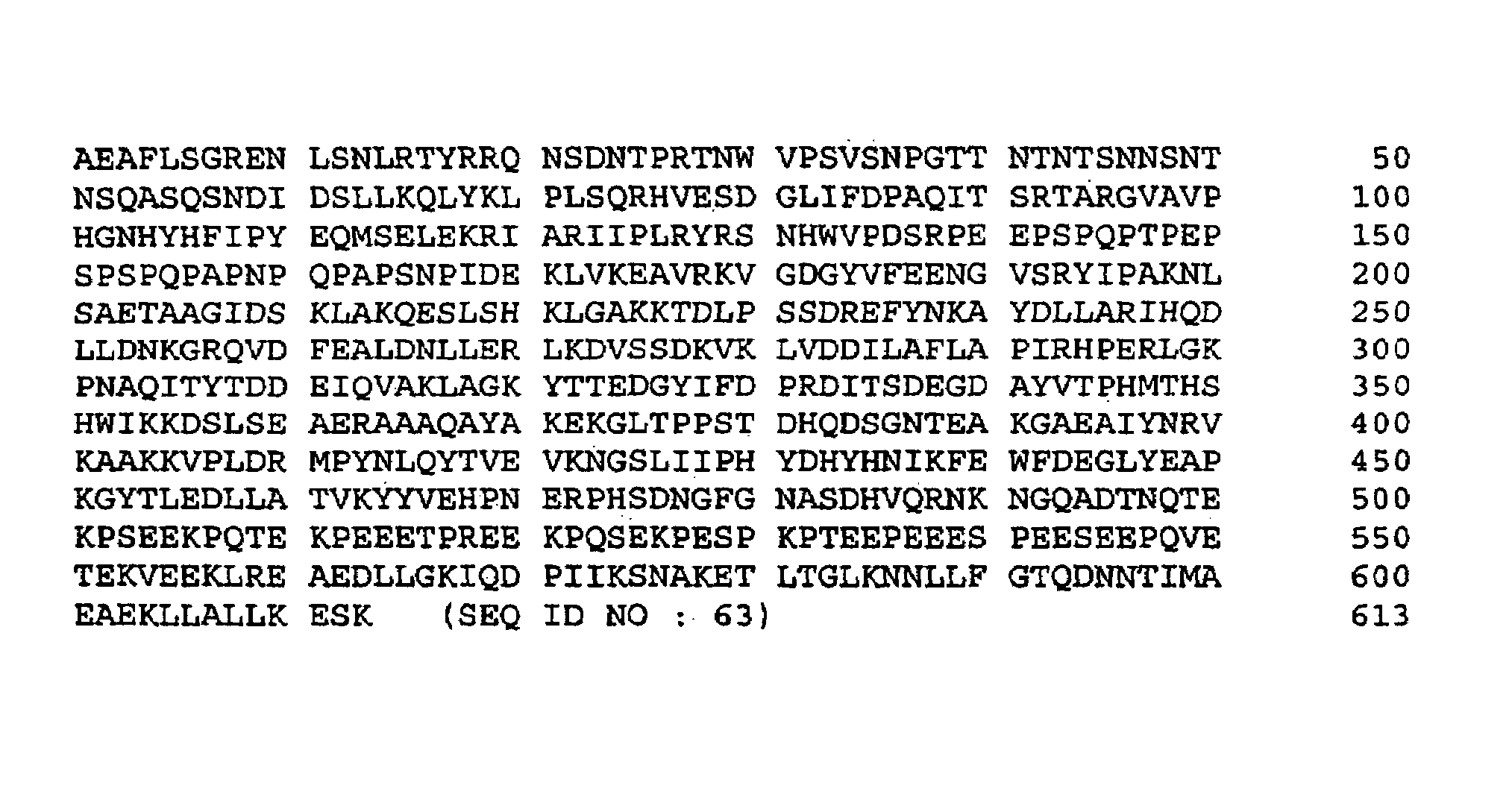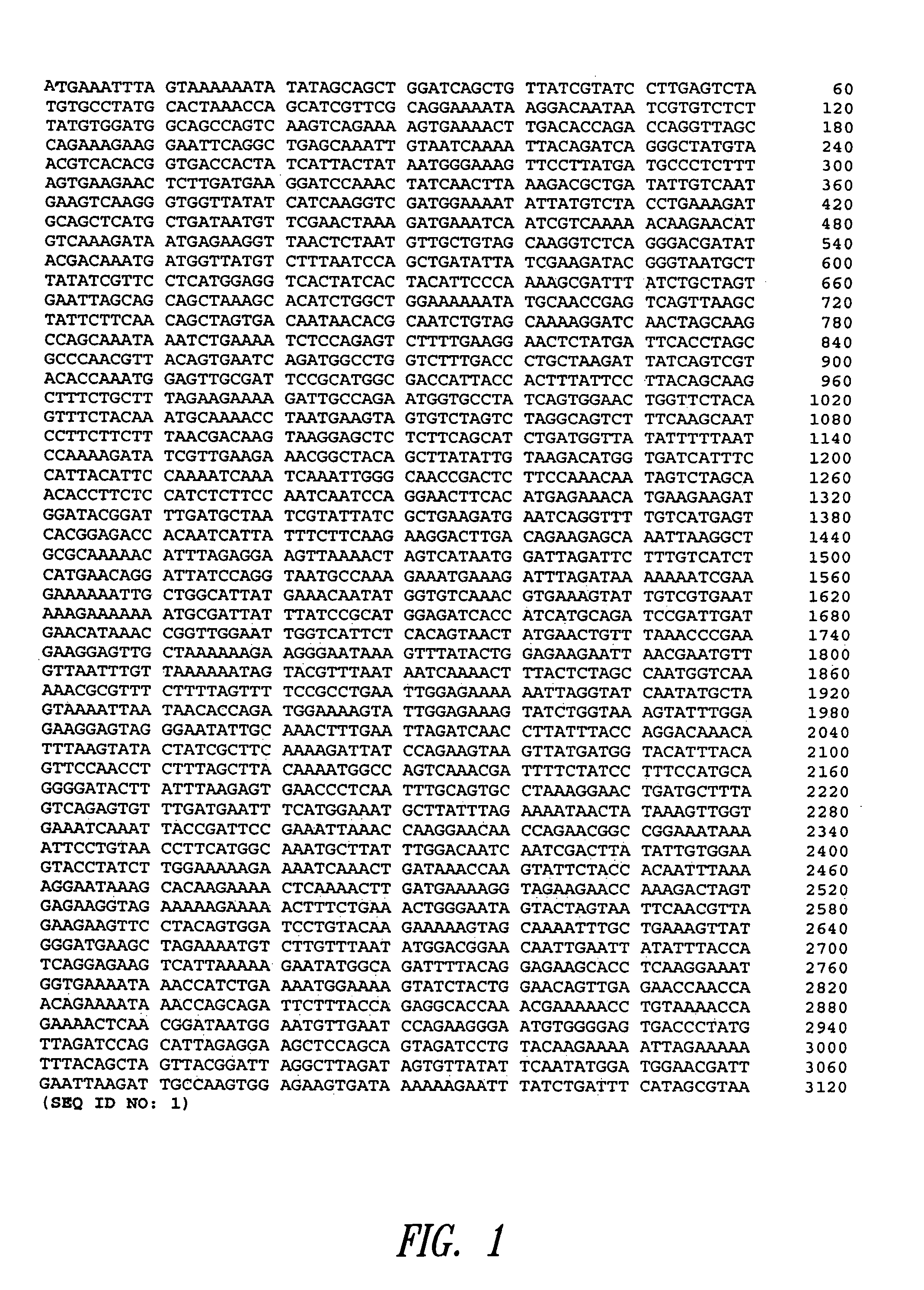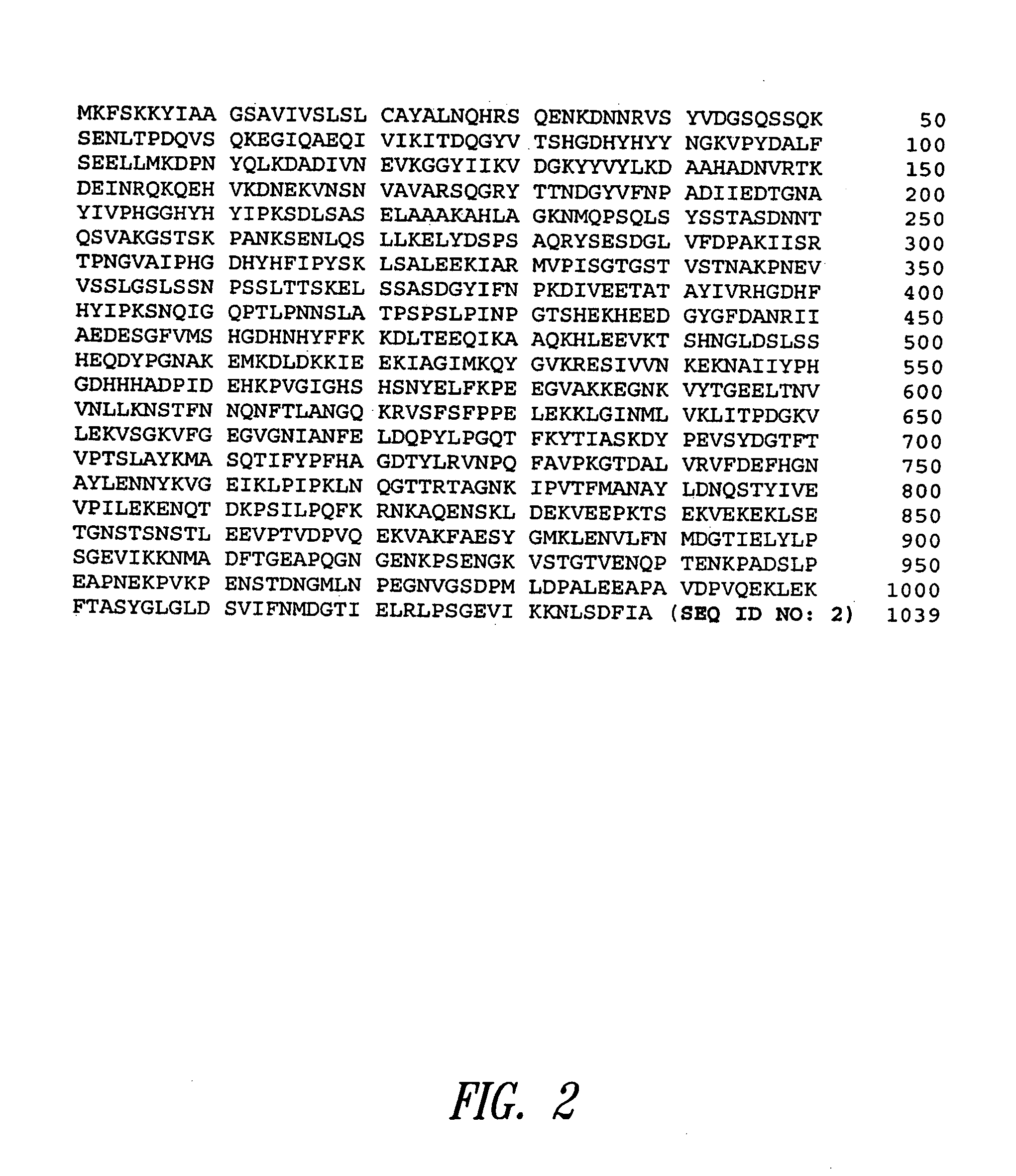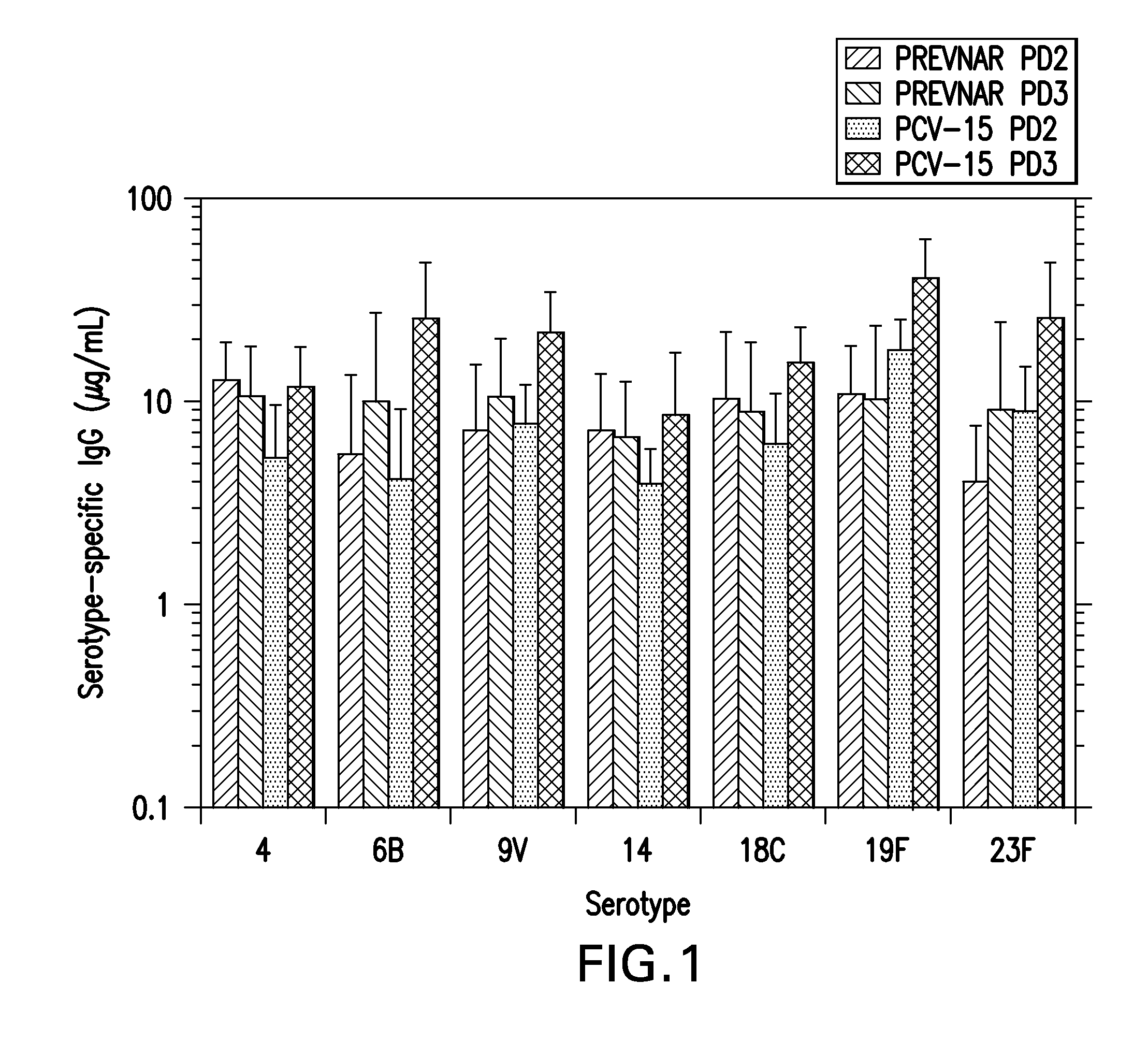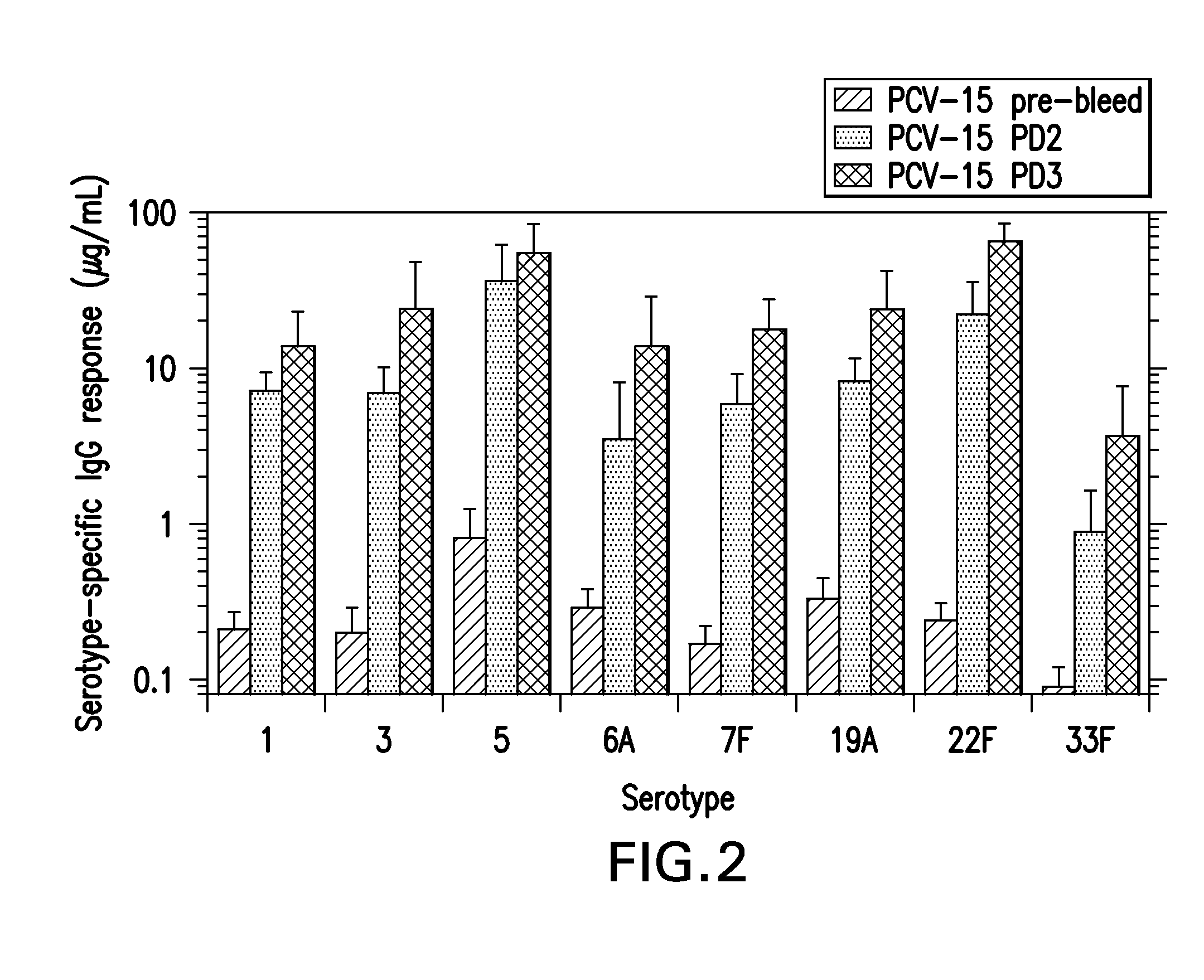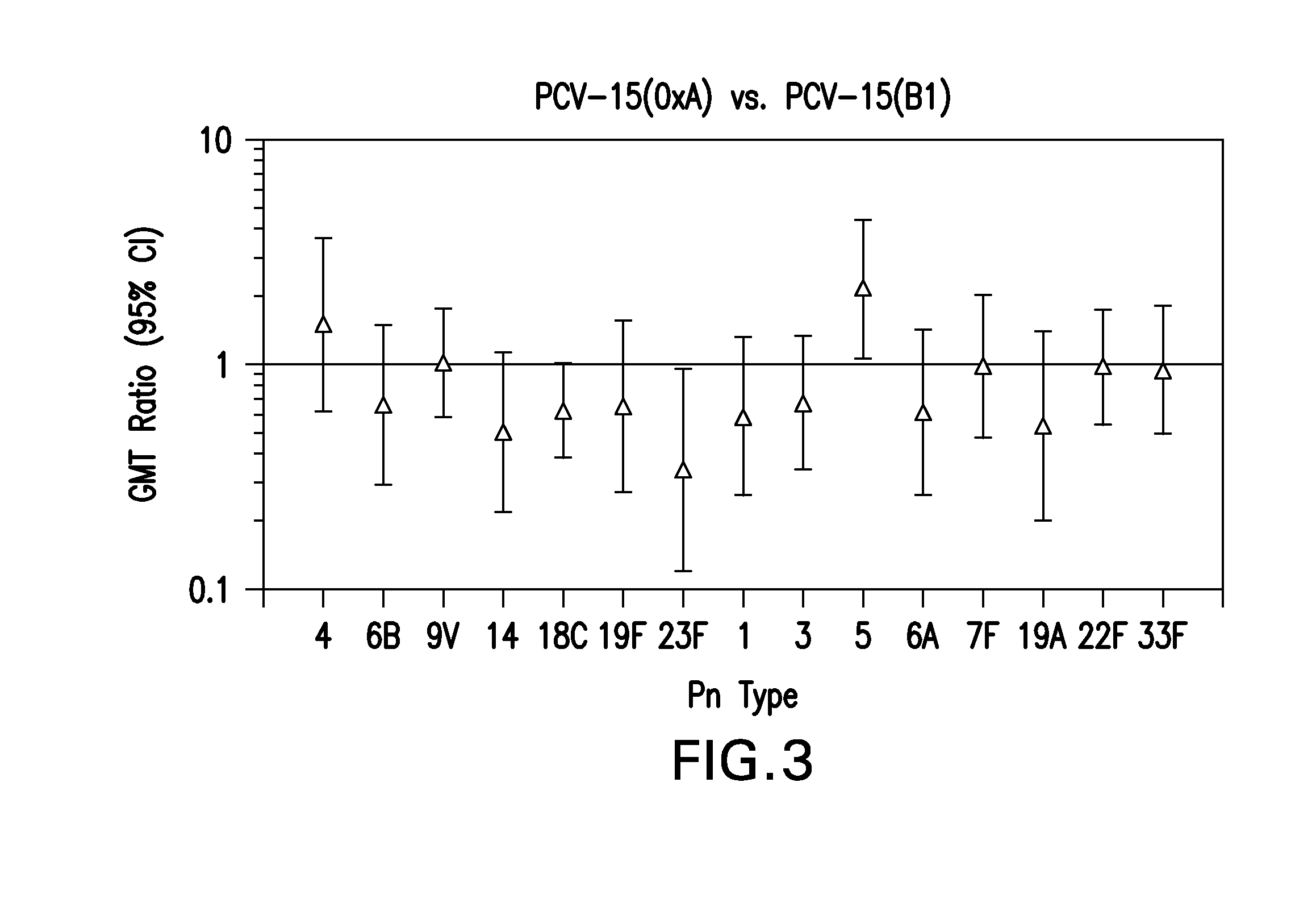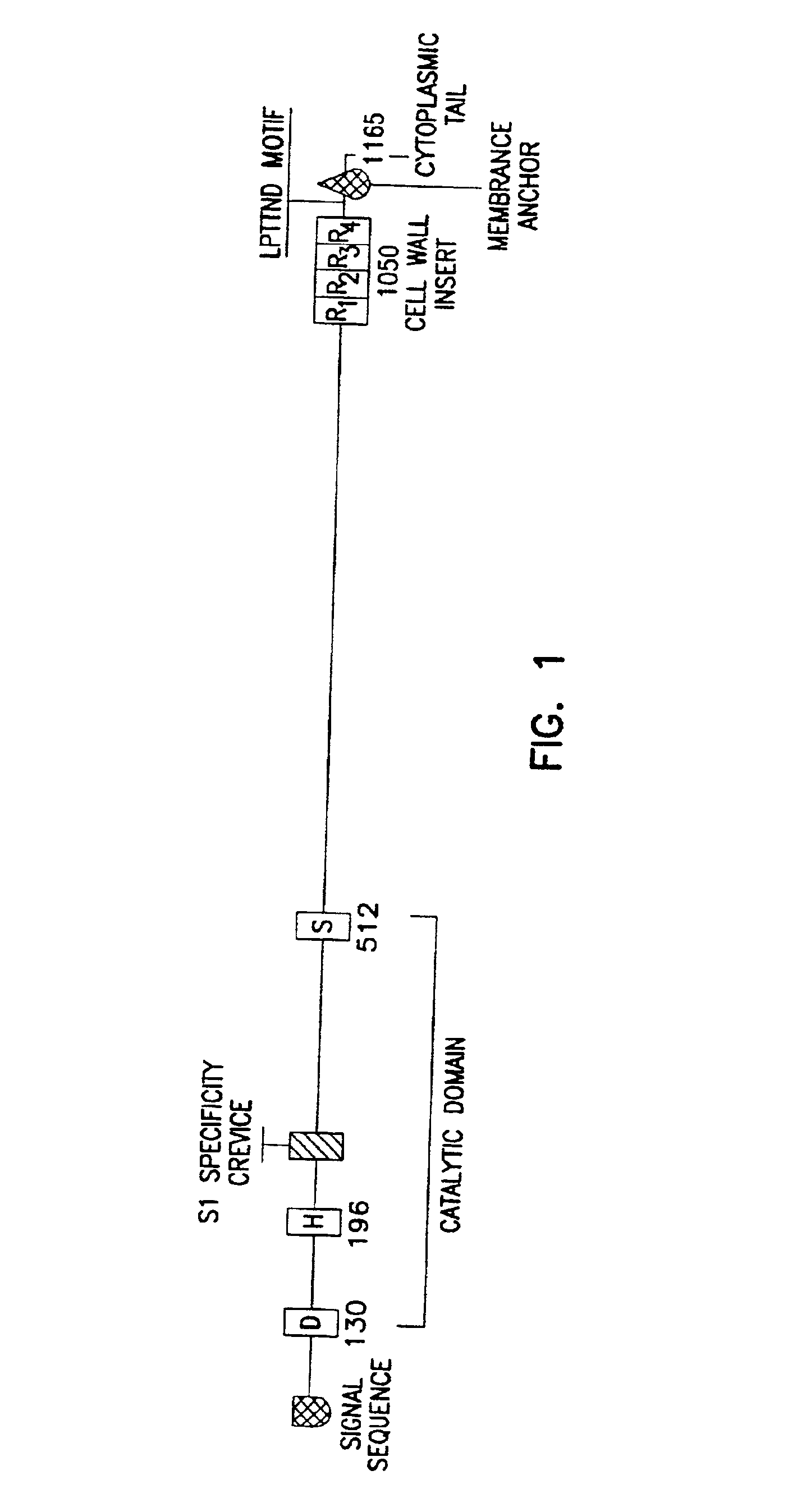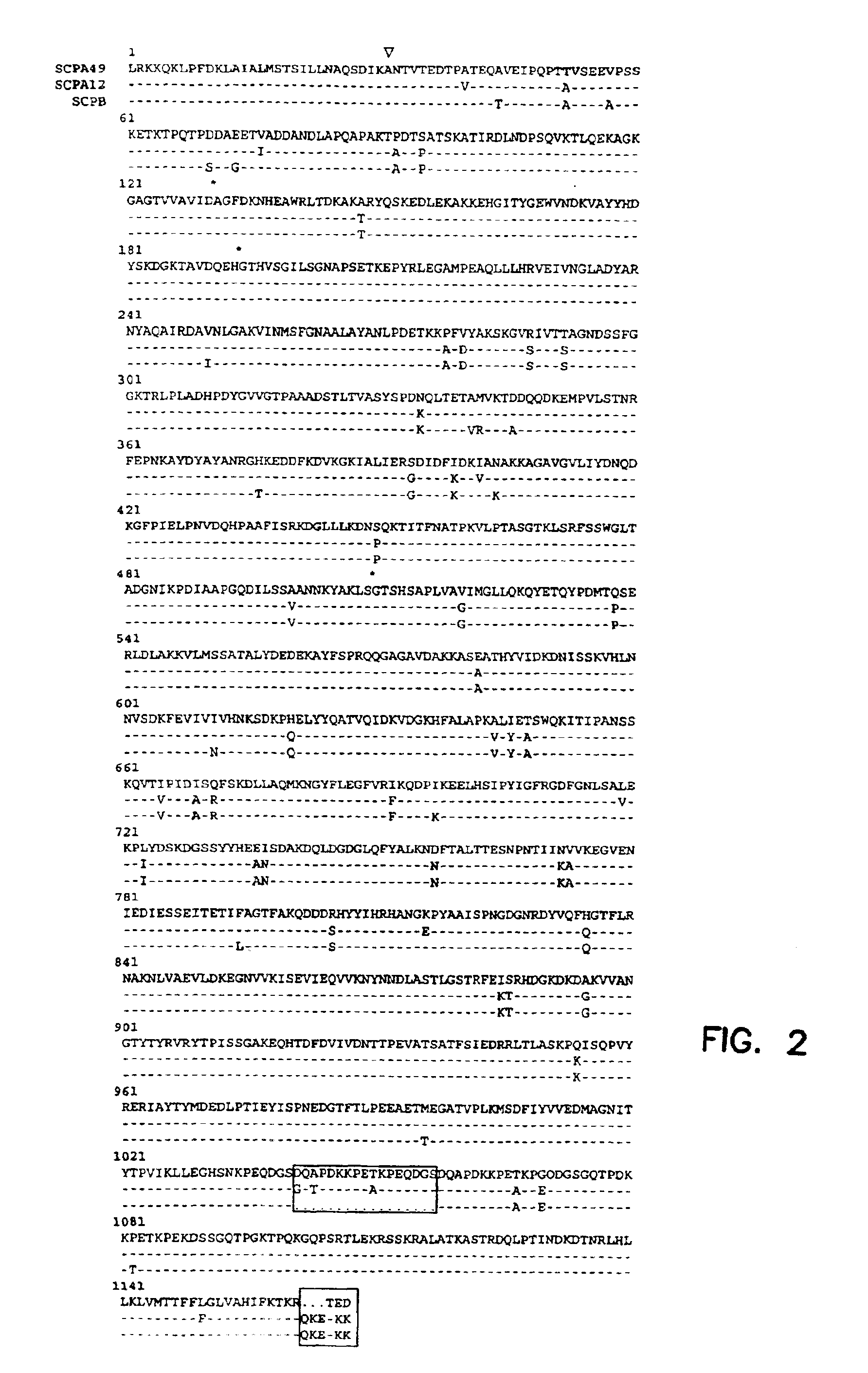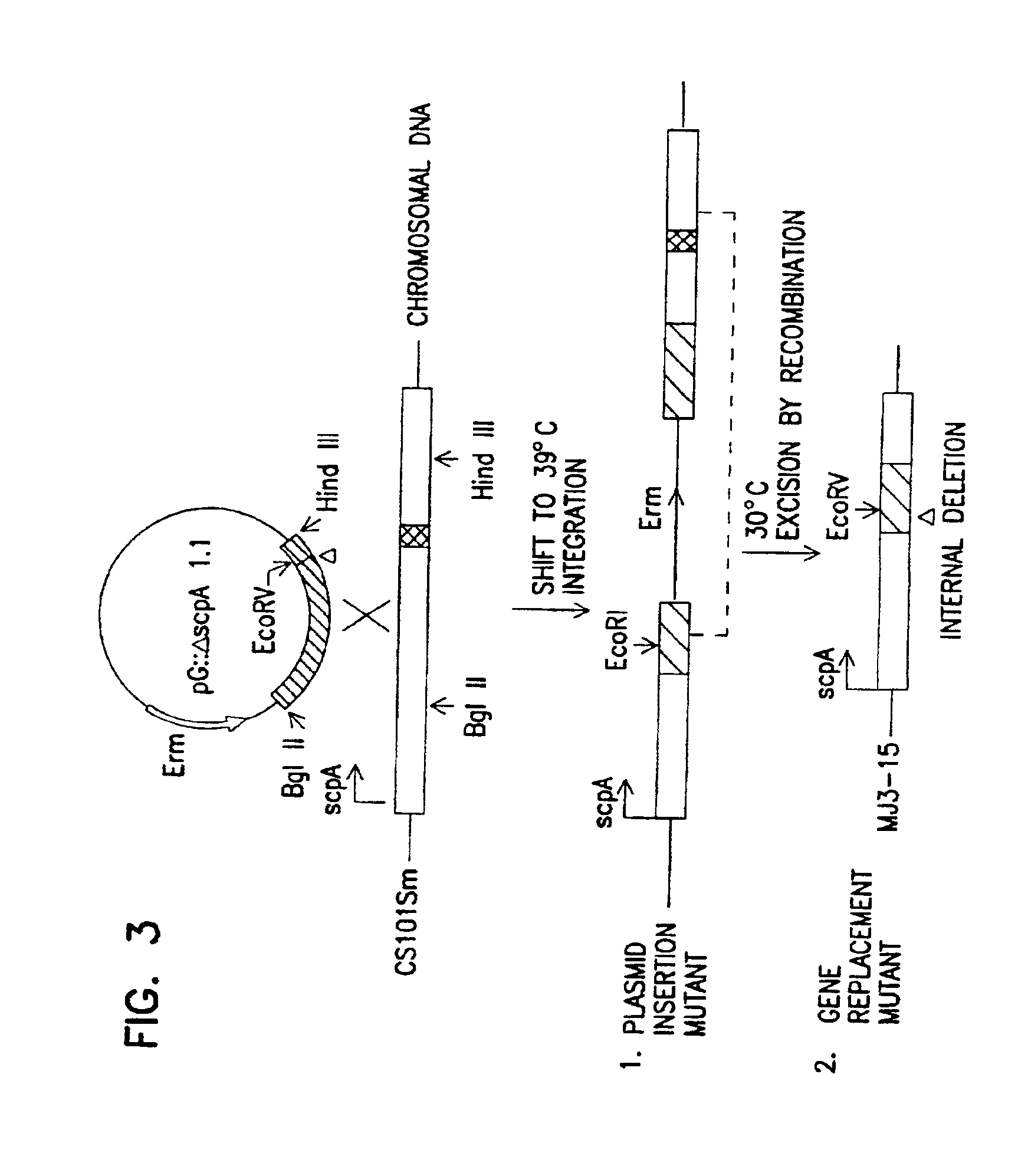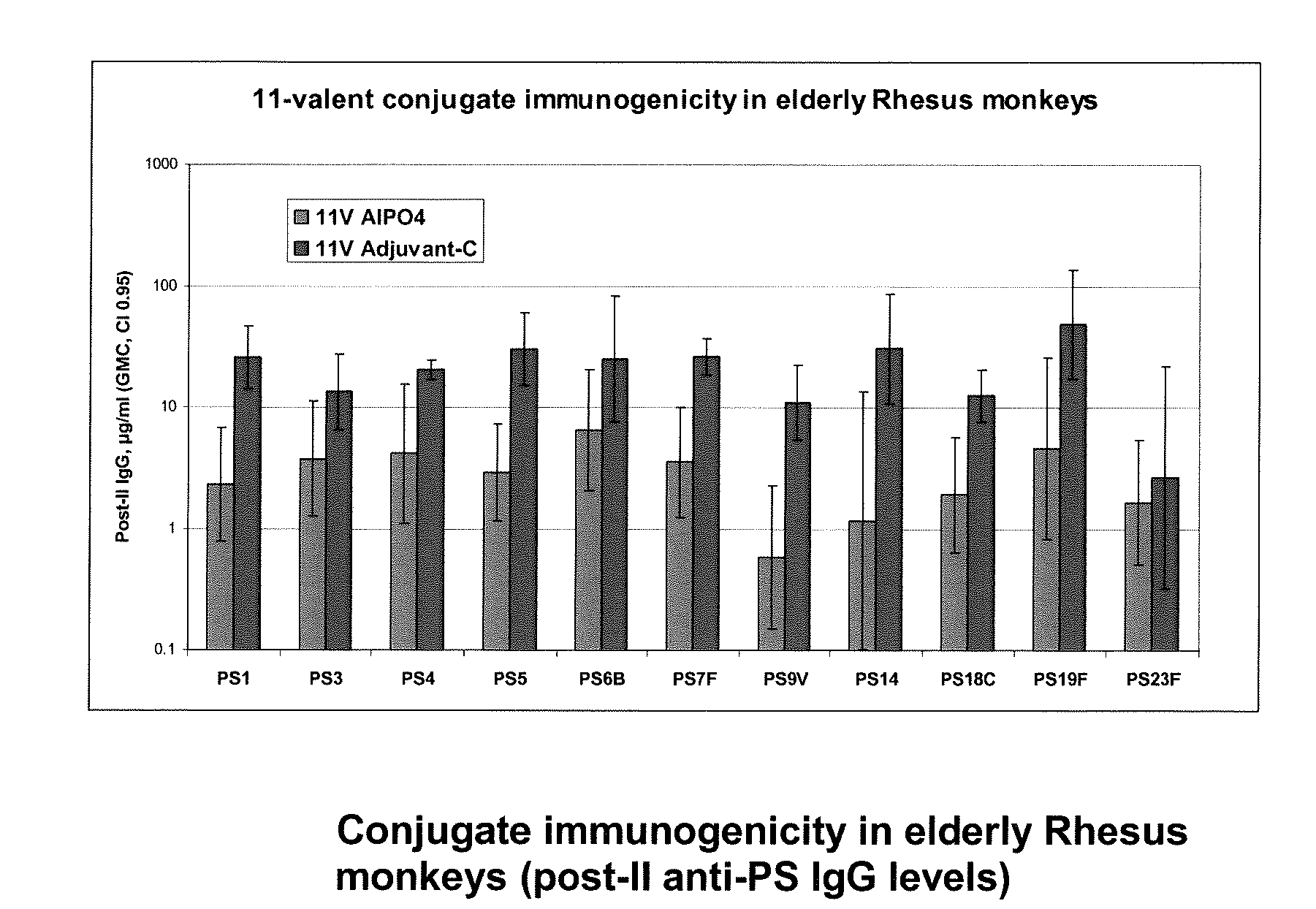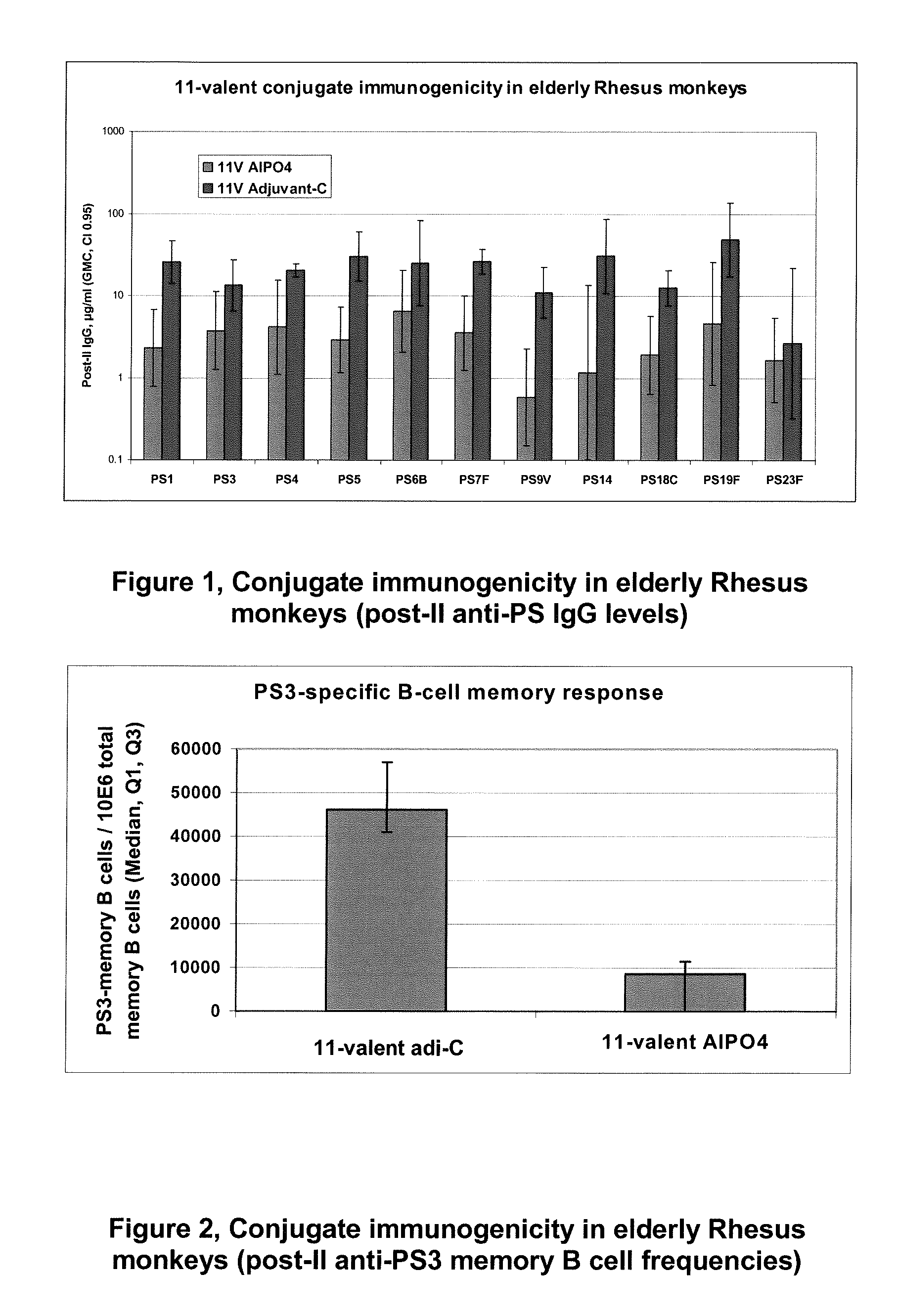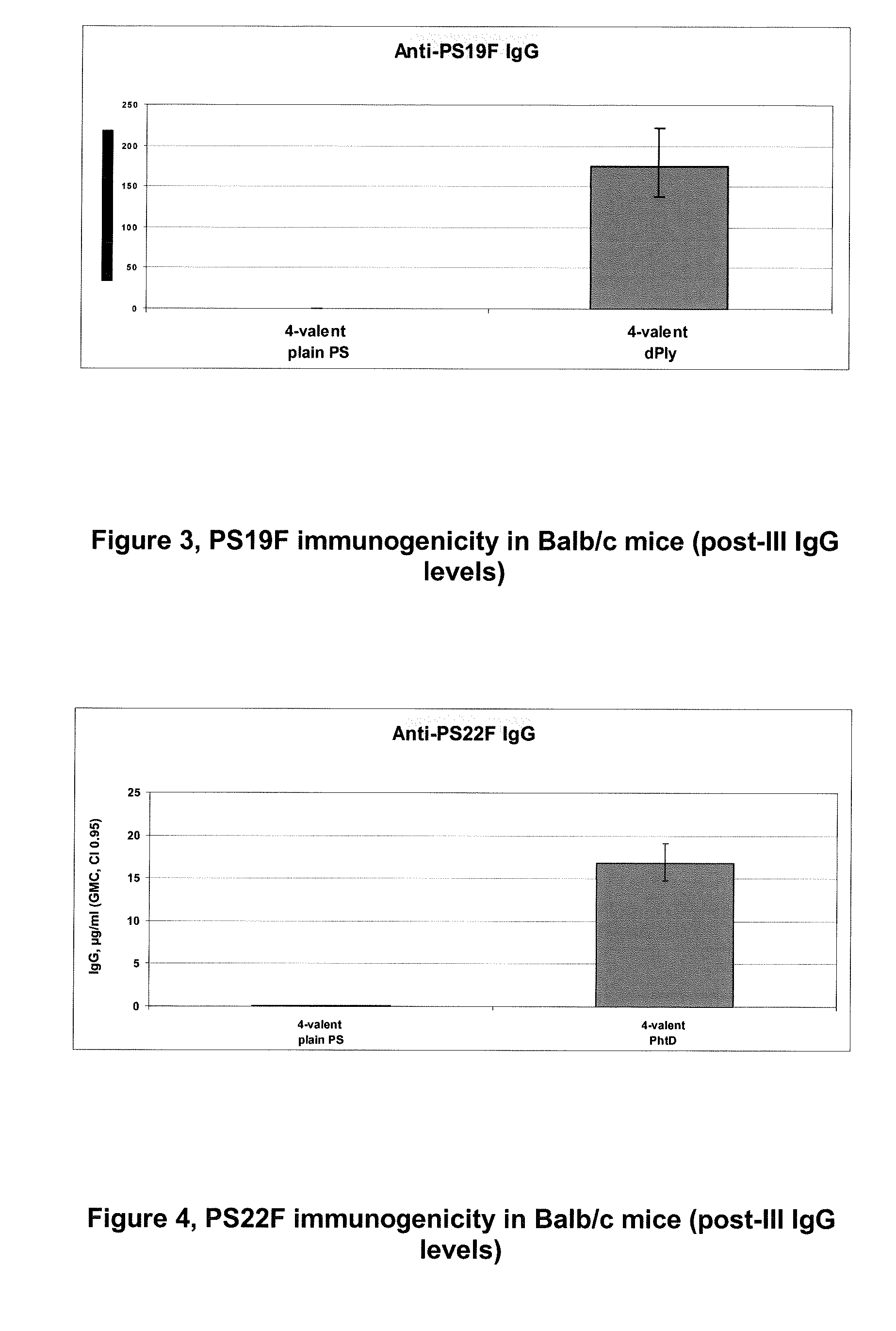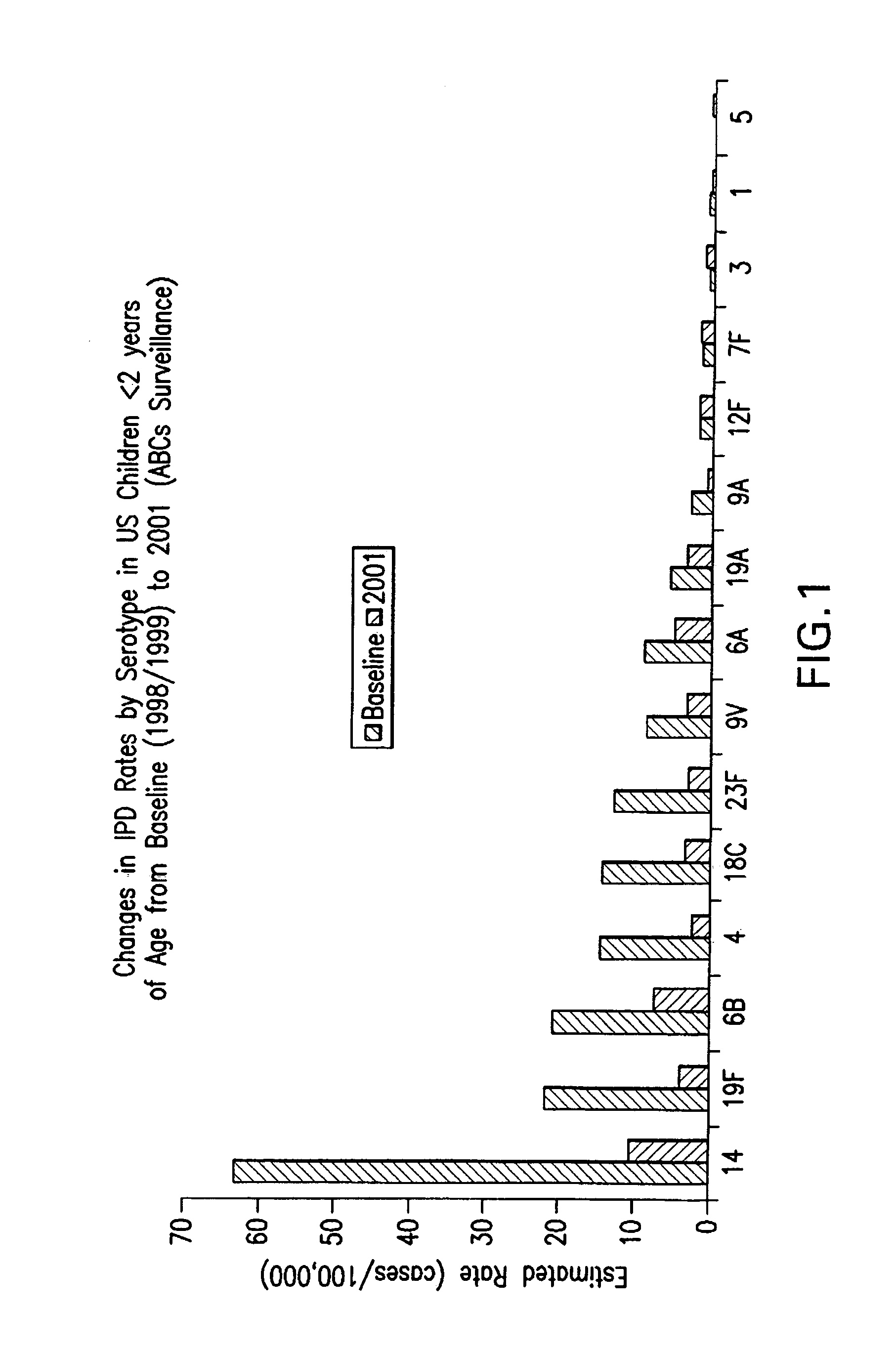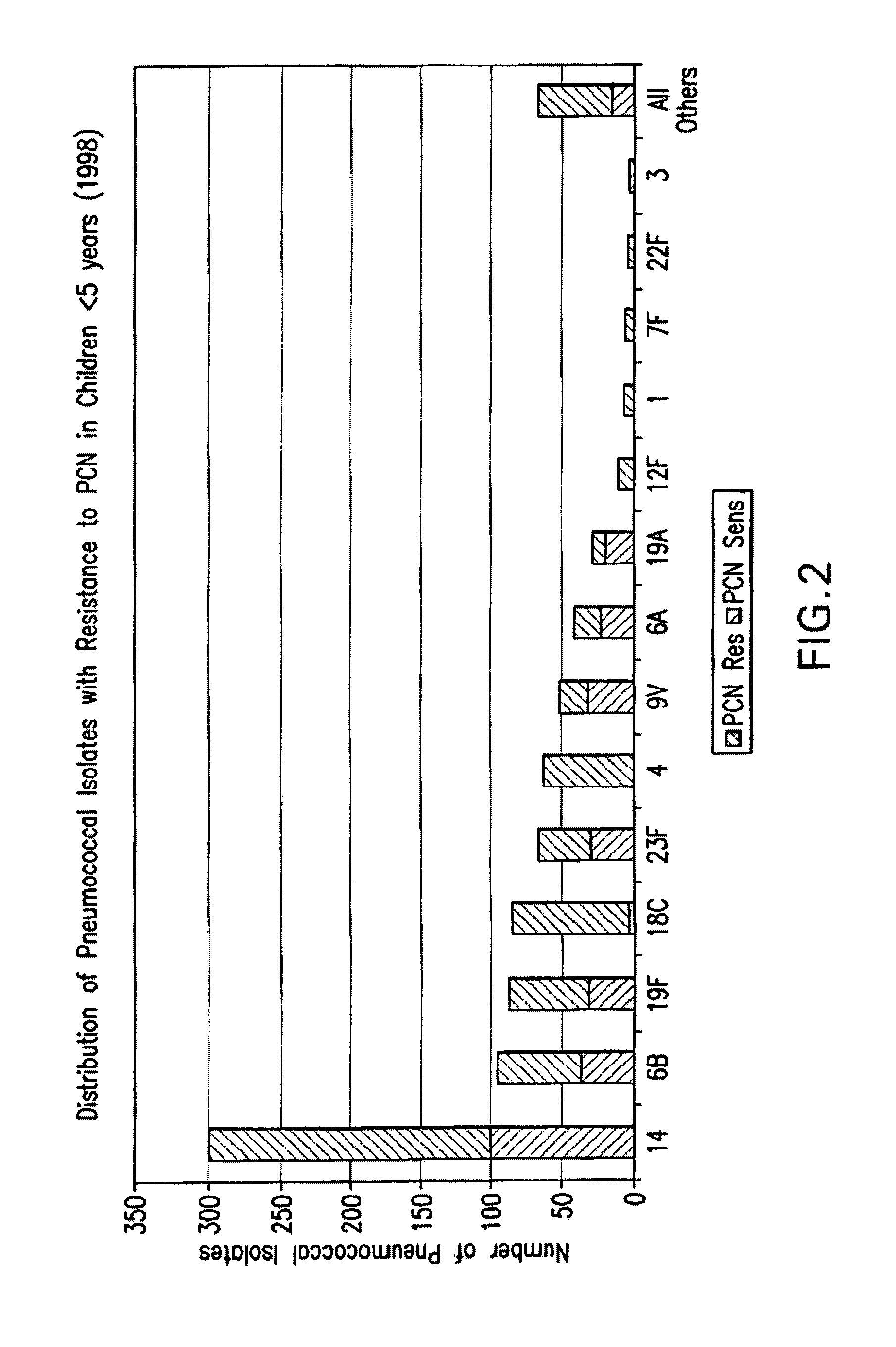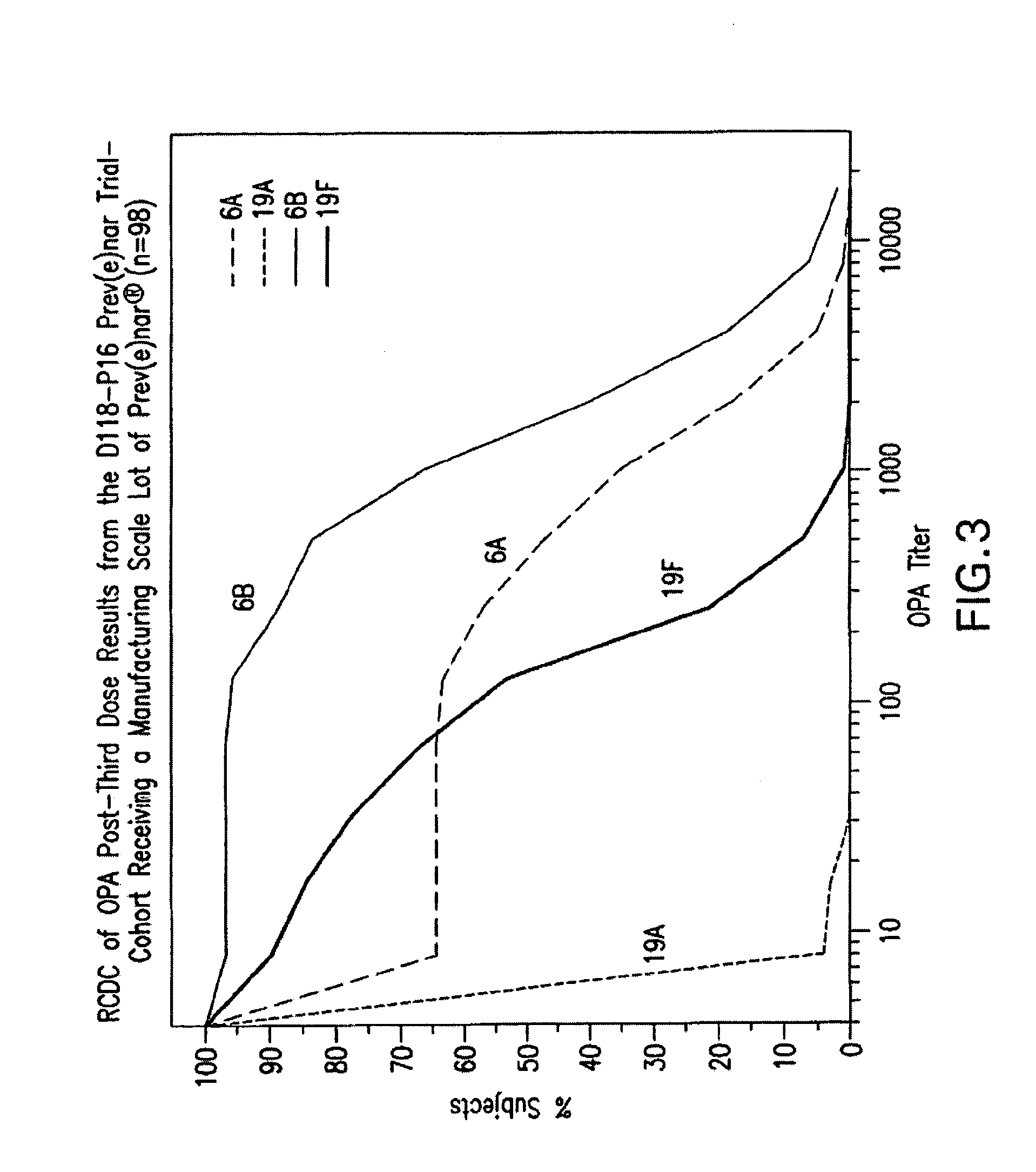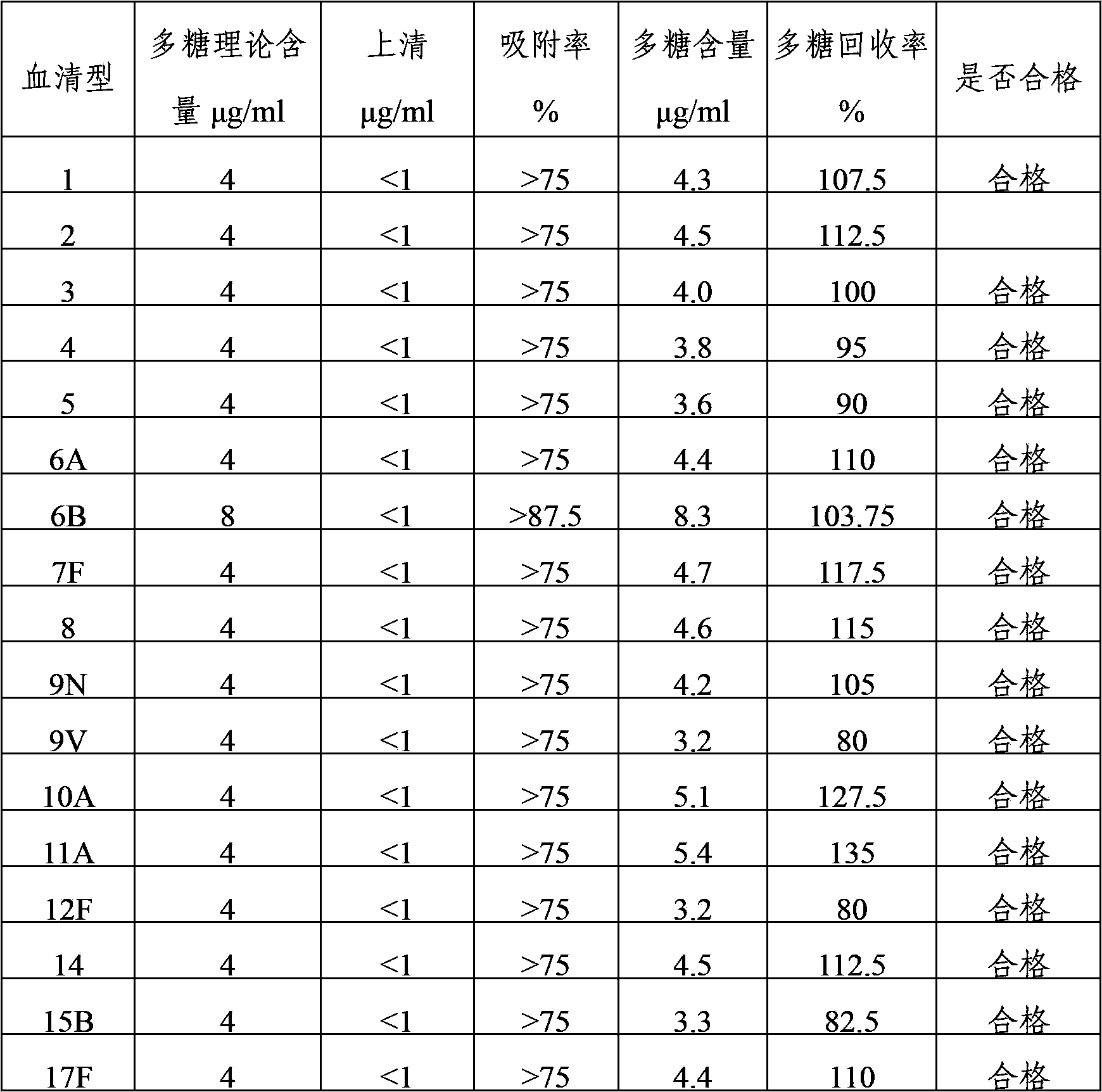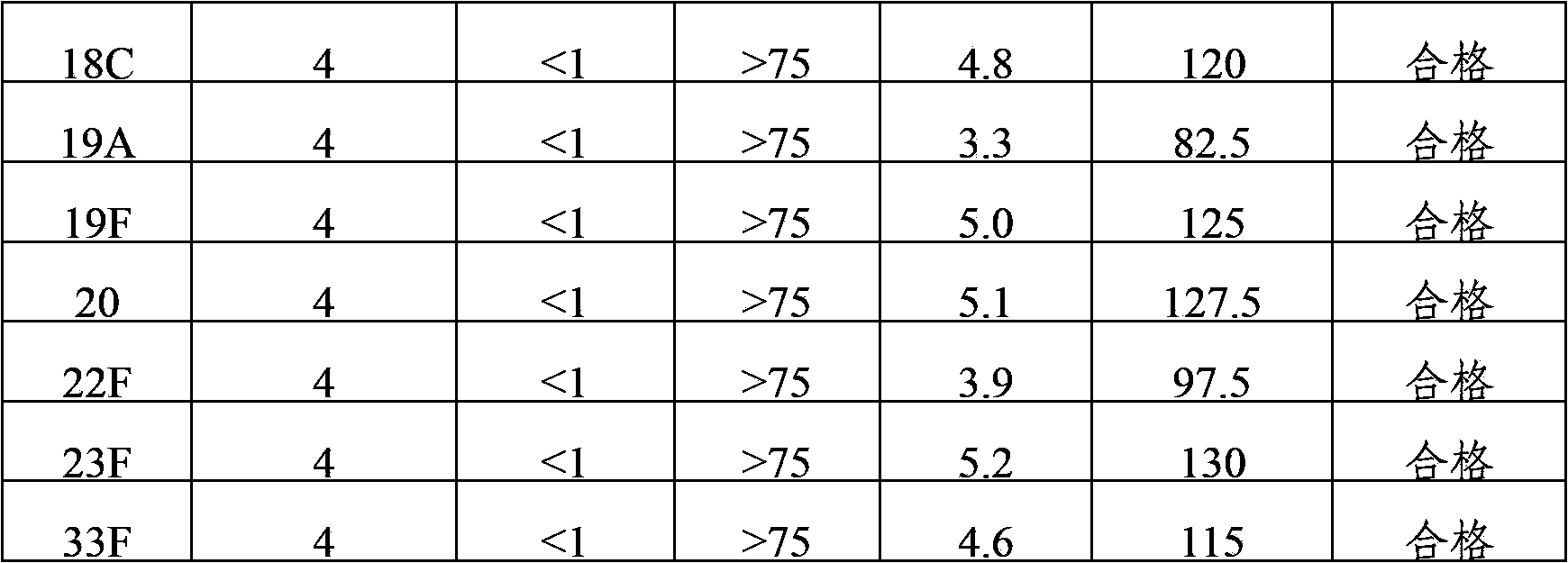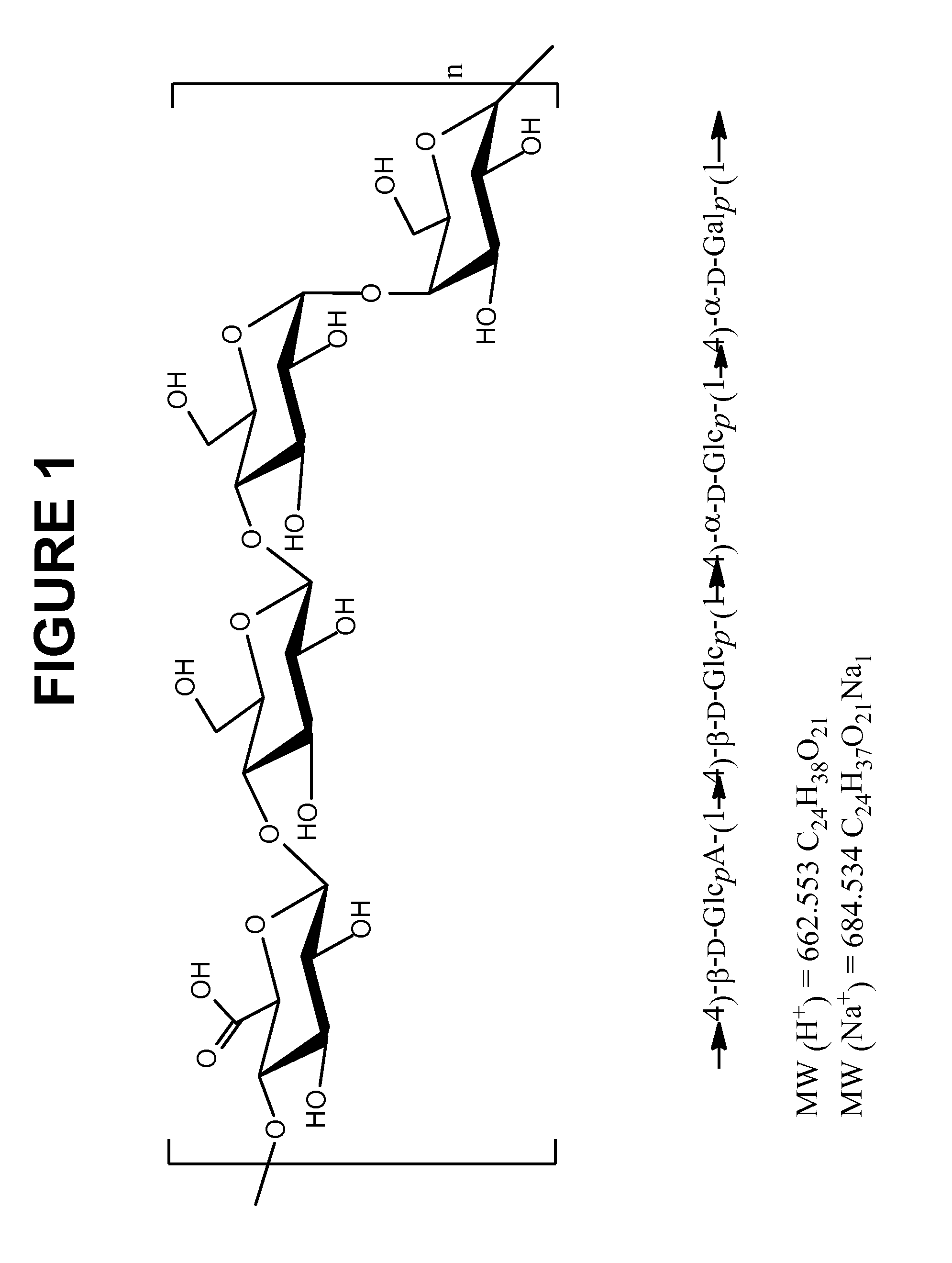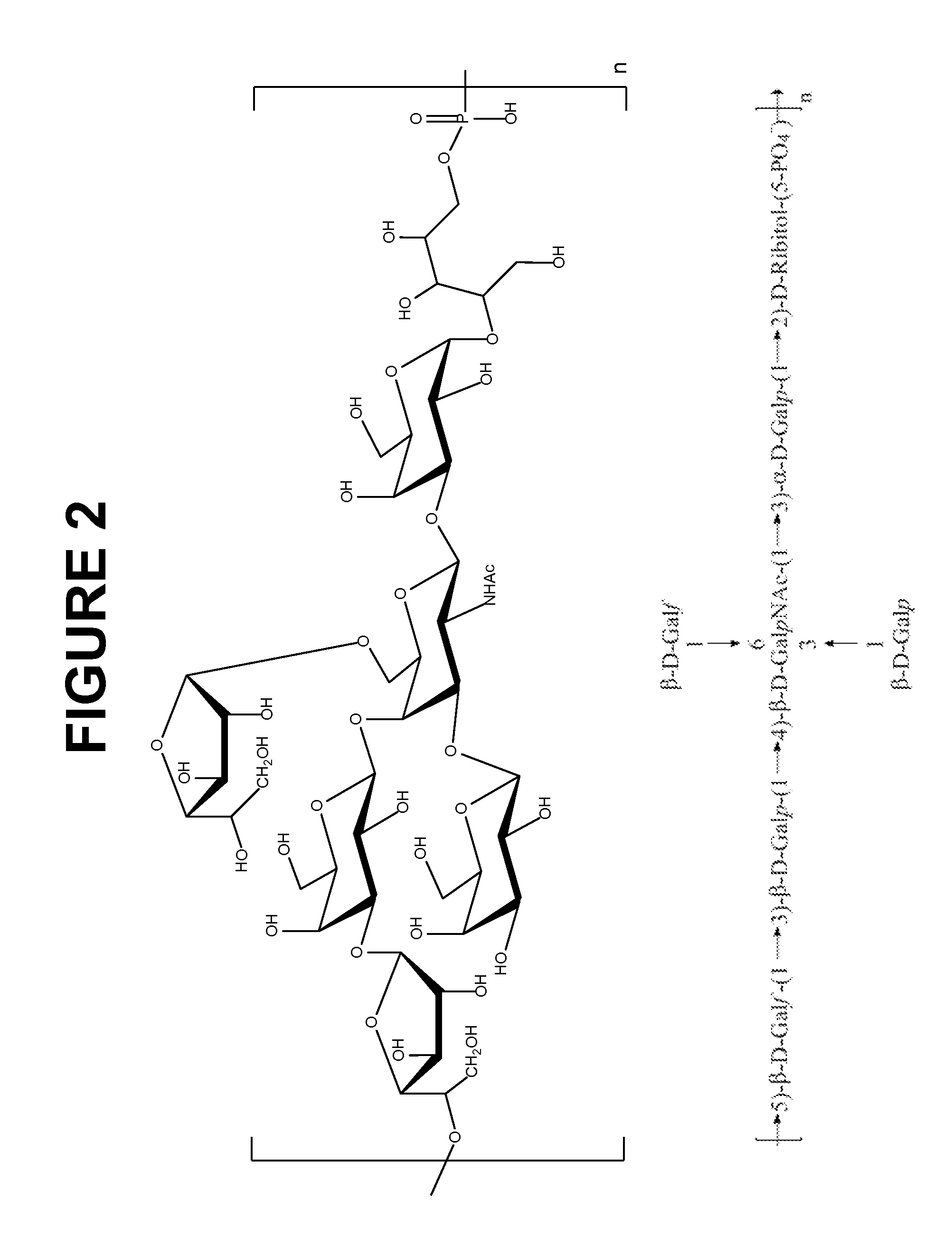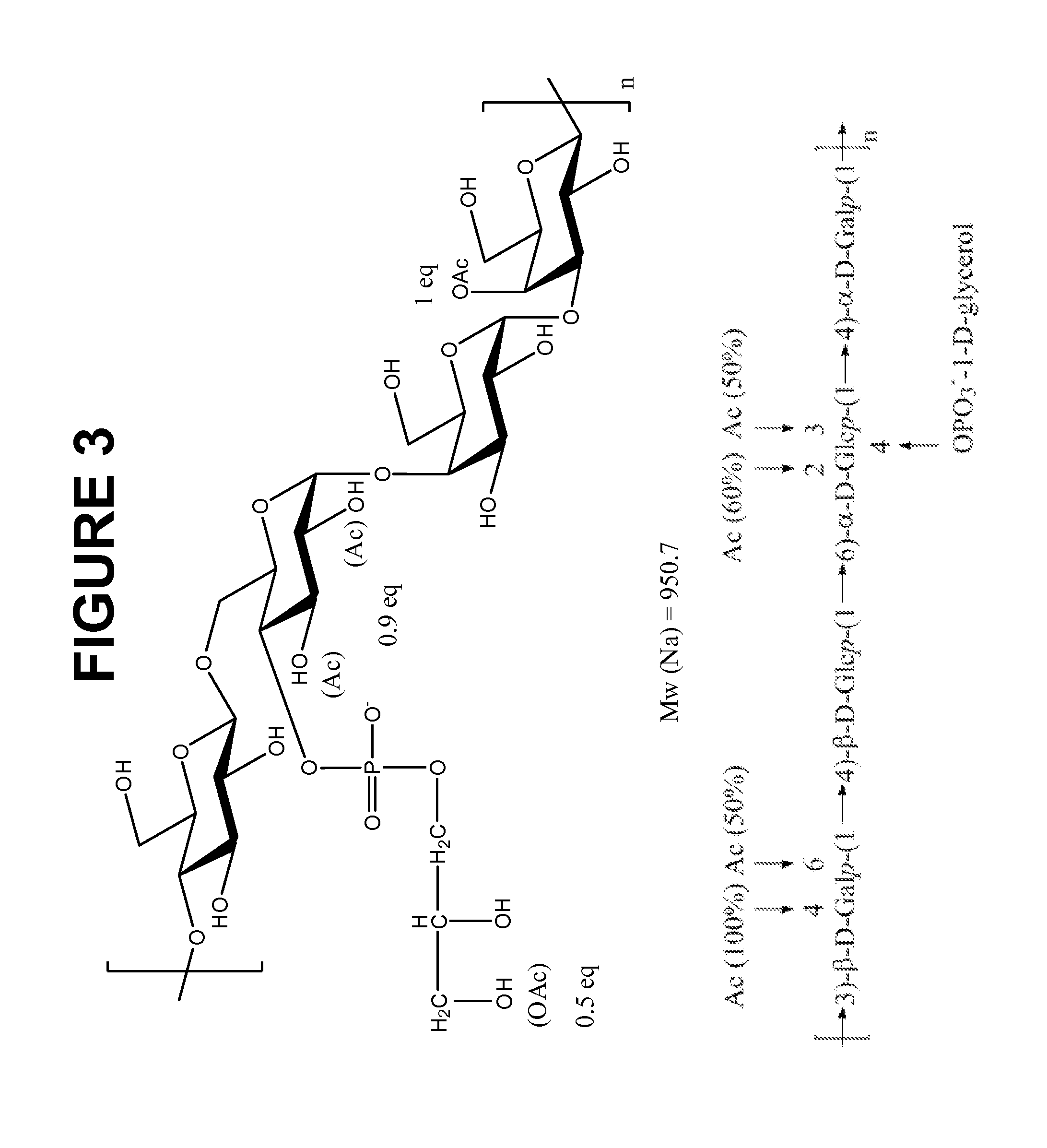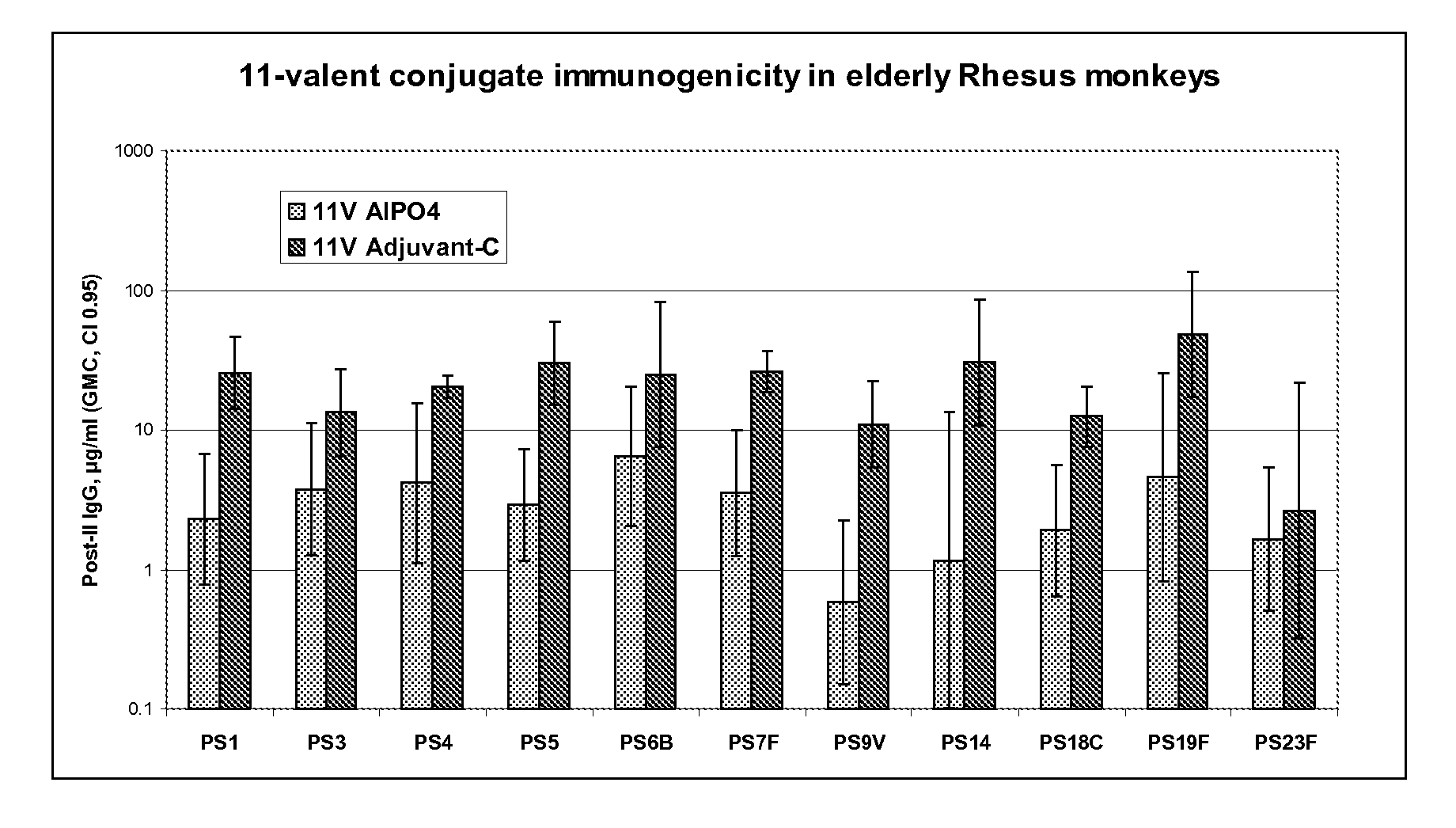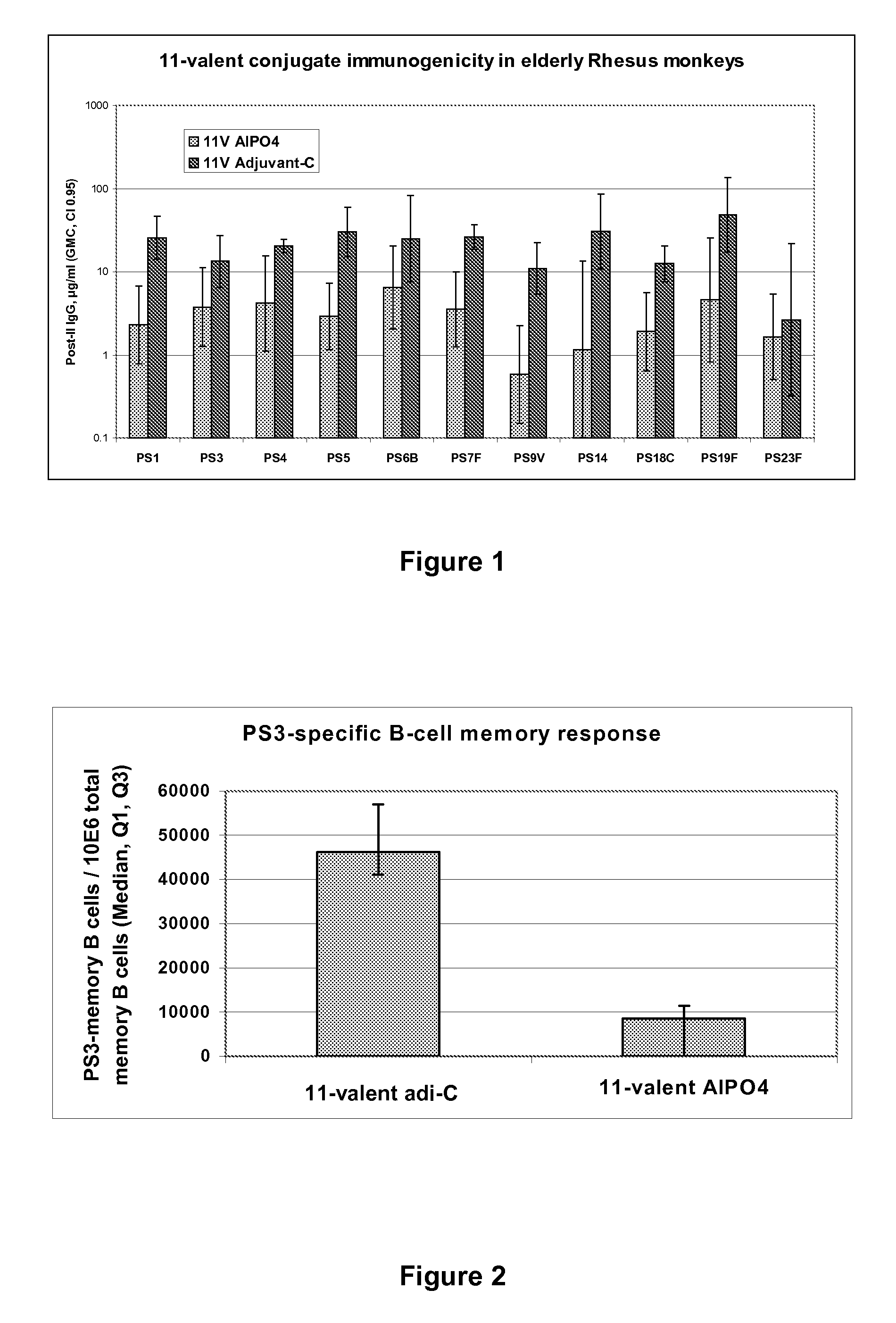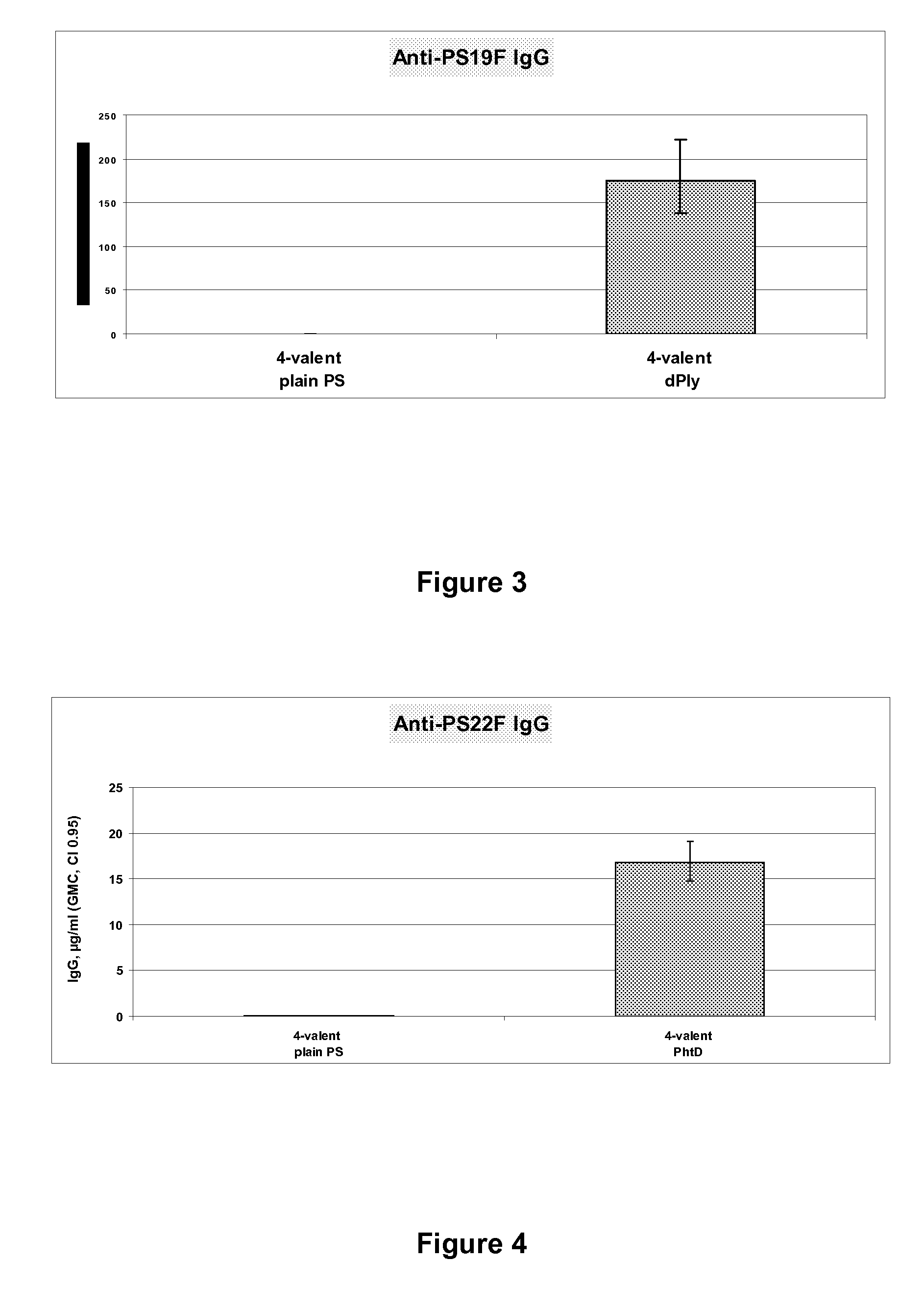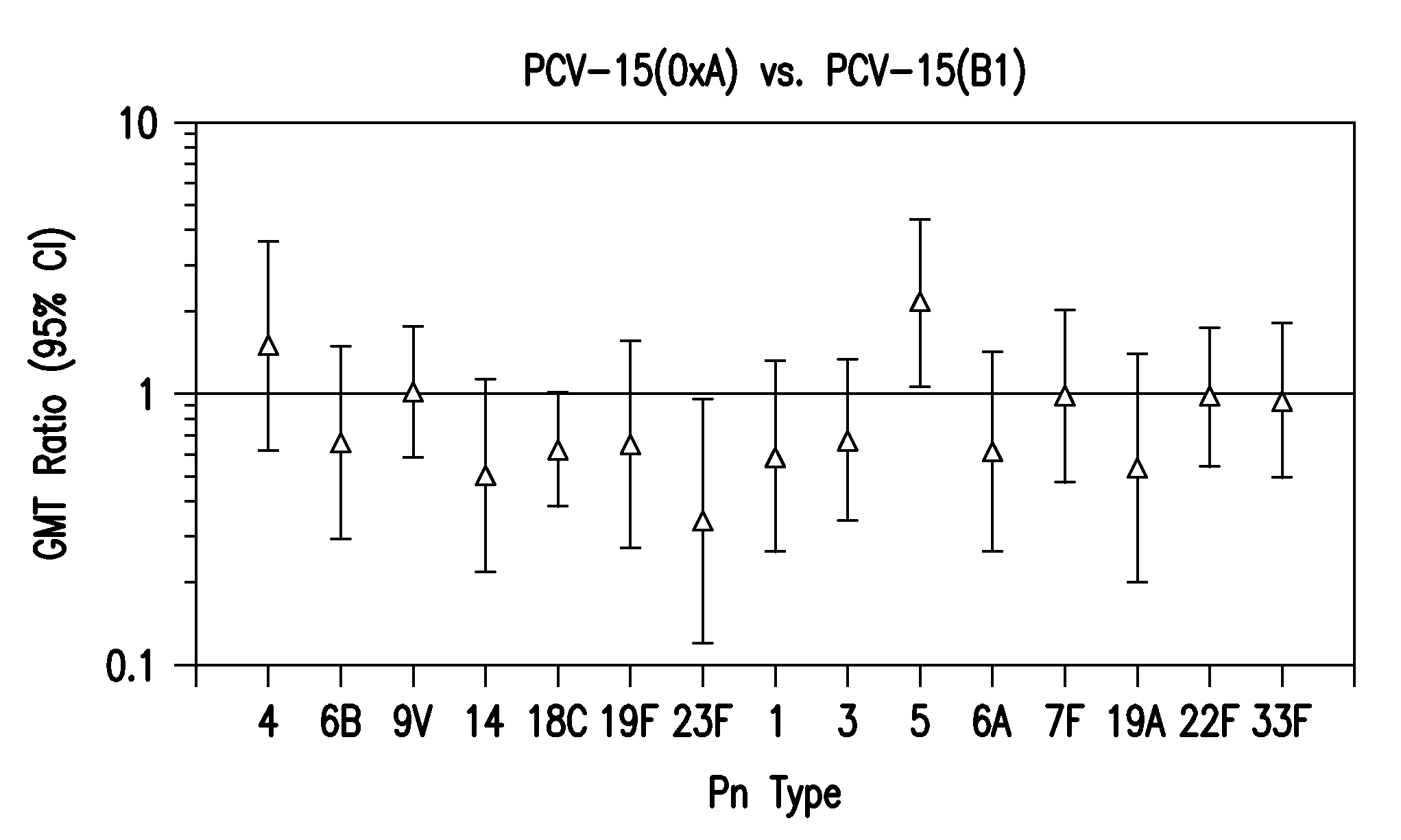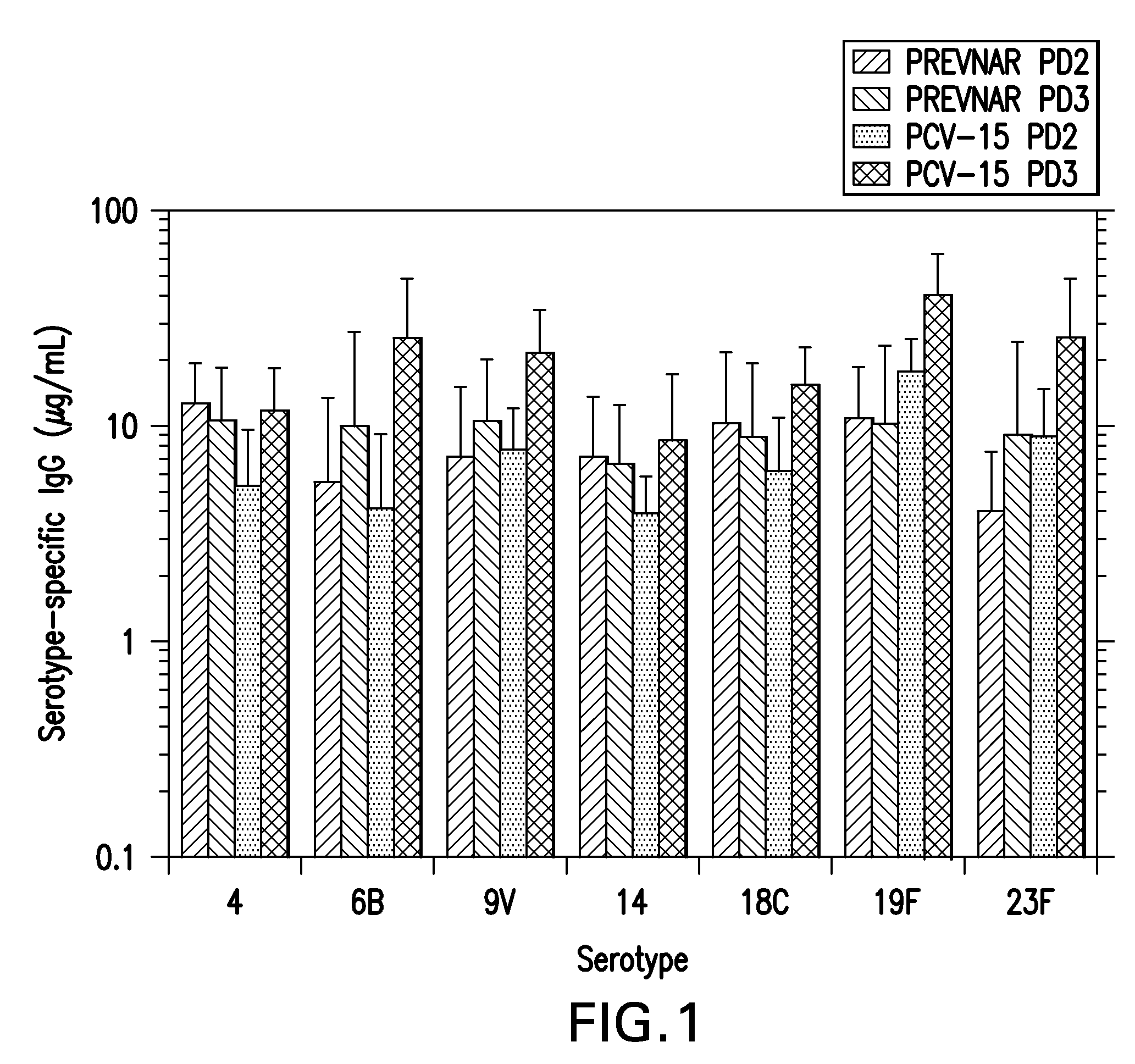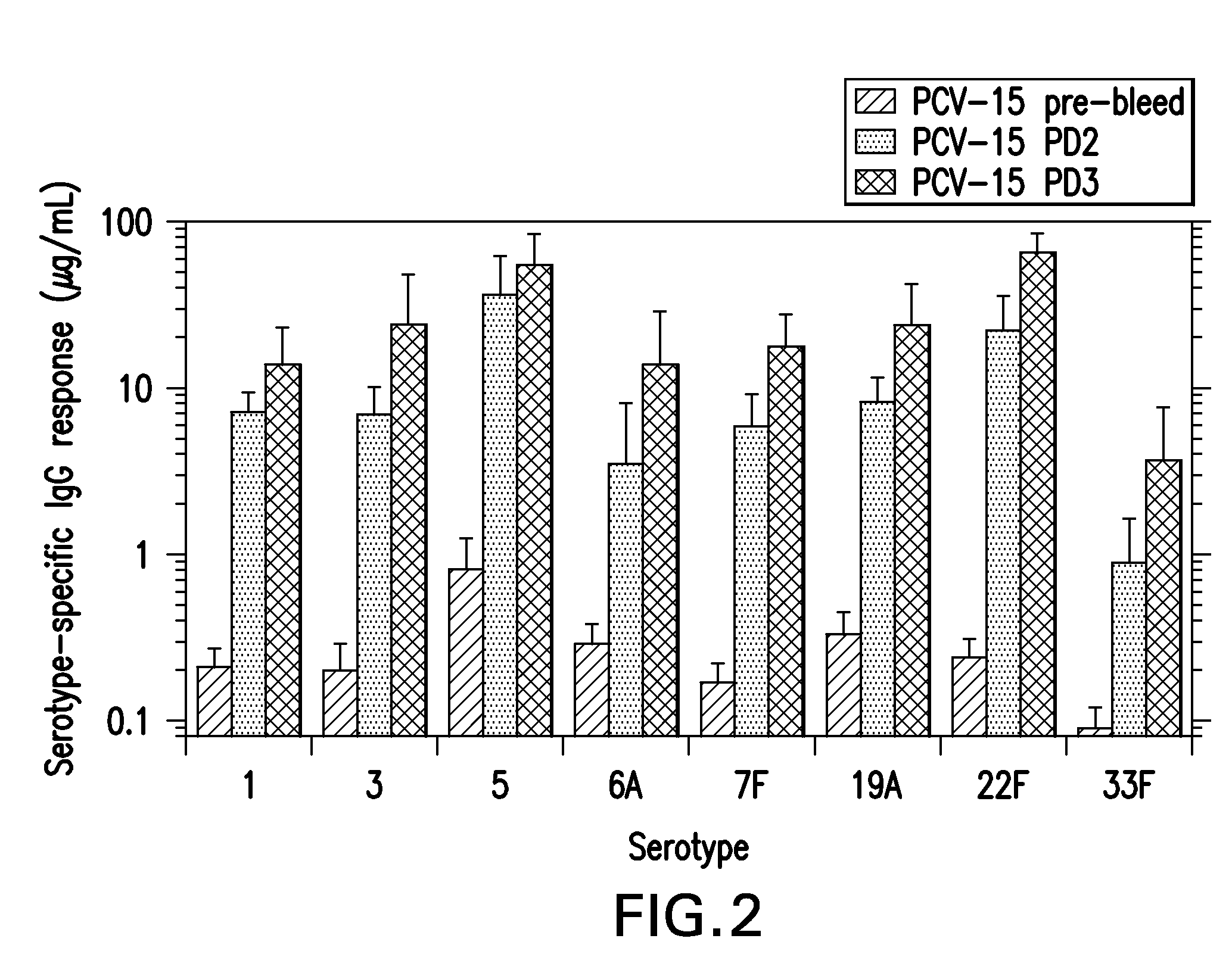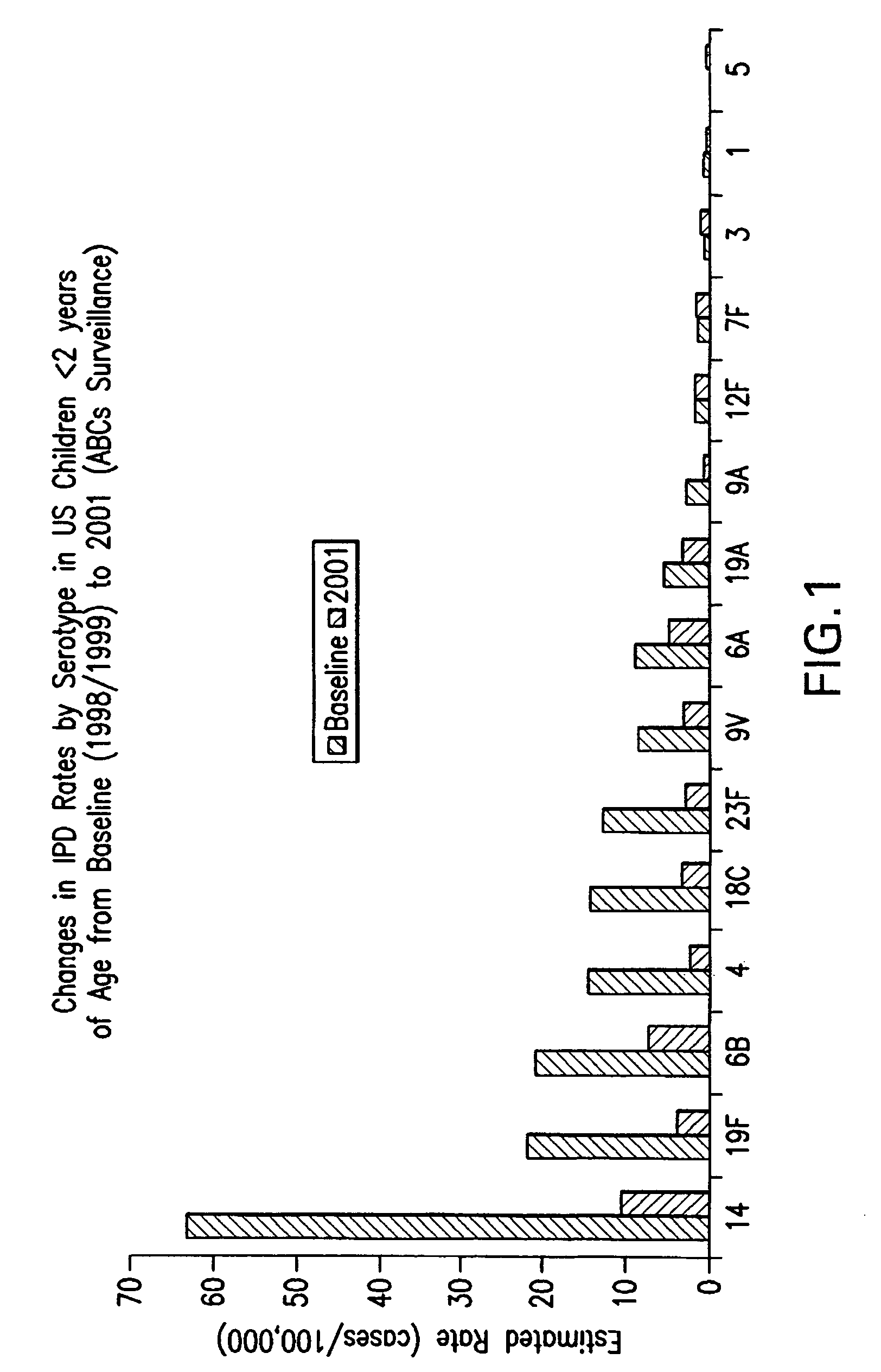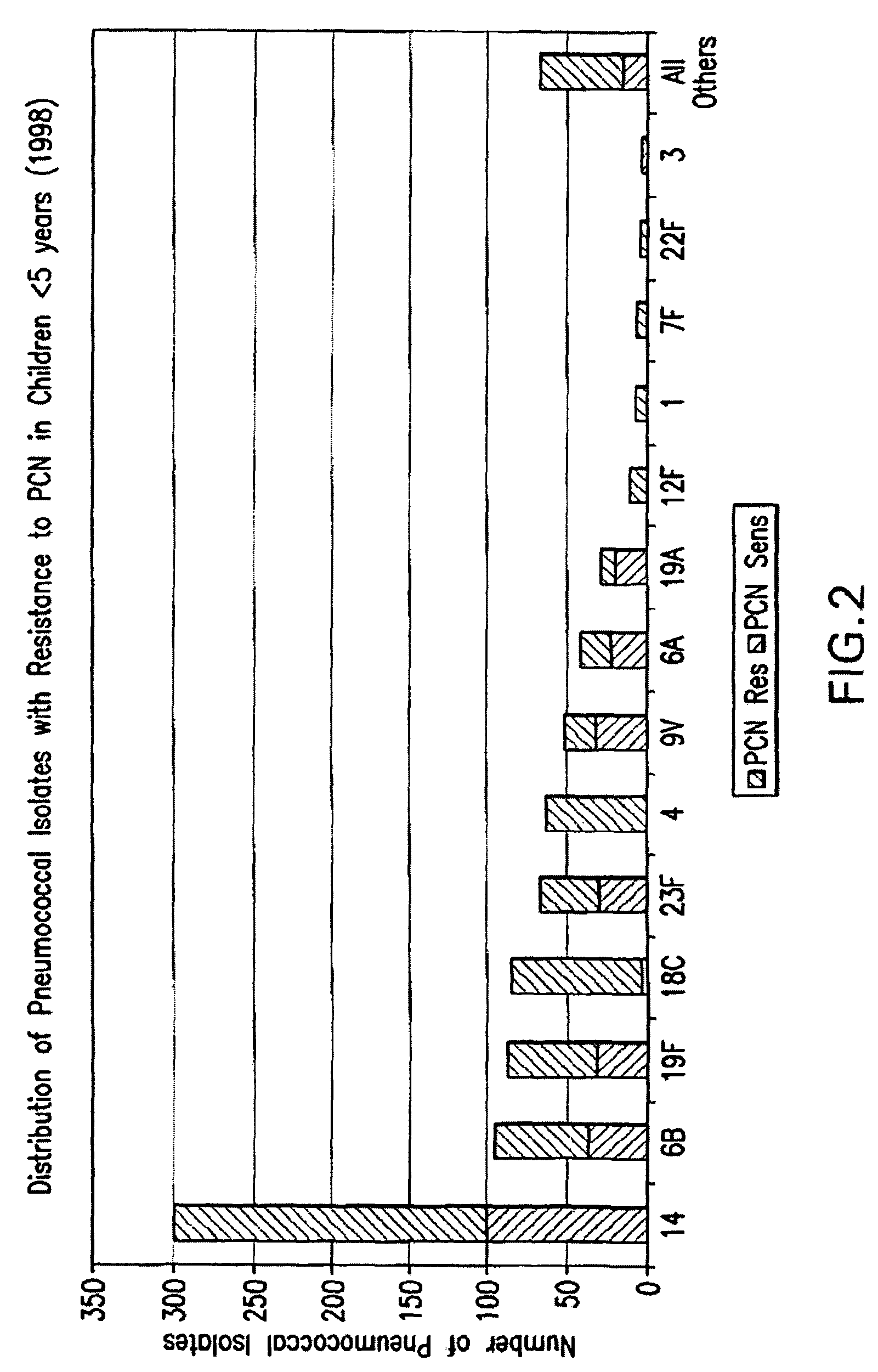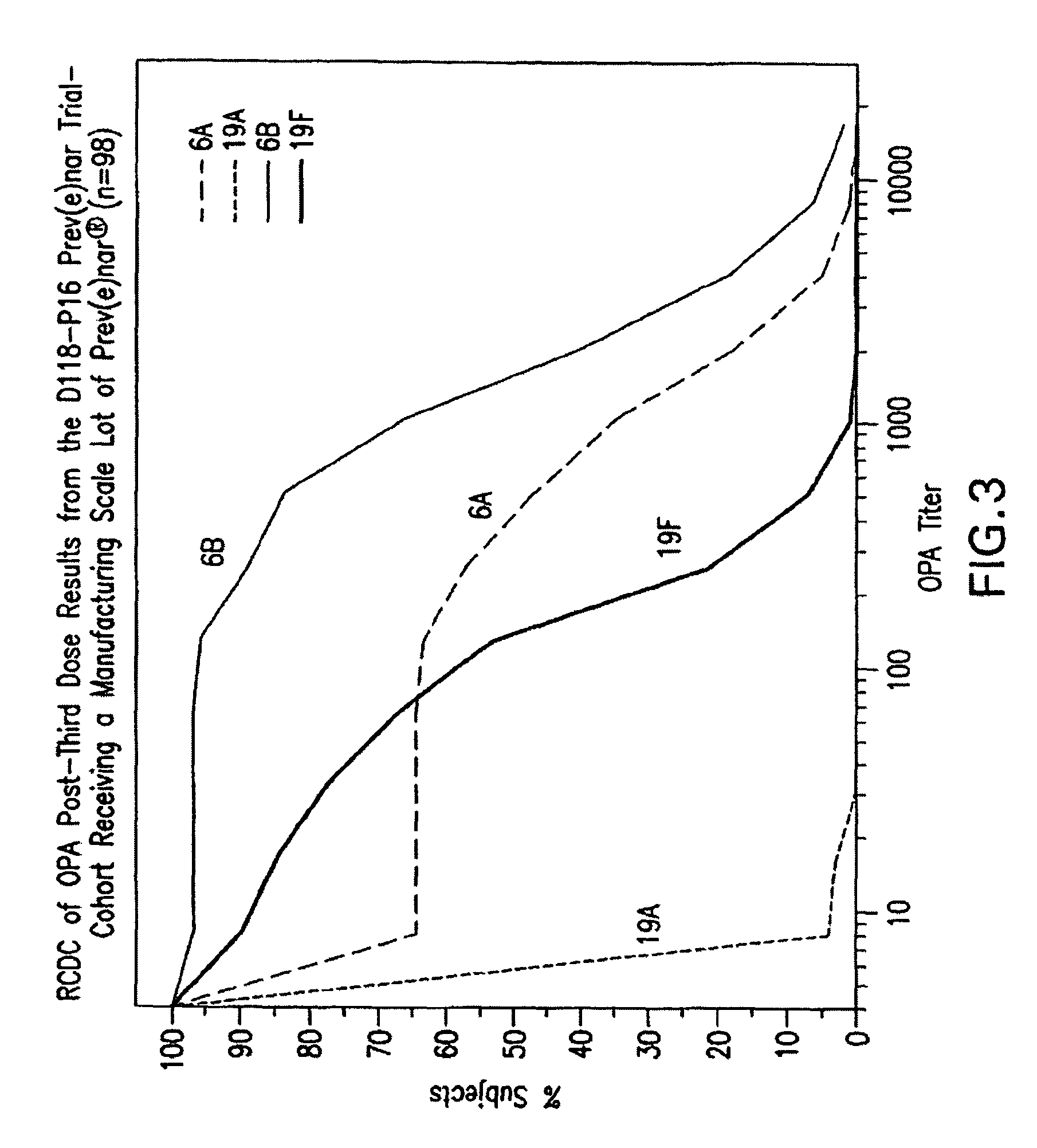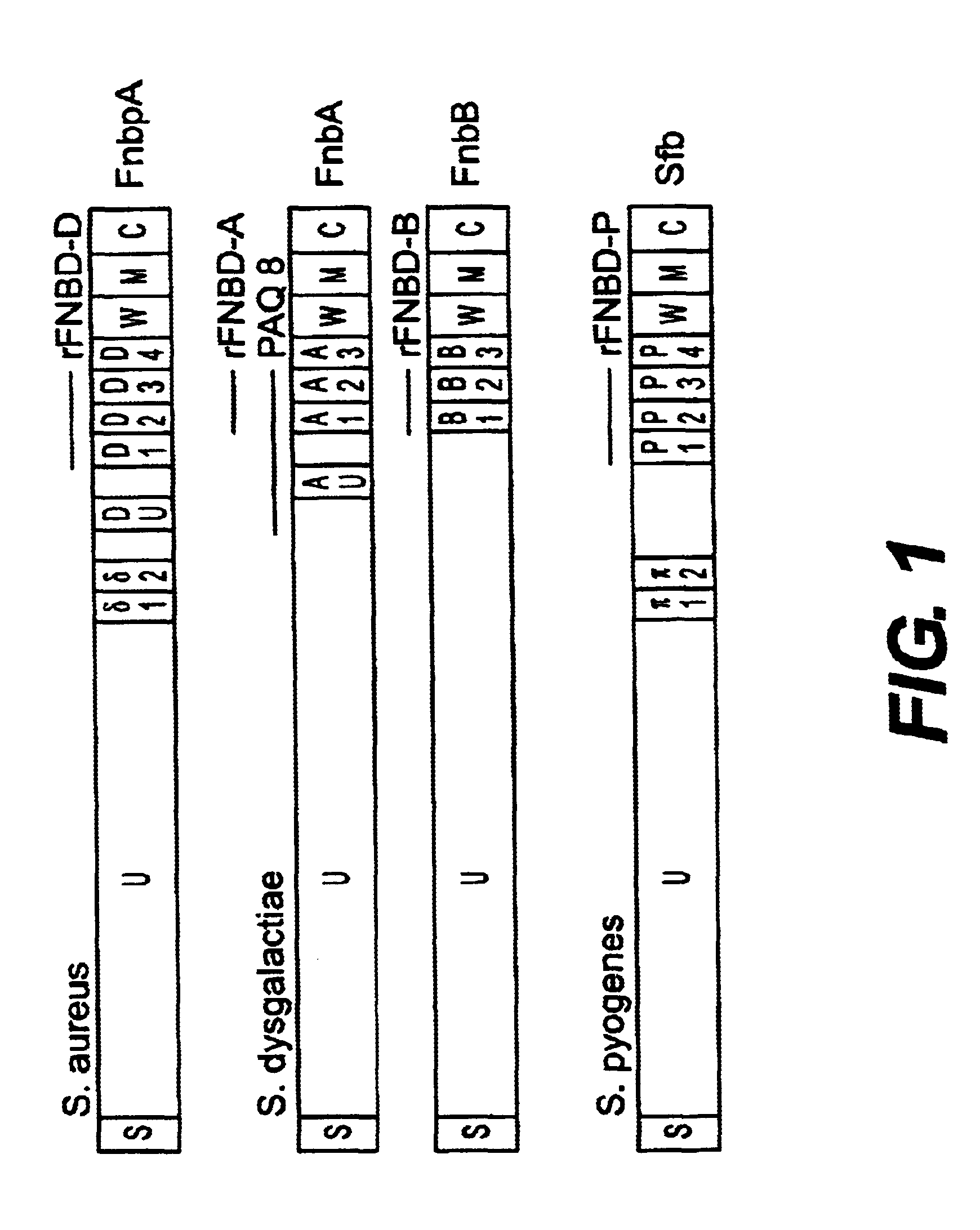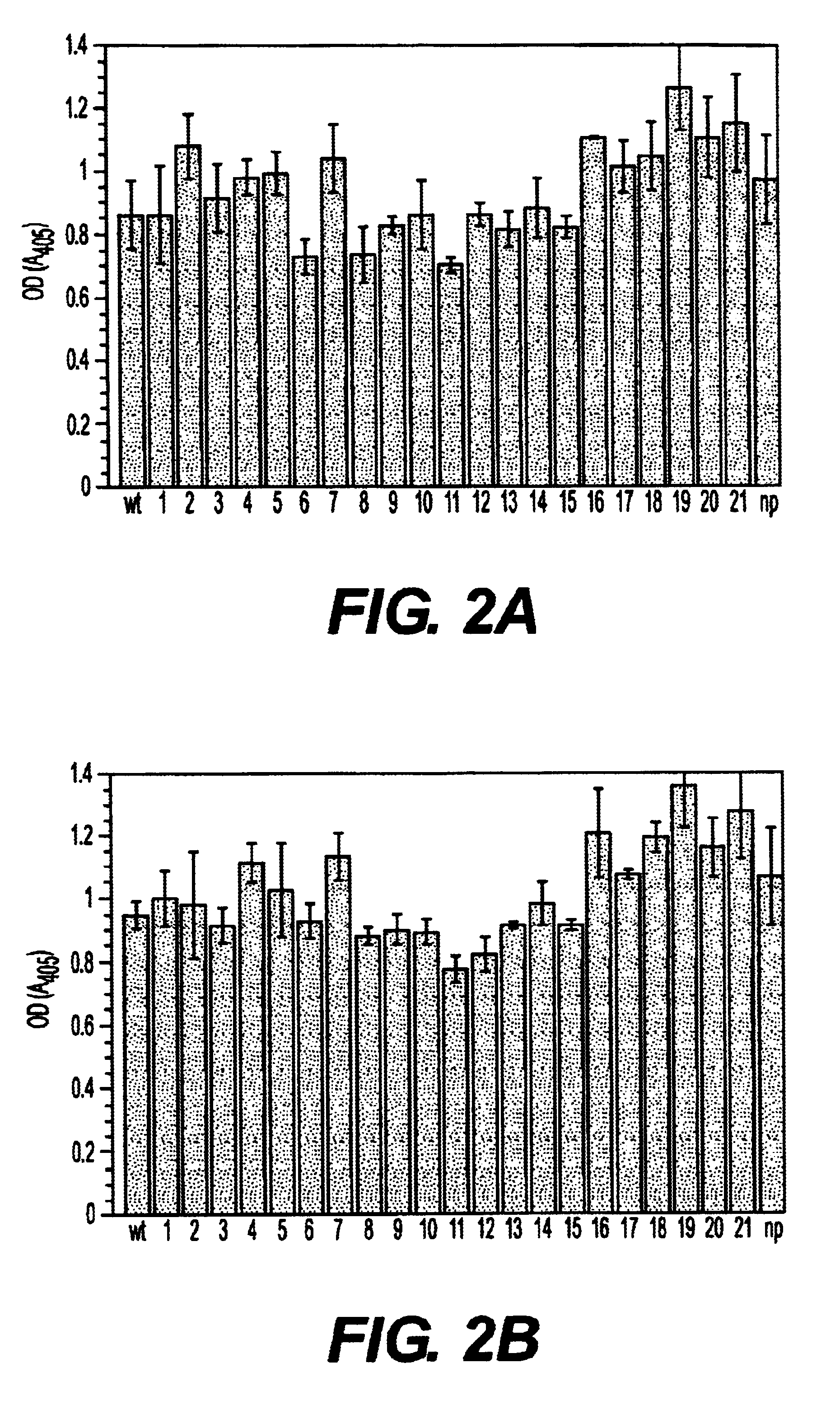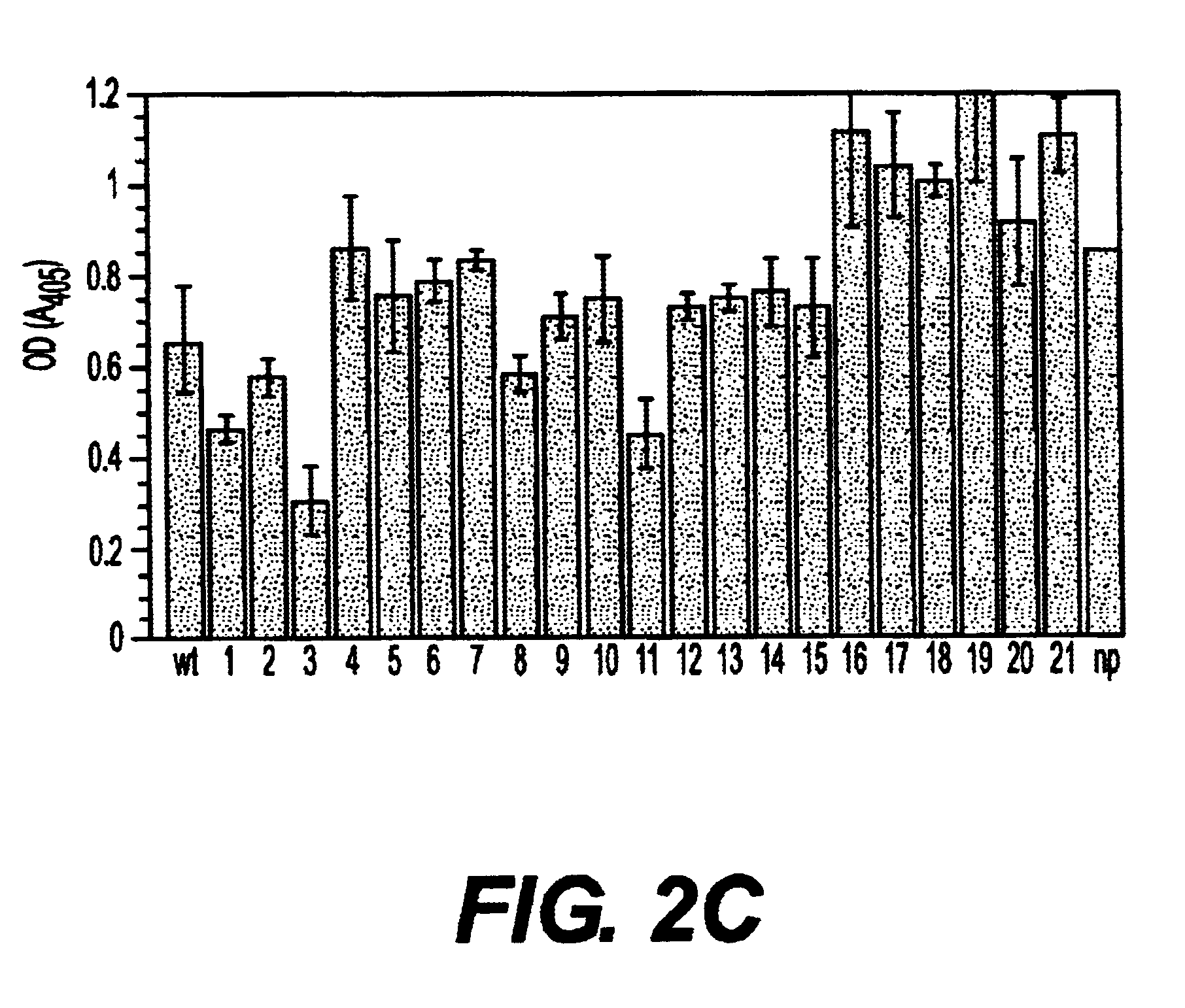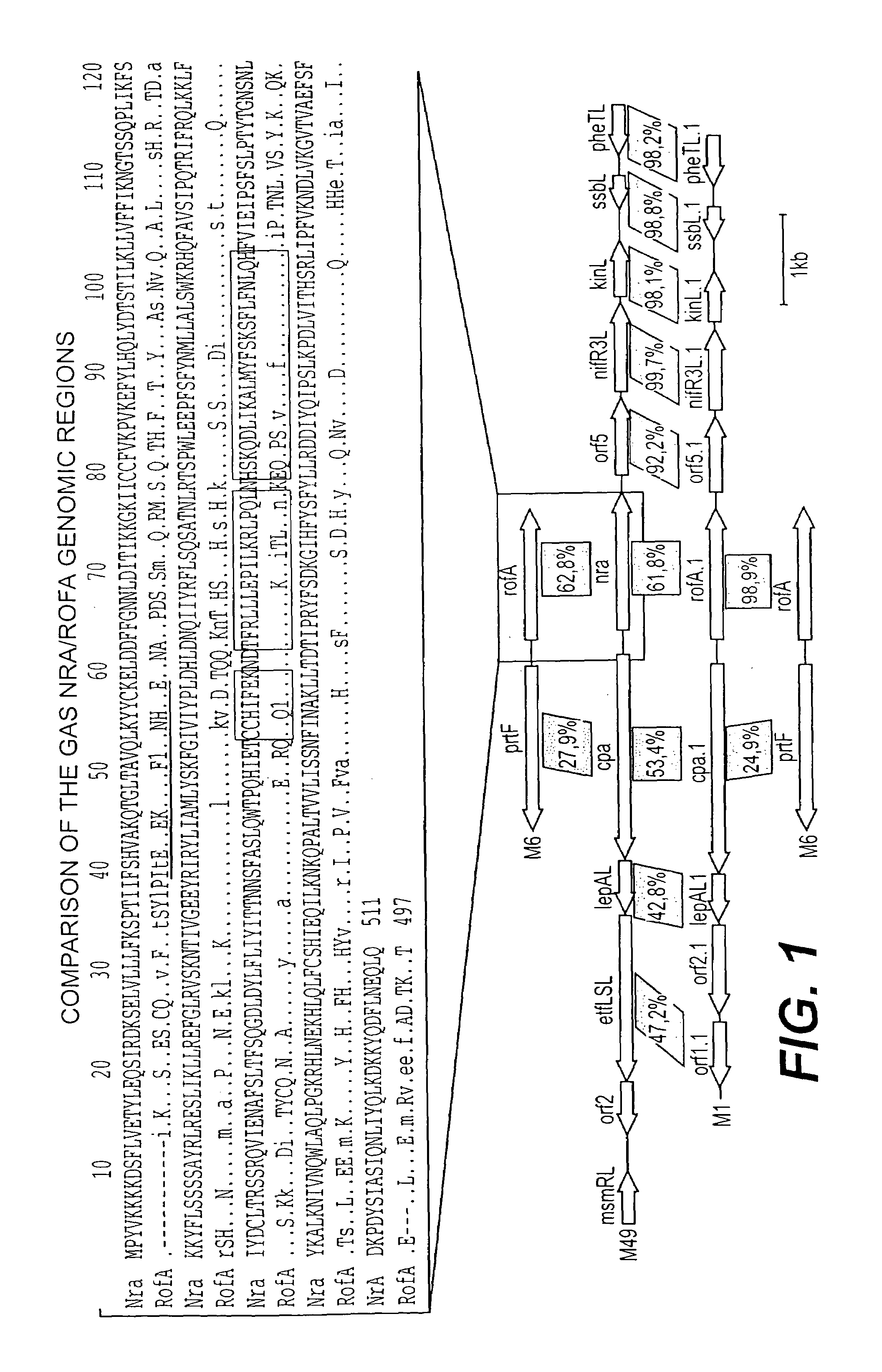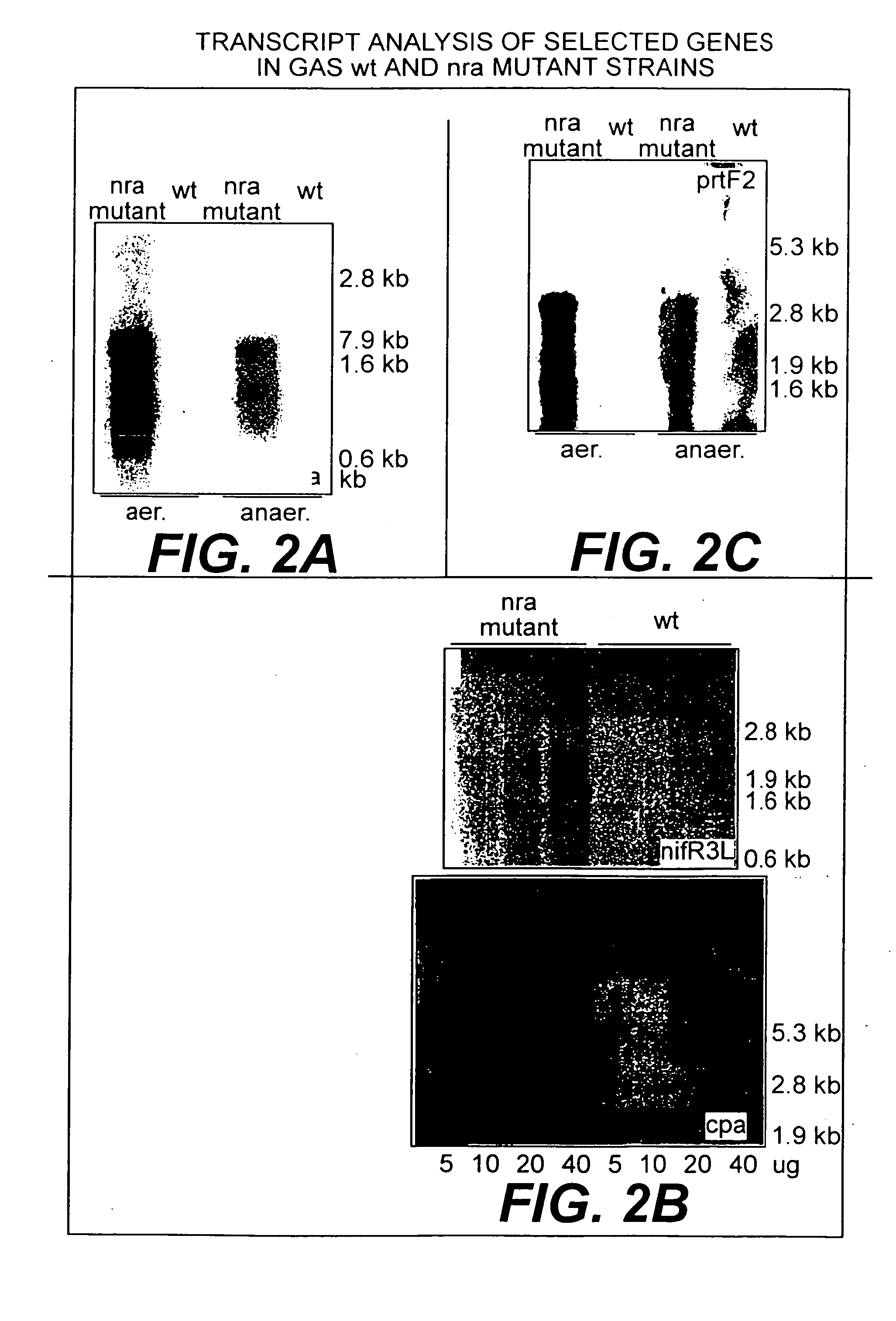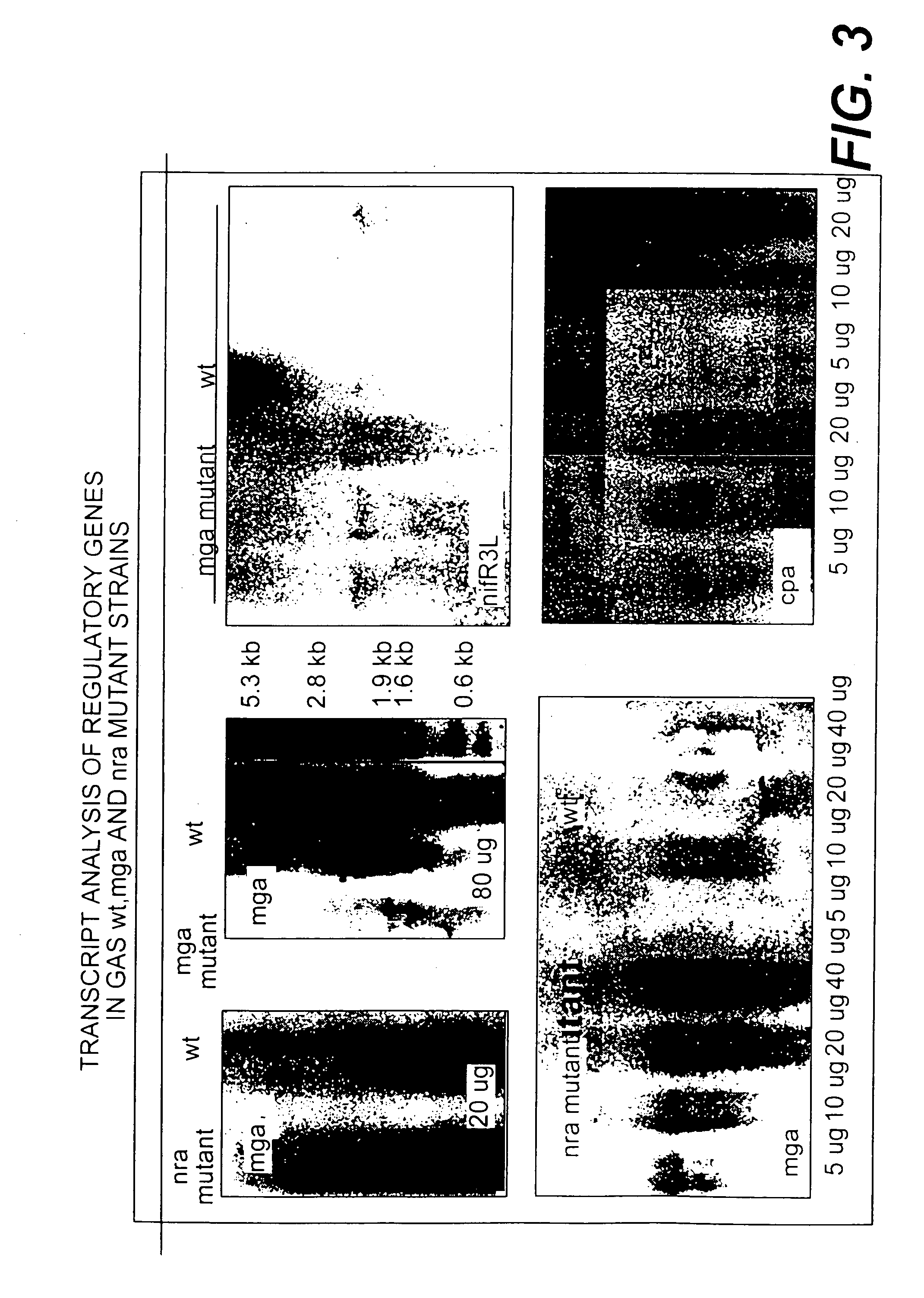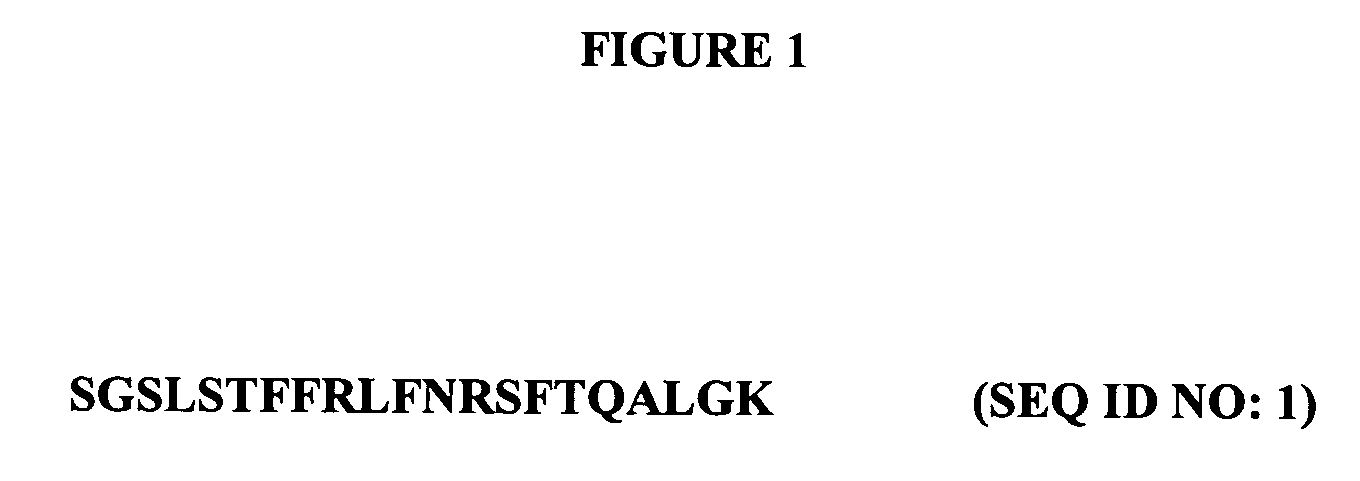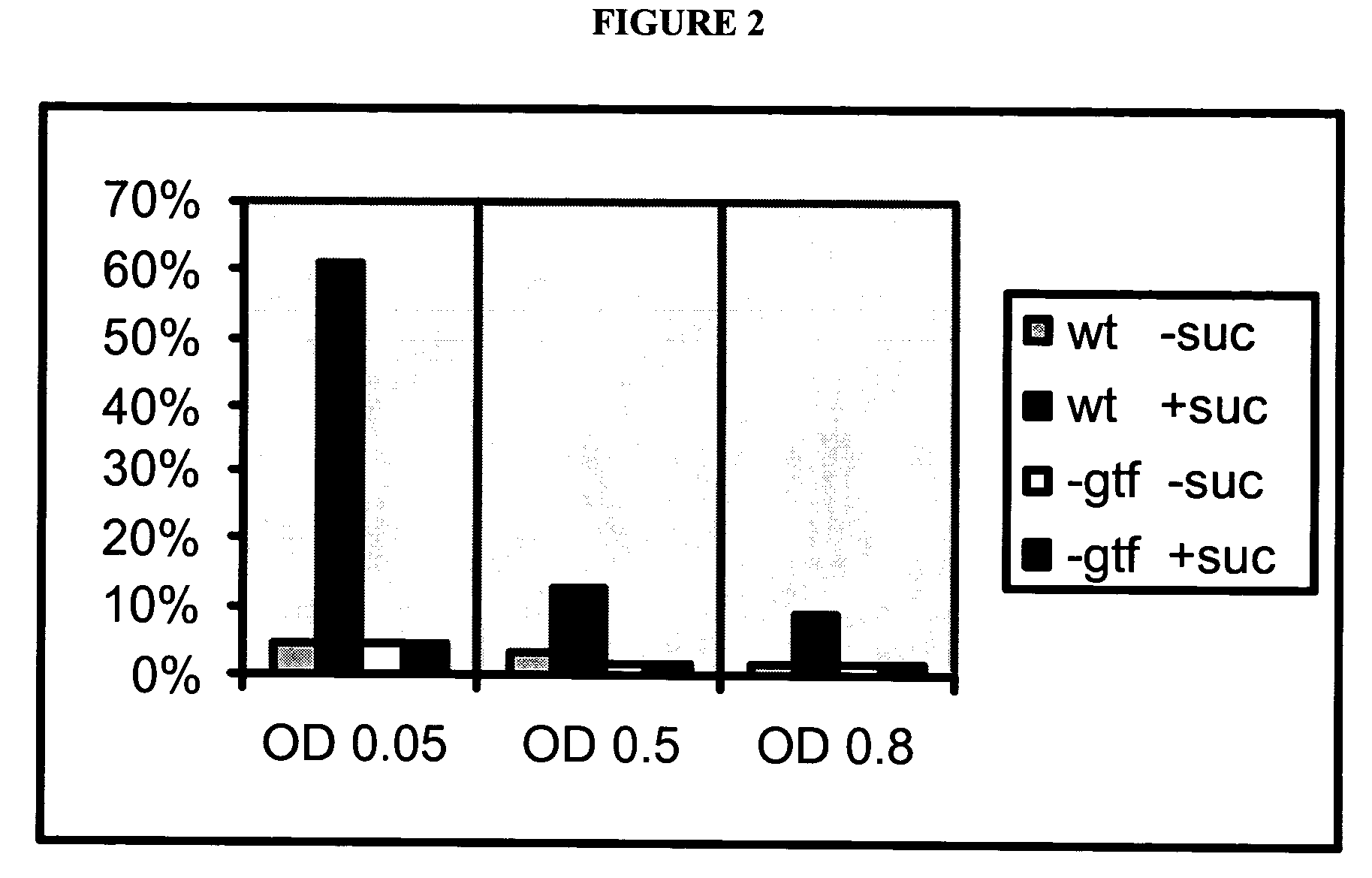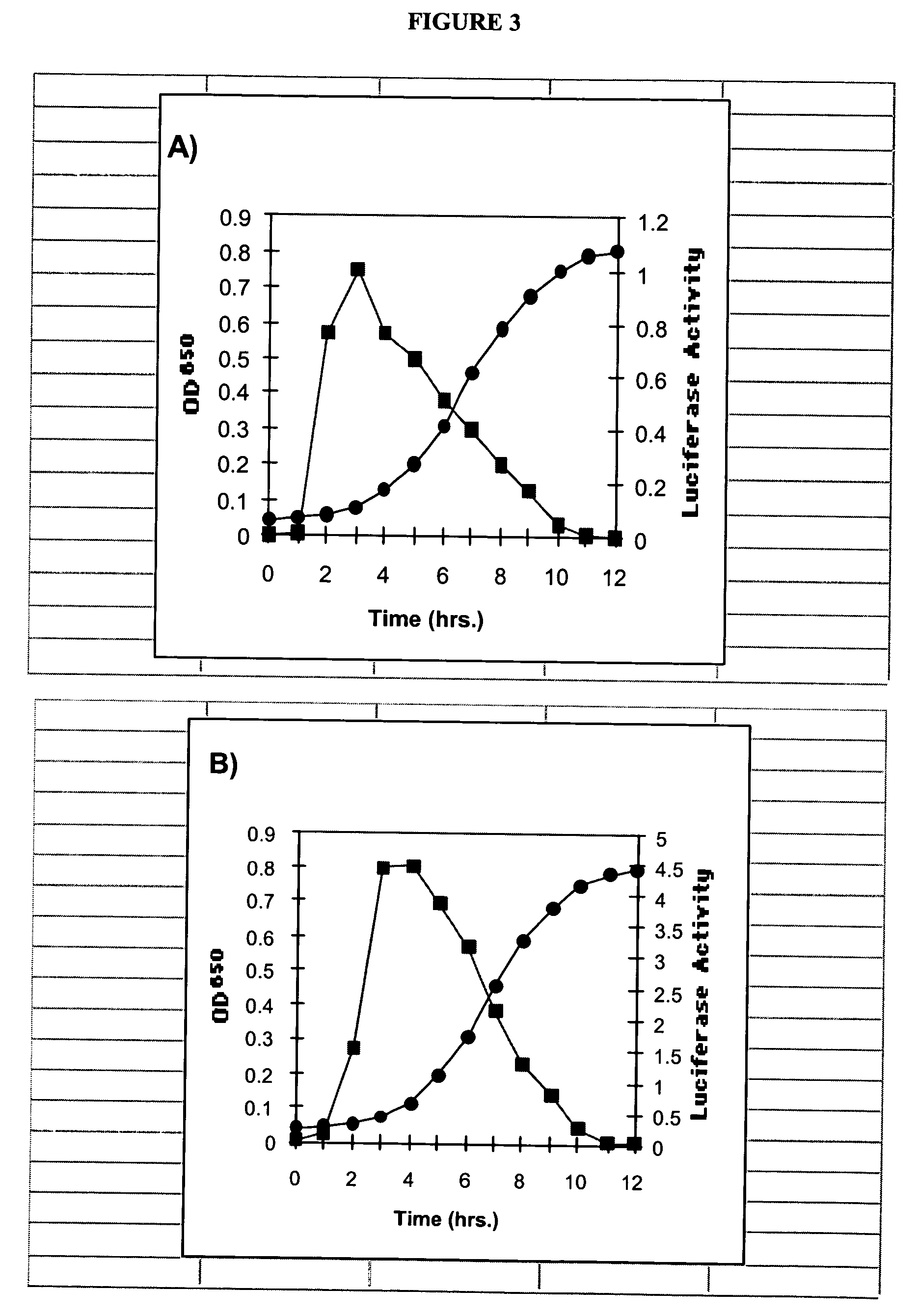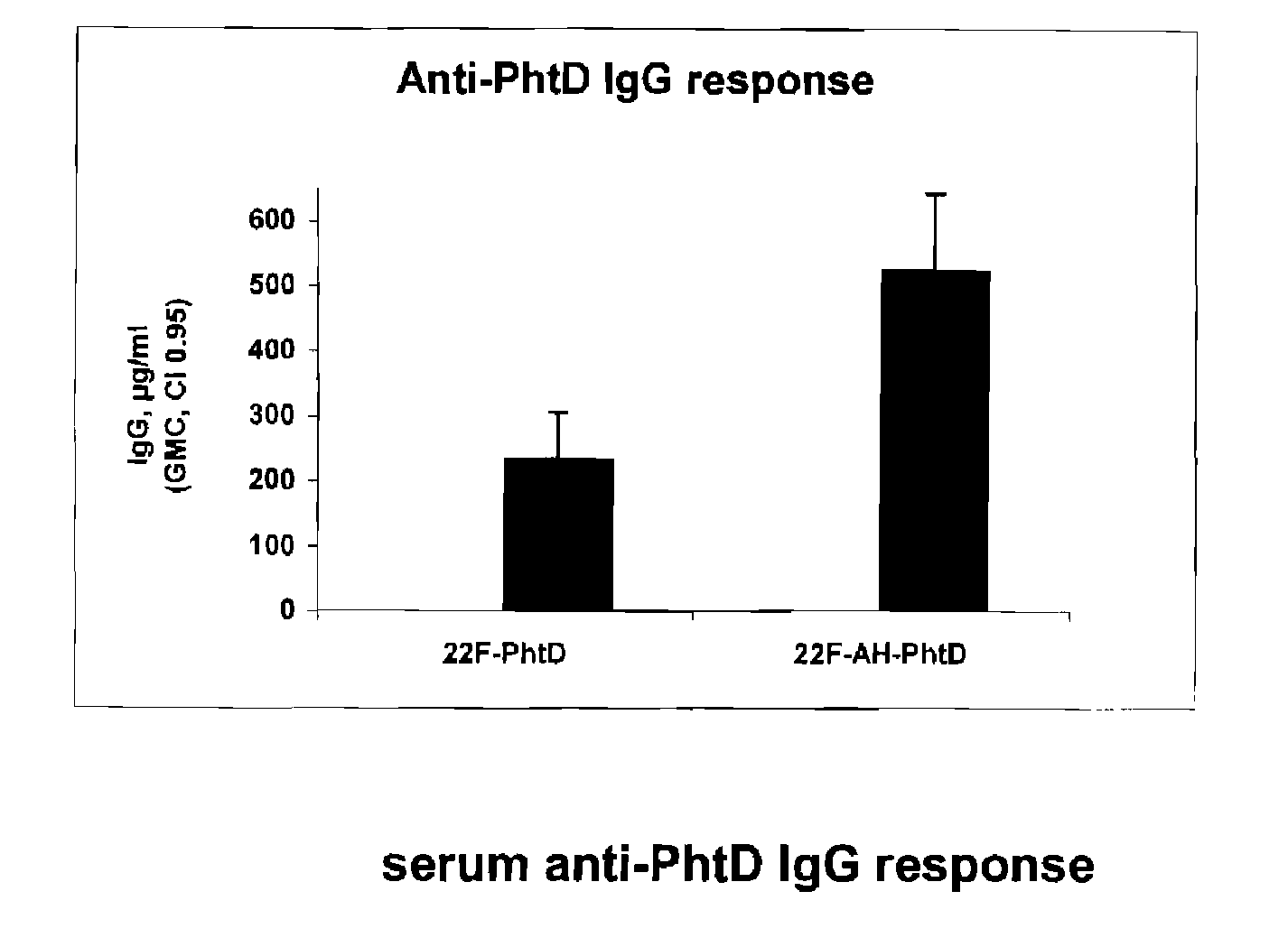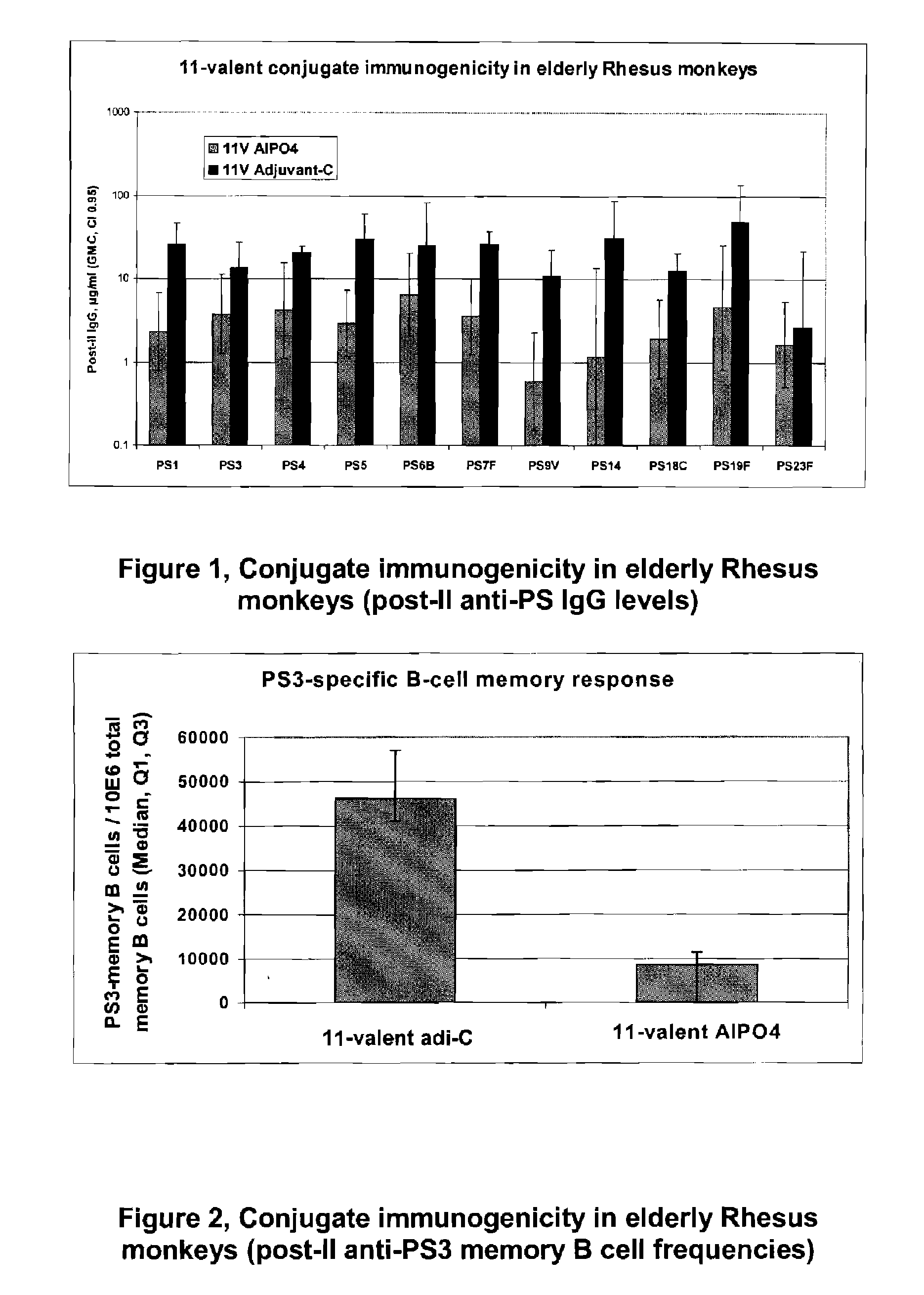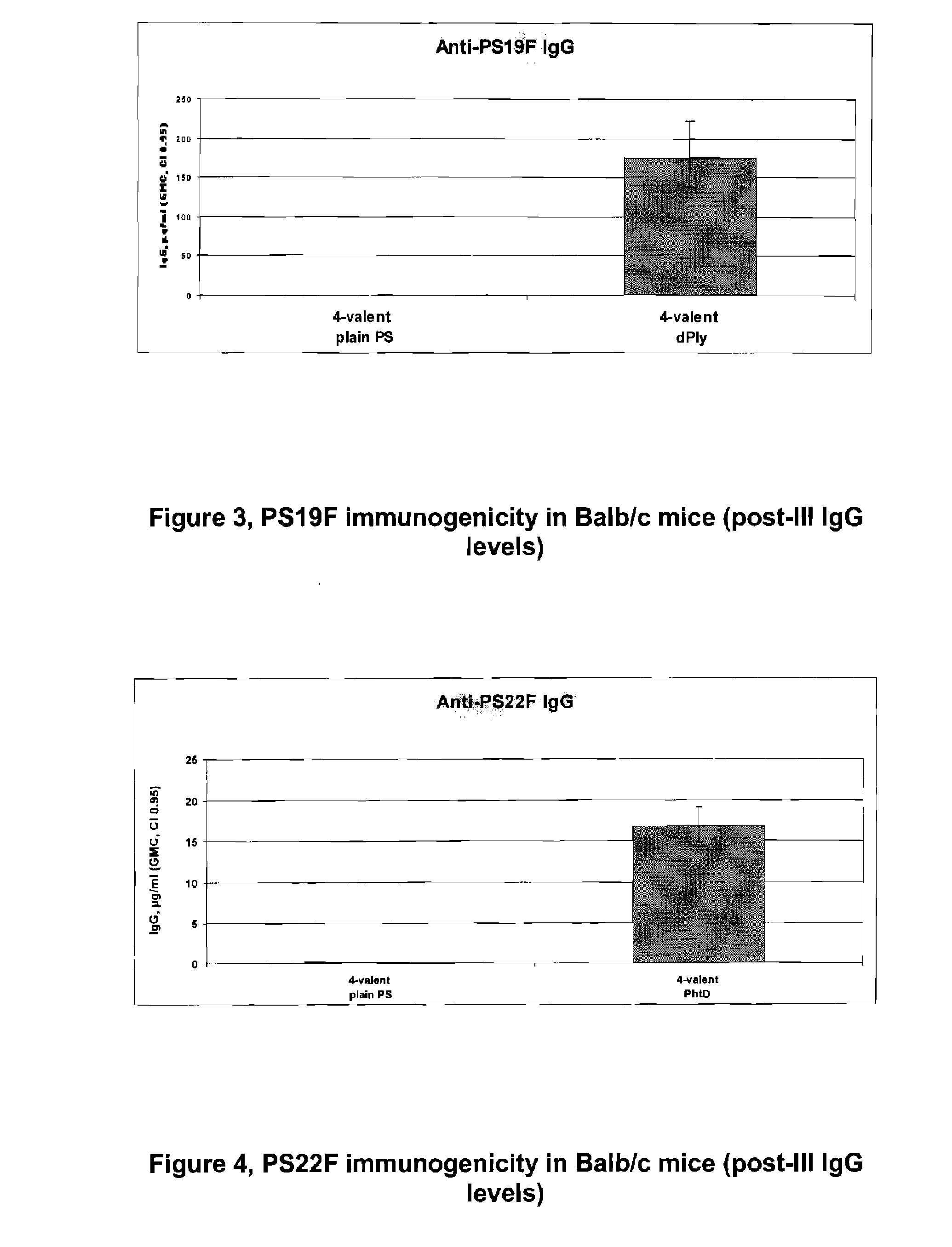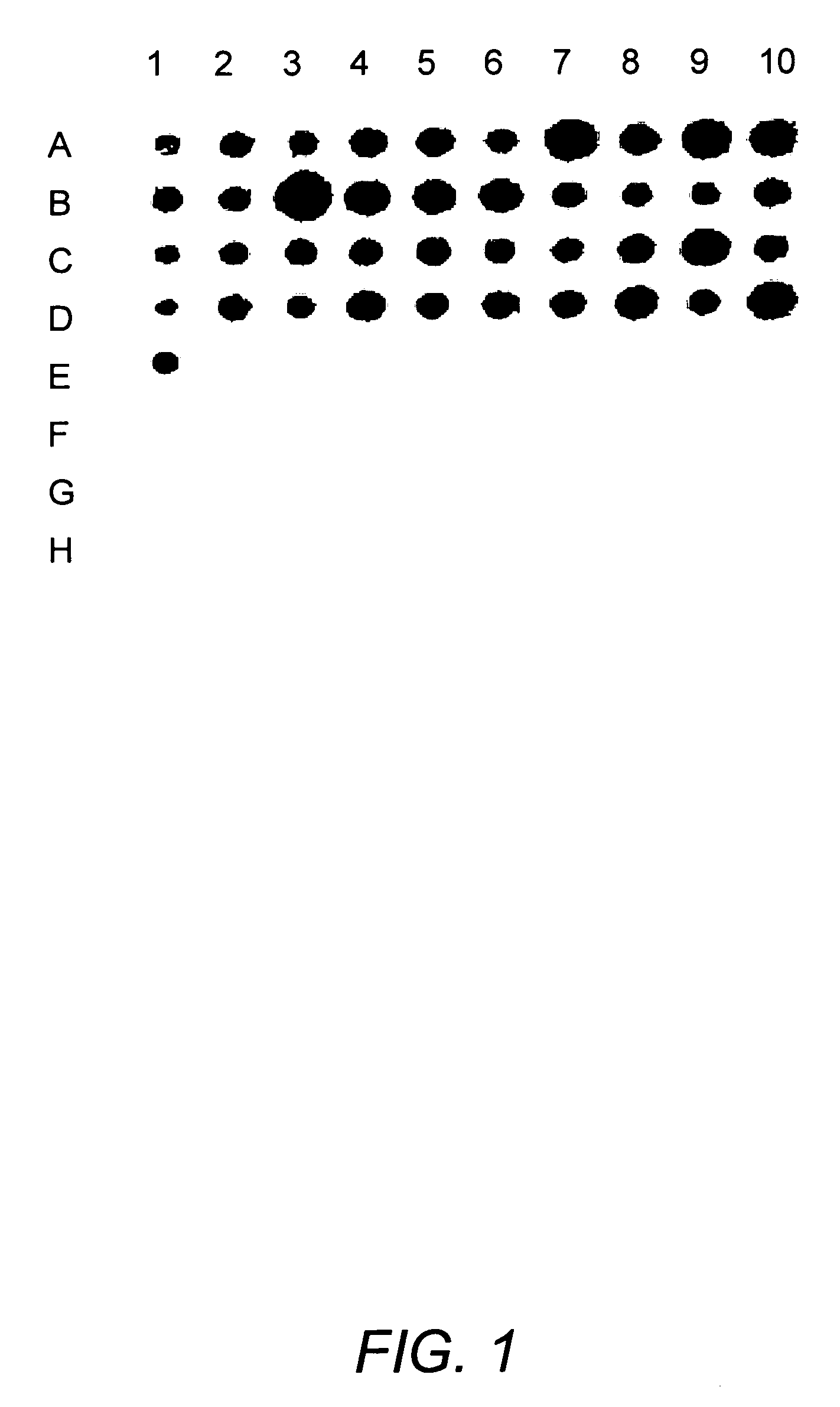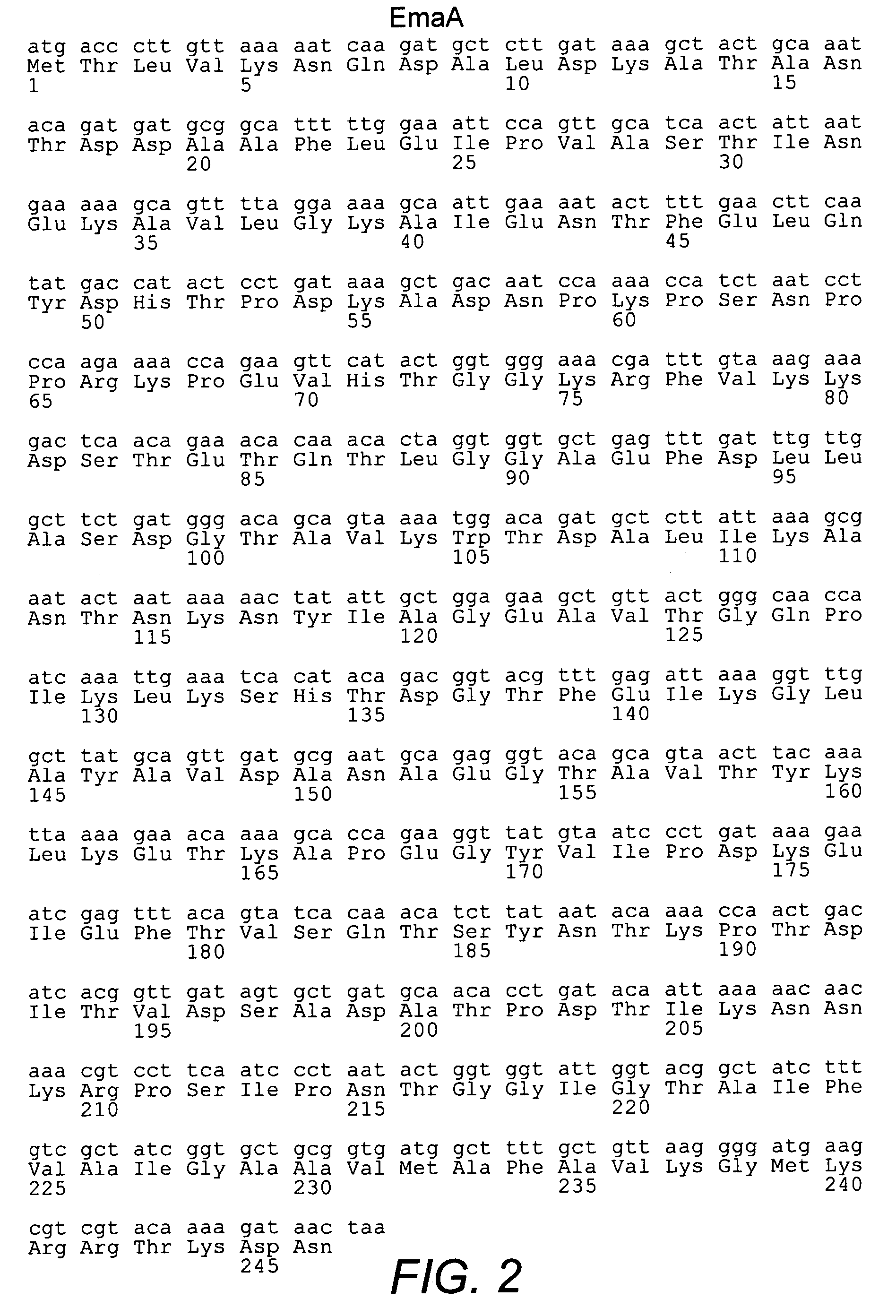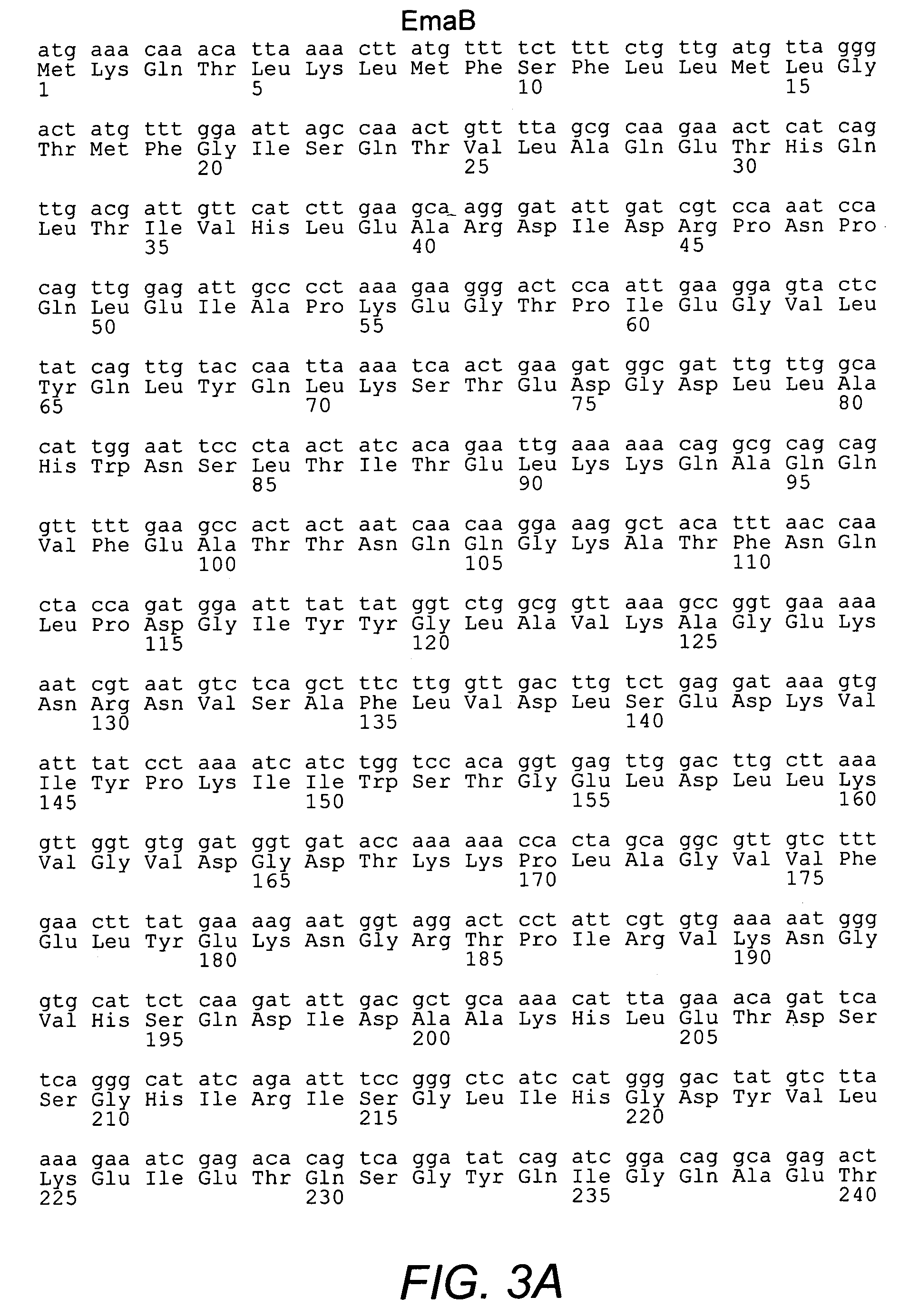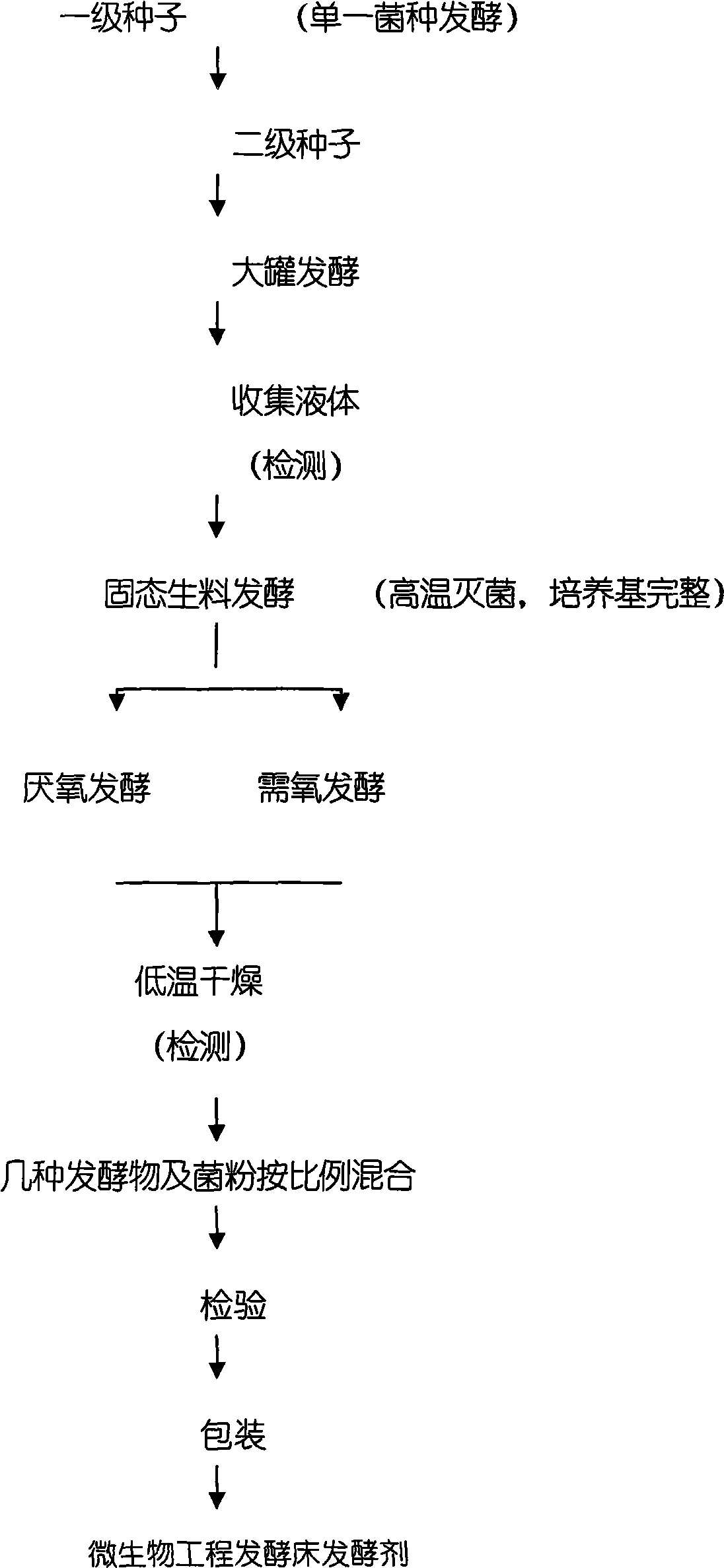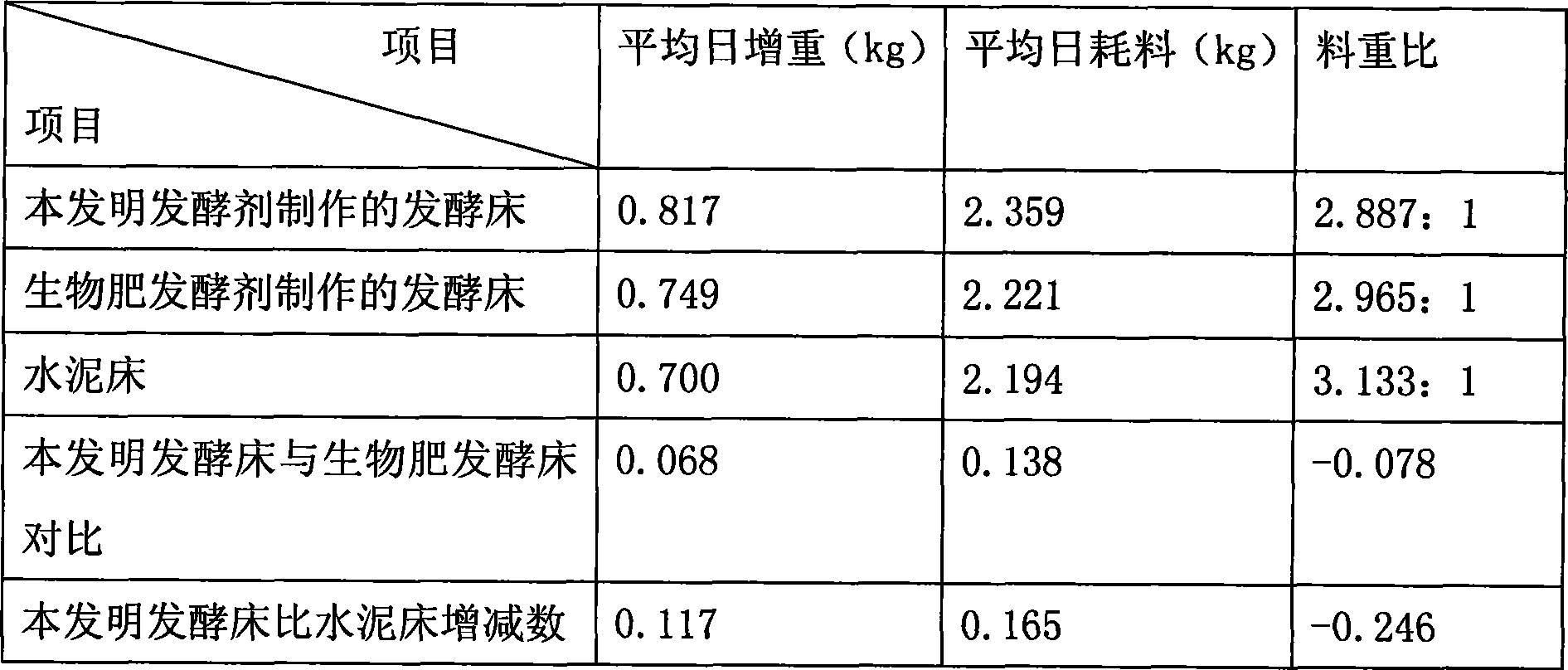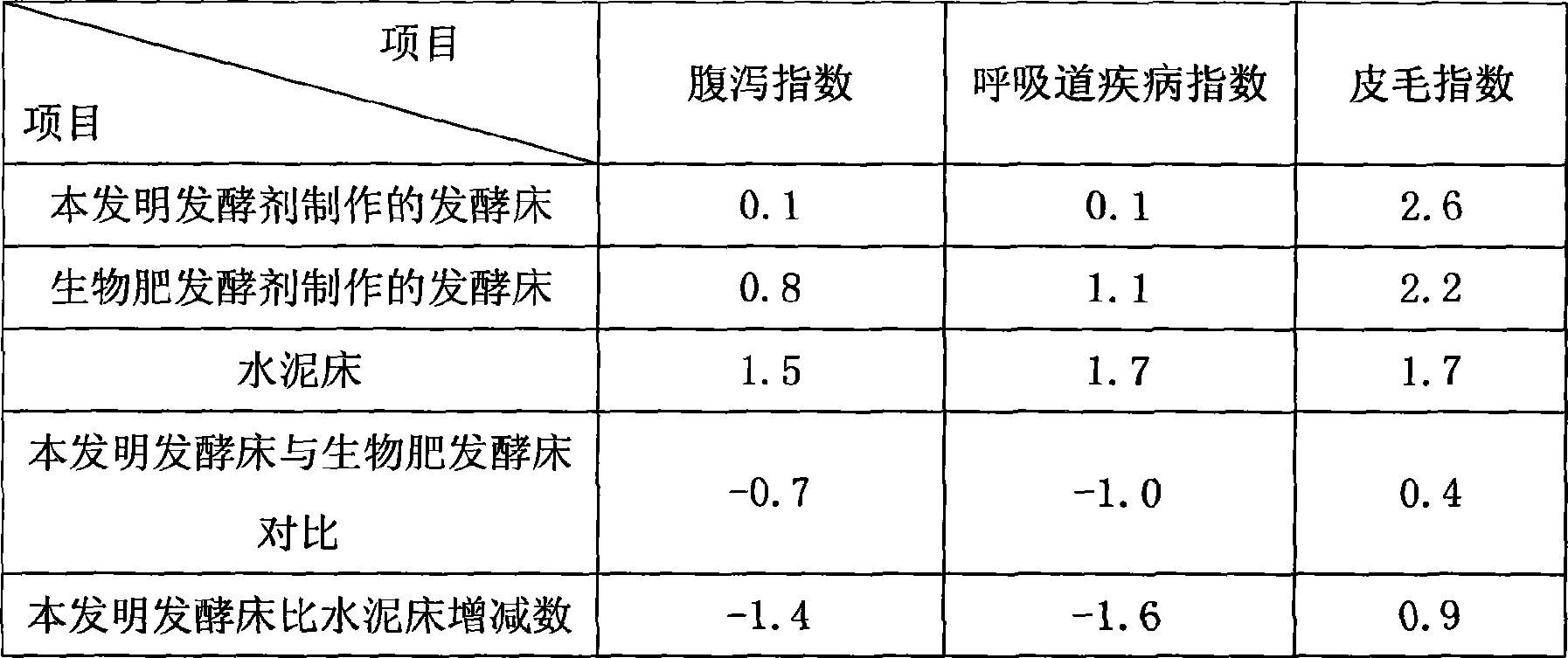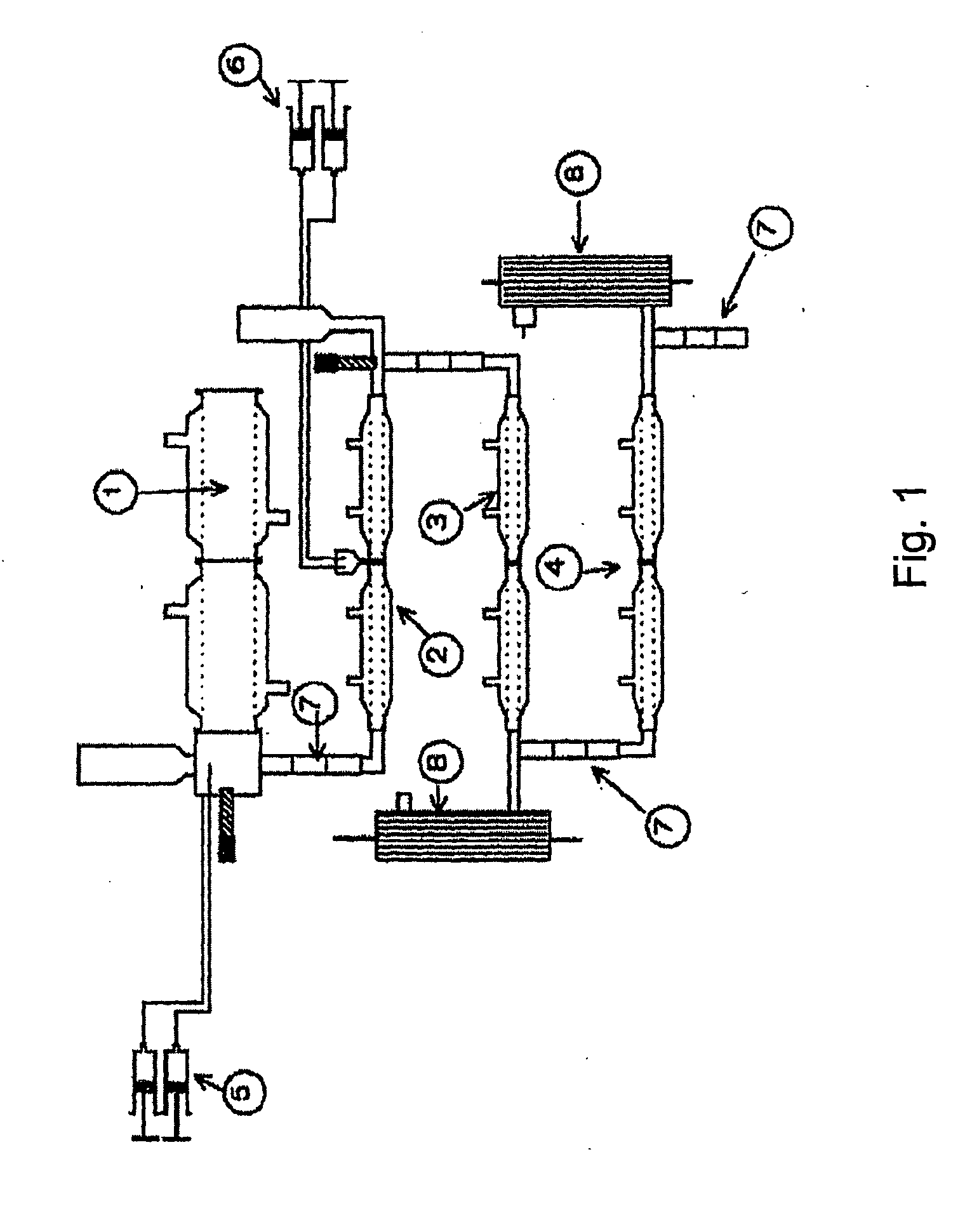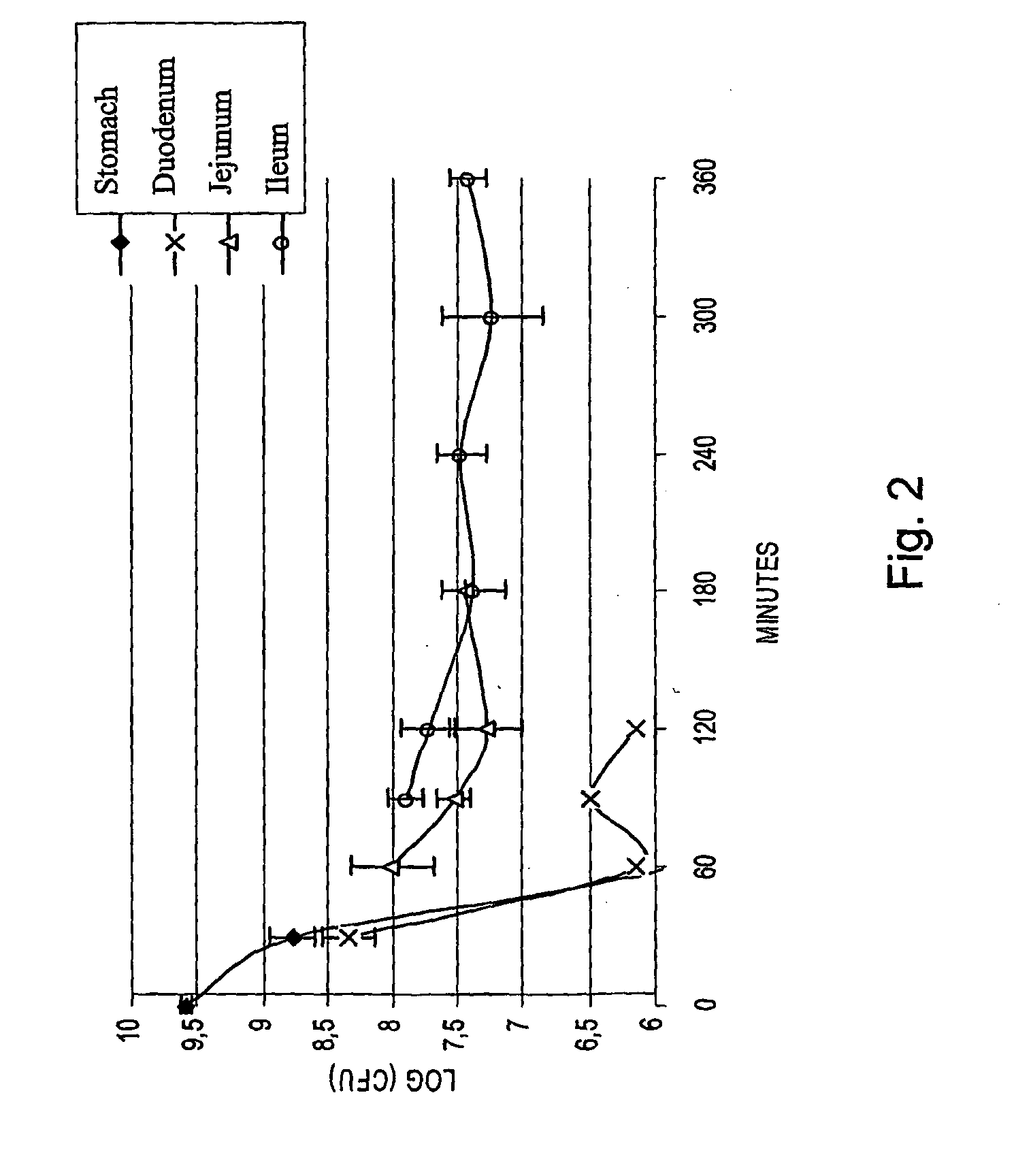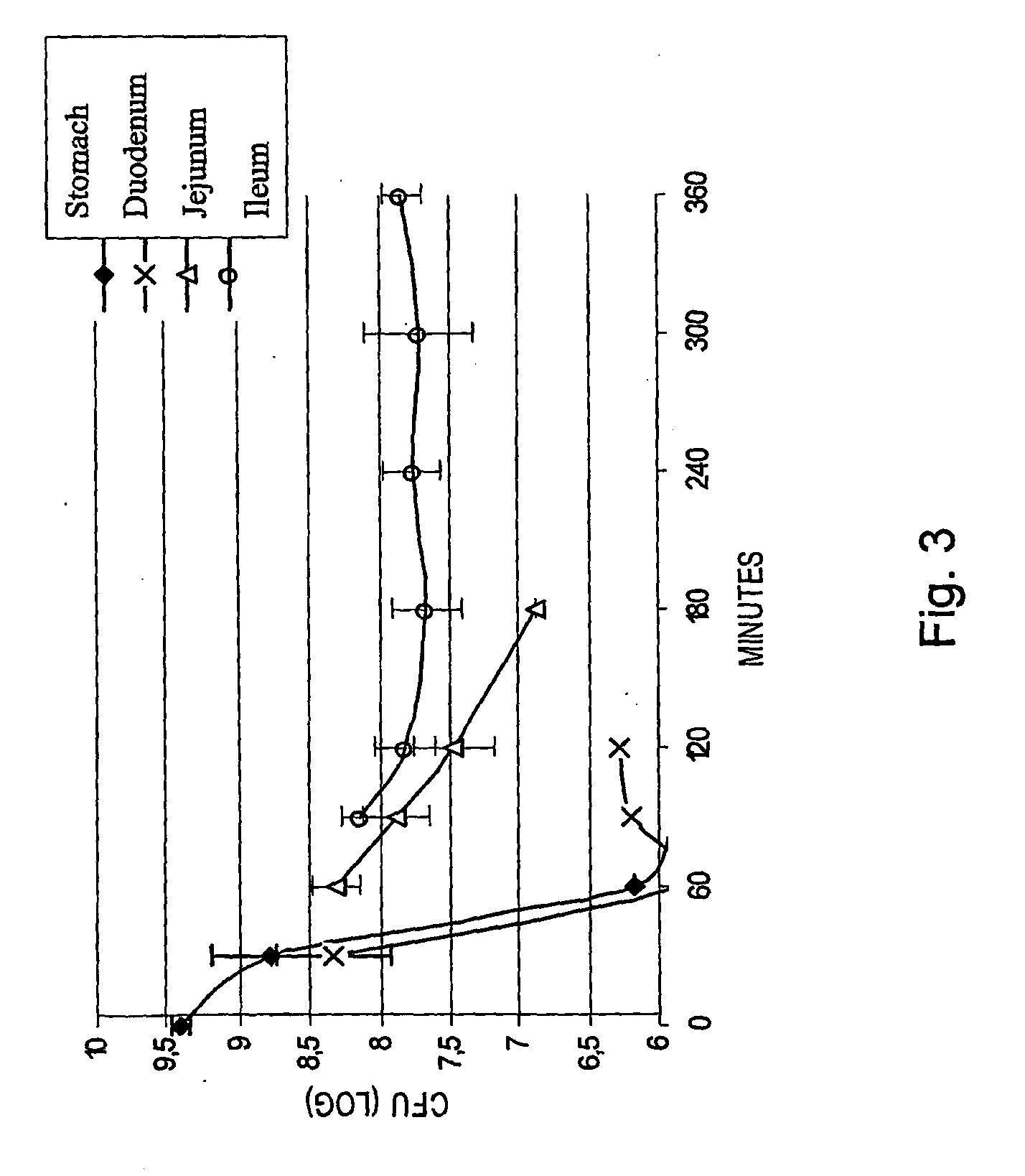Patents
Literature
593 results about "Streptococcus mitis" patented technology
Efficacy Topic
Property
Owner
Technical Advancement
Application Domain
Technology Topic
Technology Field Word
Patent Country/Region
Patent Type
Patent Status
Application Year
Inventor
Streptococcus mitis, previously known as Streptococcus mitior, is a mesophilic alpha-hemolytic species of Streptococcus that inhabits the human mouth. It is most commonly found in the throat, nasopharynx, and mouth. It is a Gram-positive coccus, facultative anaerobe and catalase negative. It can cause infective endocarditis. It has been widely reported that this organism survived for over two years on the Surveyor 3 probe on the moon; but some NASA scientists suggest this may be a result of contamination during or after return of Surveyor parts to Earth.
Multivalent pneumococcal polysaccharide-protein conjugate composition
An immunogenic composition having 13 distinct polysaccharide-protein conjugates and optionally, an aluminum-based adjuvant, is described. Each conjugate contains a capsular polysaccharide prepared from a different serotype of Streptococcus pneumoniae (1, 3, 4, 5, 6A, 6B, 7F, 9V, 14, 18C, 19A, 19F and 23F) conjugated to a carrier protein. The immunogenic composition, formulated as a vaccine, increases coverage against pneumococcal disease in infants and young children globally, and provides coverage for serotypes 6A and 19A that is not dependent on the limitations of serogroup cross-protection. Methods for making an immunogenic conjugate comprising Streptococcus pneumoniae serotype 19A polysaccharide are also provided in which the serotype 19A polysaccharide is co-lyophilized with a carrier protein and conjugation is carried out in dimethyl sulfoxide (DMSO) via a reductive amination mechanism.
Owner:WYETH LLC
Separation of contaminants from Streptococcus pneumoniae polysaccharide by pH manipulation
ActiveUS20060228381A1Soluble protein is effectively reducedBacterial antigen ingredientsSugar derivativesStreptococcus pneumoniaeLysis
A process for reducing the protein content and preserving the capsular polysaccharide content in a complex cellular Streptococcus pneumoniae lysate broth prior to purification is described. Utilizing pH reduction after cellular lysis has resulted in a purified polysaccharide that consistently meets the protein specification, and higher recovery yields of polysaccharide during the purification process.
Owner:WYETH LLC
Streptococcus pneumoniae 37-kDa surface adhesin a protein
The invention provides a nucleic acid encoding the 37-kDa protein from Streptococcus pneumoniae. Also provided are isolated nucleic acids comprising a unique fragment of at least 10 nucleotides of the 37-kDa protein. The invention also provides purified polypeptides encoded by the nucleic acid encoding the 37-kDa protein from and the nucleic acids comprising a unique fragment of at least 10 nucleotides of the 37-kDa protein. Also provided are antibodies which selectively binds the polypeptides encoded by the nucleic acid encoding the 37-kDa protein and the nucleic acids comprising a unique fragment of at least 10 nucleotides of the 37-kDa protein. Also provided are vaccines comprising immunogenic polypeptides encoded by the nucleic acid encoding the 37-kDa protein and the nucleic acids comprising a unique fragment of at least 10 nucleotides of the 37-kDa protein. Further provided is a method of detecting the presence of Streptococcus pneumoniae in a sample comprising the steps of contacting a sample suspected of containing Streptococcus pneumoniae with nucleic acid primers capable of hybridizing to a nucleic acid comprising a portion of the nucleic acid encoding the 37-kDa protein, amplifying the nucleic acid and detecting the presence of an amplification product, the presence of the amplification product indicating the presence of Streptococcus pneumoniae in the sample. Further provided are methods of detecting the presence of Streptococcus pneumoniae in a sample using antibodies or antigens, methods of preventing and treating Streptococcus pneumoniae infection in a subject.
Owner:US DEPT OF HEALTH & HUMAN SERVICES
Methods for the separation of streptococcus pneumoniae type 3 polysaccharides
ActiveUS20080102498A1Reducing and removing impurityImprove filtering effectAntibacterial agentsOrganic active ingredientsStreptococcus pneumoniaeLysis
The present invention provides improved methods for the reduction or removal of protein impurities from a complex cellular Streptococcus pneumoniae lysate or centrate comprising serotype 3 polysaccharides involving steps relating to post-lysis heating or pH adjustment. In certain methods, the lysate is heated for a time and at a temperature sufficient to denature proteins present in the lysate and cause their aggregation and precipitation. In one embodiment, the lysate is heated to at least 60° C. for at least 30 minutes to cause protein aggregation and precipitation, more particularly about 60° C. to about 70° C. for about 30 to about 50 minutes, and even more particularly about 65° C. for about 40 minutes. In other methods, the pH of the lysate or centrate is increased to at least 8.0 to improve filterability, more particularly about 8.0 to 8.4, and even more particularly about 8.2. In further methods, heating and pH adjustment steps are combined to cause the aggregation and precipitation of proteins as well as to improve filterability of the lysates or centrates. In other methods, the pH of the lysate or centrate is lowered to about 3.0 to about 5.0 to cause protein aggregation and precipitation. Such methods allow for the production of substantially purified serotype 3 polysaccharide-containing lysates or centrates.
Owner:WYETH LLC
Streptococcus pneumoniae SP042 polynucleotides
The present invention relates to novel vaccines for the prevention or attenuation of infection by Streptococcus pneumoniae. The invention further relates to isolated nucleic acid molecules encoding antigenic polypeptides of Streptococcus pneumoniae. Antigenic polypeptides are also provided, as are vectors, host cells and recombinant methods for producing the same. The invention additionally relates to diagnostic methods for detecting Streptococcus nucleic acids, polypeptides and antibodies in a biological sample.
Owner:HUMAN GENOME SCI INC
Streptococcus pneumoniae SP036 polynucleotides
The present invention relates to novel vaccines for the prevention or attenuation of infection by Streptococcus pneumoniae. The invention further relates to isolated nucleic acid molecules encoding antigenic polypeptides of Streptococcus pneumoniae. Antigenic polypeptides are also provided, as are vectors, host cells and recombinant methods for producing the same. The invention additionally relates to diagnostic methods for detecting Streptococcus nucleic acids, polypeptides and antibodies in a biological sample.
Owner:HUMAN GENOME SCI INC
Streptococcus antigens
InactiveUS7128918B1Antibacterial agentsBacterial antigen ingredientsProtein formationStreptococcus mitis
Streptococcus proteins and polynucleotides encoding them are disclosed. Said proteins are antigenic and therefore useful vaccine components for the prophylaxis or therapy of streptococcus infection in animals. Also disclosed are recombinant methods of producing the protein antigens as well as diagnostic assays for detecting streptococcus bacterial infection.
Owner:SHIRE BIOCHEM
Nucleic acid and amino acid sequences relating to Streptococcus pneumoniae for diagnostics and therapeutics
InactiveUS7098023B1Easy to adaptSugar derivativesBacteriaStreptococcus pneumoniaeNucleic acid sequencing
The invention provides isolated polypeptide and nucleic acid sequences derived from Streptococcus pneumoniae that are useful in diagnosis and therapy of pathological conditions; antibodies against the polypeptides; and methods for the production of the polypeptides. The invention also provides methods for the detection, prevention and treatment of pathological conditions resulting from bacterial infection.
Owner:SANOFI PASTEUR LTD
Nucleic acid and amino acid sequences relating to Streptococcus pneumoniae for diagnostics and therapeutics
InactiveUS7074914B1Easy to adaptAntibacterial agentsOrganic active ingredientsStreptococcus pneumoniaeNucleic acid sequencing
Owner:SANOFI PASTEUR LTD
15-valent pneumococcal polysaccharide-protein conjugate vaccine composition
ActiveUS20110195086A1Antibacterial agentsBacteria material medical ingredientsConjugate vaccineDisease
The present invention provides a multivalent immunogenic composition having 15 distinct polysaccharide-protein conjugates. Each conjugate consists of a capsular polysaccharide prepared from a different serotype of Streptococcus pneumoniae (1, 3, 4, 5, 6A, 6B, 7F, 9V, 14, 18C, 19A, 19F, 22F, 23F or 33F) conjugated to a carrier protein, preferably CRM197. The immunogenic composition, preferably formulated as a vaccine on an aluminum-based adjuvant, provides broad coverage against pneumococcal disease, particularly in infants and young children.
Owner:MERCK SHARP & DOHME LLC
Nucleic acid and amino acid sequences relating to Streptococcus pneumoniae for diagnostics and therapeutics
InactiveUS7081530B1Easy to adaptBacteriaSugar derivativesStreptococcus pneumoniaeNucleic acid sequencing
The invention provides isolated polypeptide and nucleic acid sequences derived from Streptococcus pneumoniae that are useful in diagnosis and therapy of pathological conditions; antibodies against the polypeptides; and methods for the production of the polypeptides. The invention also provides methods for the detection, prevention and treatment of pathological conditions resulting from bacterial infection.
Owner:SANOFI PASTEUR LTD
Streptococcal C5a peptidase vaccine
Novel vaccines for use against β-hemolytic Streptococcus colonization or infection are disclosed. The vaccines contain an immunogenic amount of a variant of streptococcal C5a peptidase (SCP). Also disclosed is a method of protecting a susceptible mammal against β-hemolytic Streptococcus colonization or infection by administering such a vaccine. Enzymatically inactive SCP, and polynucleotides encoding these SCP proteins are further disclosed.
Owner:RGT UNIV OF MINNESOTA
Pneumococcal Polysaccharide Conjugate Vaccine
The present invention is in the field of pneumococcal capsular saccharide conjugate vaccines. Specifically, a multivalent Streptococcus pneumoniae immunogenic composition is provided with various conjugated capsular saccharides from different S. pneumoniae serotypes conjugated to 2 or more different carrier proteins, where the composition comprises serotype 19F capsular saccharide conjugated to diphtheria toxoid (DT) or CRM197, optionally wherein 19F is the only saccharide in the composition conjugated to diphtheria toxoid (DT) or CRM197.
Owner:GLAXOSMITHKLINE BIOLOGICALS SA
Multivalent pneumococcal polysaccharide-protein conjugate composition
An immunogenic composition having 13 distinct polysaccharide-protein conjugates and optionally, an aluminum-based adjuvant, is described. Each conjugate contains a capsular polysaccharide prepared from a different serotype of Streptococcus pneumoniae (1, 3, 4, 5, 6A, 6B, 7F, 9V, 14, 18C, 19A, 19F and 23F) conjugated to a carrier protein. The immunogenic composition, formulated as a vaccine, increases coverage against pneumococcal disease in infants and young children globally, and provides coverage for serotypes 6A and 19A that is not dependent on the limitations of serogroup cross-protection. Also described is a method for making an immunogenic conjugate comprising Streptococcus pneumoniae serotype 3 polysaccharide covalently linked to a carrier protein, the method including periodic acid oxidation of the polysaccharide in the presence of bivalent cations.
Owner:WYETH LLC
Multivalence pneumococcus capsular polysaccharide-protein conjugate composition and preparation method thereof
ActiveCN103656631AImprove adsorption capacityImprove stabilityAntibacterial agentsBacterial antigen ingredientsConjugate vaccineDisease
The invention provides a multivalence pneumococcus capsular polysaccharide-protein conjugate composition and a preparation method thereof. The conjugate composition is prepared from capsular polysaccharides of pneumococcus of 24 different serotypes and a carrier protein in a covalence connection manner, wherein the 24 different serotypes are 1, 2, 3, 4, 5, 6A, 6B, 7F, 8, 9N, 9V, 10A, 11A, 12F, 14, 15B, 17F, 18C, 19A, 19F, 20, 22F, 23F and 33F. The conjugate composition is good in adsorption effect and stability, has multiple immunogenicity and protection properties aiming at invasion of pneumococcus of the 24 serotypes, and is superior to the low-valence pneumonia composition in the market, and the immune response is higher than that of uncombined compositions. By inoculating a multivalence pneumococcus capsular polysaccharide conjugate vaccine prepared from the conjugate composition, the inoculation injection times can be reduced, the immunization procedure can be simplified, and meanwhile human beings and animals can be effectively prevented from diseases resulted from the pneumococcus of the 24 serotypes, and the conjugate composition is wide in coverage range and good in immune effect.
Owner:SINOVAC RES & DEV
Immunogenic Compositions Comprising Conjugated Capsular Saccharide Antigens and Uses Thereof
ActiveUS20150202309A1Excellent characteristicsHigh yieldAntibacterial agentsMedical devicesStreptococcus pneumoniaeVaccination
The present invention relates to new immunogenic compositions comprising conjugated Streptococcus pneumoniae capsular saccharide antigens (glycoconjugates) and uses thereof. Immunogenic compositions of the present invention will typically comprise at least one glycoconjugate from a S. pneumoniae serotype not found in PREVNAR®, SYNFLORIX® and / or PREVNAR 13®. The invention also relates to vaccination of human subjects, in particular infants and elderly, against pneumoccocal infections using said novel immunogenic compositions.
Owner:PFIZER INC
Vaccine comprising streptococcus pneumoniae capsular polysaccharide conjugates
InactiveUS20100209450A1Antibacterial agentsSenses disorderConjugate vaccineStreptococcus pneumoniae capsular polysaccharide
The present invention is in the field of pneumococcal capsular saccharide conjugate vaccines. Specifically, a multivalent Streptococcus pneumoniae immunogenic composition is provided with various conjugated capsular saccharides from different S. pneumoniae serotypes conjugated to 2 or more different carrier proteins, where the composition comprises serotype 19F capsular saccharide conjugated to diphtheria toxoid. Methods of making and uses thereof are also described.
Owner:GLAXOSMITHKLINE BIOLOGICALS SA
15-valent pneumococcal polysaccharide-protein conjugate vaccine composition
Owner:MERCK SHARP & DOHME LLC
Fibronectin binding protein compositions and methods of use
InactiveUS6685943B1Avoid problemsOvercomes drawbackPeptide/protein ingredientsAntibody mimetics/scaffoldsPassive ImmunizationsStreptococcus pyogenes
Disclosed are antibodies that block the binding of fibronectin protein to fibronectin. Also disclosed are site specifically-mutated and truncated peptide epitopes derived from the fnbA and fnbB genes of Staphylococcus aureus, the fnba and fnbB genes of Streptococcus dysgalactiae, and the sfb gene of Streptococcus pyogenes, and nucleic acid segments encoding these peptides and epitopes. The anti-(fibronectin binding site) antibodies, peptides and epitopes that give rise to antibodies that block the binding of fibronectin binding proteins to fibronectin, and DNA segments encoding these proteins and are of use in various screening, diagnostic and therapeutic applications including active and passive immunization and methods for the prevention of streptococcal and staphylococcal colonization in animals or humans. These. DNA segments and the peptides derived therefrom are proposed to be of use directly in the preparation of vaccines and also for use as carrier proteins in vaccine formulations.
Owner:UNIVERSITY OF MANITOBA +2
Streptococcus and isoflavone-containing composition
This invention provides a composition comprising a daidzein-containing substrate and a strain of micro-organism capable of metabolizing daidzein to equol as essential ingredients. This composition is effective in the prevention and alleviation of unidentified clinical syndrome inclusive of menopausal syndrome in middle-aged to elderly woman for which no effective means of prevention or alleviation has heretofore been available.
Owner:OTSUKA PHARM CO LTD
Collagen-binding proteins from Streptococcus pyogenes
InactiveUS7169902B2Avoid infectionInhibit bindingBacterial antigen ingredientsBacteriaStreptococcus pyogenesOrganism
Isolated proteins, designated Cpa1 and Cpa49, and their corresponding amino acid and nucleic acid sequences are provided which are useful in the prevention and treatment of infection caused by group A streptococcal bacteria such as Streptococcus pyogenes. These proteins have been observed to bind to collagen, and thus methods are provided, such as by administration of the proteins or antibodies generated thereto, whereby streptococcal binding of collagen can be inhibited, and streptococcal infection can be greatly reduced. In addition, medical instruments can be treated using the collagen-binding proteins of the invention in order to reduce or eliminate the possibility of their becoming infected or further spreading the infection. In particular, the proteins are advantageous because they may be used as vaccine components or antibodies thereof, and they may be administered to wounds or used to coat biomaterials in order to act as collagen blocking agents and reduce or prevent severe infection by group A streptococcal bacteria.
Owner:PODBIELSKI ANDREAS
Preventing tooth decay and infective endocarditis using natural oligopeptides
InactiveUS7087228B2Minimize attachmentPrevention or prophylaxis of dental caries and endocarditisBiocideCosmetic preparationsBacteroidesCementum caries
The present invention provides compositions, medicaments, and methods for the treatment or prophylaxis of conditions associated with the binding of Streptococcus mutans to teeth. Specifically, the present invention provides a method for preventing dental caries and infective endocarditis in a subject by treating the subject's oral cavity with a composition or medicament comprising the competence stimulating peptide (CSP) of the causative bacterium, which inhibits the ability of the said bacteria to attach to the surface of teeth. Novel anti-caries compositions using the CSP are also disclosed.
Owner:UNIV OF SOUTHERN CALIFORNIA
Vaccine Comprising Streptococcus Pneumoniae Capsular Polysaccharide Conjugates
InactiveUS20090017059A1Antibacterial agentsSenses disorderStreptococcus pneumoniae capsular polysaccharideStreptococcus mitis
The present invention discloses an immunogenic composition comprising S. pneumoniae capsular saccharide conjugates from serotypes 19A and 19F wherein 19A is conjugated to a first bacterial toxoid and 19F is conjugated to a second bacterial toxoid. Vaccines, methods of making vaccines and uses of the vaccines are also described.
Owner:GLAXOSMITHKLINE BIOLOGICALS SA
Species-specific, genus-specific and universal DNA probes and amplification primers to rapidly detect and identify common bacterial and fungal pathogens and associated antibiotic resistance genes from clinical specimens for diagnosis in microbiology laboratories
InactiveUS20040185478A1Reduce usageDetermine rapidly the bacterial resistance to antibioticsMicrobiological testing/measurementFermentationBacteroidesNeisseria meningitidis
DNA-based methods employing amplification primers or probes for detecting, identifying, and quantifying in a test sample DNA from (i) any bacterium, (ii) the species Streptococcus agalactiae, Staphylococcus saprophyticus, Enterococcus faecium, Neisseria meningitidis, Listeria monocytogenes and Candida albicans, and (iii) any species of the genera Streptococcus, Staphylococcus, Enterococcus, Neisseria and Candida are disclosed. DNA-based methods employing amplification primers or probes for detecting, identifying, and quantifying in a test sample antibiotic resistance genes selected from the group consisting of blatem, blarob, blashv, blaoxa, blaZ, aadB, aacC1, aacC2, aacC3, aacA4, aac6'-lla, ermA, ermB, ermC, mecA, vanA, vanB, vanC, satA, aac(6')-aph(2''), aad(6'), vat, vga, msrA, sul and int are also disclosed. The above microbial species, genera and resistance genes are all clinically relevant and commonly encountered in a variety of clinical specimens. These DNA-based assays are rapid, accurate and can be used in clinical microbiology laboratories for routine diagnosis. These novel diagnostic tools should be useful to improve the speed and accuracy of diagnosis of microbial infections, thereby allowing more effective treatments. Diagnostic kits for (i) the universal detection and quantification of bacteria, and / or (ii) the detection, identification and quantification of the above-mentioned bacterial and fungal species and / or genera, and / or (iii) the detection, identification and quantification of the above-mentioned antibiotic resistance genes are also claimed.
Owner:GENEOHM SCI CANADA
Group B streptococcus polypeptides nucleic acids and therapeutic compositions and vaccines thereof
InactiveUS7128919B2Modulate activityAvoid infectionBacteriaWhole-cell/virus/DNA/RNA ingredientsBacteroidesMutant
This invention provides isolated nucleic acids encoding polypeptides comprising amino acid sequences of streptococcal matrix adhesion (Ema) polypeptides. The invention provides nucleic acids encoding Group B streptococcal Ema polypeptides EmaA, EmaB, EmaC, EmaD and EmaE. The present invention provides isolated polypeptides comprising amino acid sequences of Group B streptococcal polypeptides EmaA, EmaB, EmaC, EmaD and EmaE, including analogs, variants, mutants, derivatives and fragments thereof. Ema homologous polypeptides from additional bacterial species, including S. pneumoniae, S. pyogenes, E. faecalis and C. diptheriae are also provided. Antibodies to the Ema polypeptides and immunogenic fragments thereof are also provided. The present invention relates to the identification and prevention of infections by virulent forms of streptococci. This invention provides pharmaceutical compositions, immunogenic compositions, vaccines, and diagnostic and therapeutic methods of use of the isolated polypeptides, antibodies thereto, and nucleic acids. Assays for compounds which modulate the polypeptides of the present invention for use in therapy are also provided.
Owner:UNIV OF UTAH RES FOUND +1
Product containing Lactobacillus reuteri strain ATTC PTA-4965 or PTA-4964 for inhibiting bacteria causing dental caries
InactiveUS6872565B2Reduce in quantityPrevent and reduce and treat dental cariesAntibacterial agentsCosmetic preparationsBacteroidesBacilli
Strains of Lactobacillus that have been selected for their capability of reducing the number of Streptococcus mutans in the mouth of mammals through inhibiting activity in combination with good binding to the oral mucins and dental plaque, Administering the strains in a product such as food, reduces and treats dental caries. Preferred strains are Lactobacillus reuteri strain ATTC PTA-4965 or Lactobacillus reuteri strain ATTC PTA-4964.
Owner:BIOGAIA AB
A leaven dedicated for fermenting bed of microorganism engineering and fermenting bed pad manufacture method
InactiveCN101544960AClear compositionThe mechanism of action is clearFungiBacteriaBacillus licheniformisBiotechnology
The invention relates to a leaven dedicated for fermenting bed of microorganism engineering constituting in weight ratio: Lactobacillus of 15%-25%, enterococcus of 15-30%, yeast of 5-15%, bacillus subtilis of 10-30%, Bacillus licheniformis of 5-20%, Lactobacillus sporogenes of 5-20%; total live microbe being 5-10 hundred million / g. The leaven of the invention is composed of biotic bacteria with strong activity, and has definite composition and mechanism, and stable product quality, and good health effect for improving immunity of the animal and preventing disease, strong degradation ability for pig manure; the leaven can not degrade material of fermenting bed pad, can prolongs life of fermenting bed; the fermenting bed can be conveniently and simply manufactured, which saves more than 80% of labor.
Owner:北京好友巡天生物技术有限责任公司
Probotic compositions and uses thereof
InactiveUS20100166721A1Reduce painRelieve symptomsBiocideMilk preparationBifidobacteriumFood supplement
The present application relates to a probiotic composition comprising a probiotic bacteria. The composition is particularly useful as a food supplement for normalizing the gastro-intestinal flora. The probiotic bacteria present in the composition contain species of Propionibacterium, Lactobacillus, Bifidobacterium and Streptococcus. Also disclosed herein are methods of producing such composition and uses of the composition.
Owner:MASRI FABIOLA
Choline binding proteins for anti-pneumococcal vaccines
InactiveUS6245335B1Improve efficiencySufficient quantityAntibacterial agentsBacteriaBacteroidesCholine binding protein
The invention relates to bacterial choline binding proteins (CBPs) which bind choline. Such proteins are particularly desirable for vaccines against appropriate strains of Gram positive bacteria, particularly streptococcus, and more particularly pneumococcus. Also provided are DNA sequences encoding the bacterial choline binding proteins or fragment thereof, antibodies to the bacterial choline binding proteins, pharmaceutical compositions comprising the bacterial choline binding proteins, antibodies to the bacterial choline binding proteins suitable for use in passive immunization, and small molecule inhibitors of choline binding protein mediated adhesion. Methods for diagnosing the presence of the bacterial choline binding protein, or of the bacteria, are also provided. In a specific embodiment, a streptococcal choline binding protein is an enolase, which demonstrates strong affinity for fibronectin.
Owner:THE ROCKEFELLER UNIV
Features
- R&D
- Intellectual Property
- Life Sciences
- Materials
- Tech Scout
Why Patsnap Eureka
- Unparalleled Data Quality
- Higher Quality Content
- 60% Fewer Hallucinations
Social media
Patsnap Eureka Blog
Learn More Browse by: Latest US Patents, China's latest patents, Technical Efficacy Thesaurus, Application Domain, Technology Topic, Popular Technical Reports.
© 2025 PatSnap. All rights reserved.Legal|Privacy policy|Modern Slavery Act Transparency Statement|Sitemap|About US| Contact US: help@patsnap.com
